You are using an outdated browser. Please upgrade your browser or activate Google Chrome Frame to improve your experience.

Connectors in English: How to Use Them
Are your essays in English marked poorly despite your grammatically correct sentences?
Have you ever been told that your paragraphs don’t connect to each other even though they talk about the same topic?
This is where English connectors come in—a.k.a., the words I’ve marked in bold above!
Today, I’m going to talk about what connectors in English are, the most common ones you’ll come across and how to practice them.
Once you’re done with this article, I hope you’ll agree that these words and phrases are simply magical!
What Are English Connectors?
English connectors for cause and effect, english connectors for illustration, english connectors for emphasis, english connectors for comparison, english connectors for contrast, english connectors for sequence, english connectors for conclusion, tips for practicing english connectors, and one more thing....
Download: This blog post is available as a convenient and portable PDF that you can take anywhere. Click here to get a copy. (Download)
English connectors are little words and phrases that help you connect sentences, paragraphs and ideas. Used both in spoken and written English, they help make your English sound more logical and structured.
You can think of connectors as like the thread that holds a necklace’s beads (i.e. sentences, paragraphs and ideas) together.
In fact, you probably already use them without even realizing it!
Note that English connectors are different from English conjunctions . While conjunctions link two or more words or clauses within a sentence, connectors establish that two separate sentences or ideas are related to each other.
To help you understand further, I’m going to walk you through some of the most common connectors in English and how they’re used. Some are used formally, while others are more casual. Some are even interchangeable —that is, you can use them in place of similar words.
In everyday conversations , we often need to explain things.
Perhaps you were late for school because your car ran out of gas. Or you want to buy chocolates because you want to surprise your mother on her birthday.
Explaining things will be much easier if you throw in these important English connectors.
Let’s take a look at them!
Giving illustrations or examples helps us prove our point and convince other people to believe us. These words help people understand what you’re trying to say and can help them see why you believe what you believe.
While discussing an issue or idea, you may want to focus on a particular point or example. To make the listener understand the importance of that specific idea, you can use the following connectors.
Sometimes, we need to draw attention to certain similarities to make a point or explain something. This is especially important in writing!
To make better comparisons, use the following English connectors.
Sometimes, we need to express different or contradicting ideas side-by-side. Doing this helps the listener or reader focus on important differences and makes them aware of the many sides of a topic.
These connectors are useful when you’re giving step-by-step instructions or listing points.
Finally , how do you let your reader know that you’ve reached the end? (See what I did there?)
There are certain connectors that we usually use during conclusions or when we’ve reached the end of what we wanted to say. When writing or stating conclusions, you usually repeat the most important points.
Here are some quick tips that’ll help you learn English connectors more efficiently.
Make Your Own Sentences
To explain the meanings and uses of different connectors, I’ve provided example sentences for each. However, you’ll remember them much better if you come up with your own examples.
You can start by using connectors in your diary entries, notebooks, essays and the like. Soon, you’ll find yourself using these connectors in everyday speech as well!
Write a Short Story or Essay
To see the huge difference English connectors can make, try writing a paragraph without any connectors and then rewrite it using some of the connectors above. You’ll quickly realize that your sentences will flow better, sound more logical and become easier to understand.
Learn English with Authentic Content
You probably want to speak English like a native (or at least try to). So why not learn from natives? Try watching a speech in English to get a good idea of how these fit together. Look for the ones with transcripts that you can write notes in, maybe even circling all of the connecting terms as you see them.
FluentU takes authentic videos—like music videos, movie trailers, news and inspiring talks—and turns them into personalized language learning lessons.
You can try FluentU for free for 2 weeks. Check out the website or download the iOS app or Android app.
P.S. Click here to take advantage of our current sale! (Expires at the end of this month.)

Try FluentU for FREE!
Do Online Exercises
Finally, to check whether you’ve understood how to use connectors correctly, you can try online exercises from websites that cover English grammar .
For example, the ones on English Daily and English Grammar are pretty short and can be completed in a few minutes.
There’s also ToLearnEnglish , which provides a brief list of common connectors before you solve the exercise, making it a great resource for review.
Now that you know the most commonly-used English connectors, you can use them in sentences and paragraphs with great confidence. Try your hand at some of the exercises I’ve suggested for practice.
So what are you waiting for?
Get out there and start incorporating these useful English connectors into your everyday life!
If you like learning English through movies and online media, you should also check out FluentU. FluentU lets you learn English from popular talk shows, catchy music videos and funny commercials , as you can see here:

If you want to watch it, the FluentU app has probably got it.
The FluentU app and website makes it really easy to watch English videos. There are captions that are interactive. That means you can tap on any word to see an image, definition, and useful examples.

FluentU lets you learn engaging content with world famous celebrities.
For example, when you tap on the word "searching," you see this:

FluentU lets you tap to look up any word.
Learn all the vocabulary in any video with quizzes. Swipe left or right to see more examples for the word you’re learning.

FluentU helps you learn fast with useful questions and multiple examples. Learn more.
The best part? FluentU remembers the vocabulary that you’re learning. It gives you extra practice with difficult words—and reminds you when it’s time to review what you’ve learned. You have a truly personalized experience.
Start using the FluentU website on your computer or tablet or, better yet, download the FluentU app from the iTunes or Google Play store. Click here to take advantage of our current sale! (Expires at the end of this month.)
Enter your e-mail address to get your free PDF!
We hate SPAM and promise to keep your email address safe


- TEFL Internship
- TEFL Masters
- Find a TEFL Course
- Special Offers
- Course Providers
- Teach English Abroad
- Find a TEFL Job
- About DoTEFL
- Our Mission
- How DoTEFL Works
Forgotten Password

- Linking Words & Connector Words: Ultimate List With Examples
- Learn English
- James Prior
- No Comments
- Updated February 23, 2024

Linking words and connector words are essential tools for effective communication and writing. They play a crucial role in connecting ideas, enhancing coherence, and guiding the flow of information. Whether you’re writing an essay, giving a presentation, or engaging in a conversation, using appropriate linking words can greatly improve the clarity and effectiveness of your message.
In this ultimate list of linking words, we have compiled a comprehensive collection of linking words along with examples to help you understand their usage and apply them in various contexts. From words that highlight contrast and similarity to those that indicate cause and effect or order of importance, this list covers a wide range of linking words to suit different purposes.
Ready to link your words? Let’s get started!
Table of Contents
What are linking words?
Linking words, also known as connector words or transition words, are words or phrases that connect ideas or parts of a text, providing coherence and smoothness to the overall flow of information. They serve as bridges between sentences, paragraphs, or even larger sections of a document, helping to establish relationships, indicate contrasts, add information, show cause and effect, provide examples, and more.
Here are some common categories of linking words with examples:
Linking words for addition
Addition: Words that show the addition of information or ideas.
These linking words and phrases can help you add information, reinforce ideas, or provide further examples in your writing or conversation. Use them appropriately to expand on your points and enhance the overall coherence and richness of your communication.
- She is fluent in English, and additionally, she speaks French and Spanish.
- The report highlights the benefits of renewable energy; furthermore, it emphasizes the importance of conservation.
- The new system not only improves efficiency but moreover, it reduces costs.
- In addition to his regular job, he volunteers at a local charity.
- She not only excels in academics but also actively participates in extracurricular activities.
- The team consists of experienced professionals as well as enthusiastic newcomers.
- The company values teamwork; likewise, it fosters individual growth and development.
- Besides working full-time, he manages to pursue his hobbies and spend time with famil
- The website offers free shipping; what’s more, customers can enjoy a 30-day money-back guarantee.
- On top of their regular duties, employees are encouraged to take part in professional development opportunities.
- Developing strong interpersonal skills is equally important as acquiring technical knowledge.
- The event attracted a large audience, not to mention the media coverage it received.
- Along with the new software update, customers will also receive enhanced customer support.
- The company achieved its sales targets for the year; what is more, it surpassed them by 20%.
- The team completed the project ahead of schedule; besides that, they received positive feedback from the client.
- The company’s commitment to quality, coupled with its competitive pricing, sets it apart from its competitors.
Linking words for contrast
Contrast: Words that highlight differences or contrasting ideas.
These linking words and phrases can help you express contrasting ideas and show the differences between two or more concepts or situations. Remember to use them appropriately based on the context and your intended meaning.
- She studied hard; however, she didn’t pass the exam.
- John loves traveling; on the other hand, his sister prefers staying at home.
- The weather was terrible; nevertheless, they decided to go for a walk.
- He had a sprained ankle; nonetheless, he played in the soccer match.
- Despite the rain, they went to the beach.
- In spite of the traffic, they arrived on time.
- Although it was late, they continued with their work.
- Even though she was tired, she went to the gym.
- I enjoy reading, while my brother prefers watching movies.
- Sarah loves cooking, whereas her husband prefers eating out.
- Unlike his friends, Mark is not a fan of horror movies.
- She hates winter; conversely, I love it.
- She expected him to be upset; on the contrary, he was happy.
- They planned to go to the cinema, but instead, they stayed home and watched a movie.
- The cat is small and playful, in contrast to the dog, which is big and lazy.
- He enjoys sports; conversely, his sister prefers art.
- On one hand, the book is interesting; on the other hand, it’s quite lengthy.
- They could go by car, or alternatively, they could take the train.
- The movie received mixed reviews; nevertheless, it became a box office hit.
- She didn’t pass the test, but in any case, she learned a lot from studying.
Linking words for similarity
Similarity: Words that highlight similarities or shared ideas.
These linking words and phrases can help you express similarities between two or more ideas, situations, or individuals. Use them appropriately based on the context to highlight shared characteristics or experiences.
- Sarah enjoys reading; likewise, her brother is an avid reader.
- John and Emily both love hiking; similarly, they enjoy spending time in nature.
- Just as Sarah likes swimming, in the same way, her best friend enjoys diving.
- Jack has a passion for photography, similarly to his sister who is also an enthusiast.
- Just like her mother, Jane has a talent for playing the piano.
- The two artists approach their work in a similar vein, both using vibrant colors and bold brushstrokes.
- Mark loves cooking, and by the same token, he also enjoys experimenting with new recipes.
- As the workload increased, the stress levels of the employees correspondingly rose.
- Both Sarah and Emily are equally skilled in playing the guitar.
- The designer creates unique clothing pieces, and in a similar fashion, the jewelry maker crafts one-of-a-kind accessories.
- Just as the sun rises in the morning, the moon appears in the evening.
- The teacher explains complex concepts in a simple and understandable way, in the same manner as her colleague.
- He enjoys hiking and camping, and his friends, likewise, too, share his enthusiasm for outdoor activities.
- Just as a bird builds its nest with care and precision, in the same way, an architect plans and constructs a building.
- The two books explore themes of love and loss, along similar lines, inviting readers to contemplate the human experience.
- As with all great artists, Picasso’s work continues to inspire and influence generations.
- Exercise is essential for physical health, and just as importantly, it is crucial for mental well-being.
- Much like a puzzle, life consists of various pieces that fit together to form a bigger picture.
Linking words for cause and effect
Cause and Effect: Words that demonstrate cause and effect relationships.
These linking words and phrases can help you express the cause-and-effect relationship between events or actions. Use them appropriately based on the context to convey the reason and result of a particular situation or occurrence.
- He failed the exam because he didn’t study.
- They arrived early since they left home on time.
- As a result of heavy rainfall, the streets were flooded.
- The event was canceled due to bad weather conditions.
- The store was closed, therefore, they had to find another place to shop.
- He missed the train, consequently, he arrived late to the meeting.
- Owing to a power outage, the concert was postponed.
- She didn’t have enough sleep, thus, she felt tired throughout the day.
- He couldn’t attend the party, for this reason, he sent his apologies.
- The storm caused damage to the houses, resulting in the need for repairs.
- The baby was hungry, so she started crying.
- Lack of exercise and poor diet often leads to weight gain.
- They missed the train because of heavy traffic.
- The roads were icy, this is why there were many accidents.
- They spent all their money, as a consequence, they couldn’t afford the trip.
- He quit smoking, and since then, he feels healthier.
- The company introduced a new product, and in turn, its sales increased.
- She studied hard so that she could pass the exam.
Linking words for time and sequence
Time and sequence: Words that indicate time or sequence of events or actions.
These linking words and phrases can help you express the chronological order and sequence of events or actions. Use them appropriately to guide your audience through the progression of ideas or to outline the steps in a process or narrative.
- Firstly, let’s discuss the main causes of climate change.
- Secondly, we need to consider the potential solutions to the problem.
- Next, we will move on to the implementation phase of the project.
- We need to complete the research phase first. Then, we can start analyzing the data.
- After that, we can proceed with the construction of the building.
- The company experienced financial difficulties. Subsequently, they had to lay off several employees.
- The team was working on the project. Meanwhile, the marketing department was preparing the promotional materials.
- The two processes are happening simultaneously, ensuring efficient production.
- The report will be ready in a week. In the meantime, please proceed with the other tasks.
- During the meeting, we will discuss the budget and timeline.
- While he was studying, his friends were playing video games.
- Please wait here until your name is called.
- We need to complete the paperwork before the deadline.
- She attended the conference, and afterward, she shared her insights with the team.
- Finally, we reached an agreement after a long negotiation process.
- In the end, they decided to cancel the project due to budget constraints.
- The presentation was engaging, and at the same time, informative.
- Initially, he struggled with the new software, but with practice, he became proficient.
- At first, the project seemed overwhelming, but with proper planning, it became manageable.
Linking words for order of importance
Order of Importance: Words that highlight the hierarchy or ranking of ideas based on their significance.
These linking words and phrases can help you establish the order of importance when presenting ideas or arguments. Use them to emphasize the significance of certain points, highlight key considerations, or guide the reader’s attention to the most critical aspects.
- Most importantly, we need to prioritize the safety of our employees.
- Above all, we must prioritize the needs of our customers.
- The company’s success primarily depends on effective leadership and strategic planning.
- First and foremost, we need to address the urgent issue of inflation.
- The new policy chiefly focuses on reducing waste and promoting sustainability.
- Notably, the project resulted in significant cost savings for the organization.
- Above anything else, maintaining a high standard of quality is our top priority.
- It is essential to note that effective communication is the foundation of strong relationships.
- It is worth mentioning that the company’s ethical practices have earned it a positive reputation.
Linking words for exemplification
Example: Words that provide examples or illustrate a point.
These linking words and phrases can help you introduce examples and provide further clarification or evidence to support your statements. Use them to enhance your explanations and illustrate your points effectively.
Here’s a list of linking words and phrases that are commonly used to illustrate an example, along with examples:
- There are many fruits you can choose from, for example, apples, oranges, and bananas.
- Many countries have implemented environmental policies; for instance, Sweden has significantly reduced its carbon emissions.
- I enjoy outdoor activities such as hiking, cycling, and swimming.
- The party was attended by several guests, including friends, family, and colleagues.
- He has many hobbies, like painting, playing the guitar, and photography.
- The company provides various employee benefits, as an illustration, health insurance, retirement plans, and paid time off.
- Let me give you an example to illustrate my point.
- There are several endangered species in the area, namely the African elephant, the Bengal tiger, and the giant panda.
- The city offers various attractions, in particular, museums, parks, and historical landmarks.
- The project requires specific skills, specifically programming and data analysis.
- By way of example, let’s consider the case of a successful startup that disrupted the market.
- To give an example, let’s say you want to improve your fitness; you can try activities like jogging, swimming, or joining a gym.
- The experiment was conducted to demonstrate the effects of temperature on plant growth.
- As a case in point, many countries have implemented renewable energy initiatives to combat pollution.
- I will use a specific scenario to exemplify how the new policy can be implemented effectively.
- The job requires strong communication skills , in essence, the ability to express ideas clearly and persuasively.
- The city has invested in renewable energy projects to reduce its carbon footprint. One example of this is the installation of solar panels on public buildings.
- To be specific, the company offers three main product lines: electronics, appliances, and furniture.
- The data collected serves as proof that the new marketing strategy is effective.
- In a similar manner, many companies have embraced remote work as a response to the pandemic.
Linking words for focusing
These linking words and phrases can help you direct attention or emphasize a specific aspect of your discussion or argument. Use them appropriately to highlight the main points or focus areas, ensuring clarity and precision in your communication.
Here’s a list of linking words and phrases that are commonly used to express focusing or directing attention, along with examples:
- Specifically, we need to address the issue of employee turnover in our department.
- The marketing team has made significant progress, particularly in digital advertising.
- In particular, we need to improve our customer service to enhance customer satisfaction.
- Notably, the company achieved a record-breaking sales figure in the last quarter.
- This task requires attention to detail, especially when dealing with sensitive data.
- Specifically speaking, the new software update addresses the security vulnerabilities.
- Above all, we must prioritize the safety of our employees.
- The company’s success mainly relies on customer satisfaction and brand reputation.
- The primary goal of our project is to reduce waste and promote sustainability.
- Essentially, our focus should be on optimizing operational efficiency.
- Individually, each team member plays a crucial role in achieving our objectives.
- Precisely, we need to adhere to the project timeline to meet the deadline.
- Specifically, with regards to customer feedback, we have received positive reviews.
- The new product line has a sleek design, not to mention its advanced features.
- It is worth noting that the market trends are shifting towards online shopping.
- Above everything else, we need to prioritize the quality of our products.
- In essence, our primary objective is to provide exceptional customer service.
- To be more precise, we should focus on improving our supply chain management.
- In specific terms, the sales team needs to focus on building client relationships.
- More importantly, we need to address the concerns raised by our customers.
Linking words for conclusion
Conclusion: Words that summarize or conclude a text.
These linking words and phrases can help you signal the conclusion of your argument, presentation, or essay. Use them to summarize key points, restate your main argument, or provide a final thought or recommendation.
- In conclusion, it is evident that deforestation poses a significant threat to our planet.
- To sum up, the project was a great success, exceeding all expectations.
- Ultimately, the decision lies in your hands.
- All in all, it was a memorable vacation filled with adventure and relaxation.
- Lastly, I would like to thank everyone for their hard work and dedication.
- In summary, the findings of the study suggest a strong correlation between exercise and mental well-being.
- To conclude, the evidence supports the hypothesis that regular exercise improves cardiovascular health.
- The data collected consistently points to the same conclusion; therefore, we can confidently assert our findings.
- In essence, the research demonstrates that social media has a profound impact on interpersonal relationships.
- The campaign received widespread support, and as a result, donations increased significantly.
- In a nutshell, the project aims to promote sustainability through renewable energy initiatives.
- The experiments consistently yielded similar results; thus, we can draw a definitive conclusion.
- The evidence strongly suggests a link between smoking and lung cancer; hence, it is crucial to raise awareness about the risks.
- In light of these findings, it is necessary to reconsider the current educational policies.
- The company faced financial challenges, and consequently, had to downsize its workforce.
- In conclusion, it can be stated that effective communication is the key to successful teamwork.
- Taking all factors into account, it is clear that globalization has both positive and negative consequences.
- The lack of investment resulted in decreased productivity, as a consequence, the company experienced a decline in profits.
- The study findings reveal a correlation between stress levels and sleep quality; thus, it can be inferred that managing stress positively affects sleep.
- Given these points, it is evident that the project should be prioritized for its long-term benefits.
If you’d like more examples, check out this list of other ways to say in conclusion .
Conclusion: Ready to link your words?
These are just some examples of linking words, and there are numerous other linking words and phrases available for different purposes and contexts. Using them appropriately can greatly enhance the clarity and coherence of your writing or speech. So, if you want to become more fluent in English, it’s time to start thinking about linking words!
- Recent Posts
- How to Become a Digital Nomad: A Step-By-Step Guide - May 10, 2024
- How to Teach English to Young Learners: 9 Helpful Strategies - May 2, 2024
- Is Teaching English Abroad Worth It? A Teacher’s Perspective - May 1, 2024
More from DoTEFL

45 Money Expressions & Sayings in English
- Updated August 14, 2023

Does Reading Improve Memory? Unlocking Your Brain’s Potential
- Updated February 22, 2024

The Best Jobs for Digital Nomads: Get Paid While You Travel
- Updated February 28, 2024

33 Top Tips For Traveling Internationally
- Updated February 11, 2024

221+ Words About Summer With Their Meanings
- Updated January 17, 2024

15 Good Teaching Qualities: What Makes a Good Teacher?
- The global TEFL course directory.
- Learn English
- Infographics

- English Grammar
Linking Words: List of Sentence Connectors in English with Examples!

Struggling to connect ideas? ‘Connectors in English’ have your back. Connect, express, and impress – all with Connectors in English!
Connectors Definition
Linker Words or Word Connectors are used to link large groups of words: phrases and sentences . You can also use them to connect paragraphs to give them coherence. Sentence connectors are usually placed at the beginning of a sentence and may be categorized as follows:
- This restaurant has the best kitchen in town. However, their staff are quite rude.
2. IN CONTRAST
- House prices have gone up this year. In contrast, car prices seem to be stagnating.
3. NEVERTHELESS
- I was in so much pain I didn’t want to get up in the morning. Nevertheless, I went to football practice as usual.
4. NONETHELESS
- I don’t think Sean has serious behavioural problems. Nonetheless, I’ll talk to him first thing in the morning.
- I’ve asked you a thousand times not to leave your dirty socks on the floor. Yet, you keep doing it.
6. ON THE OTHER HAND
- England has the best language schools. On the other hand, it has the worst weather.
7. BY COMPARISON
- Going out with Jim has its risks. By comparison, being with Tim is as easy as falling off a log.
8. ON THE CONTRARY
- I don’t hate Jim. On the contrary, I’m rather fond of him.
- I didn’t want to take a side in the argument. Instead, I put my headphones on and listened to some smooth jazz.
10. IN ANY CASE
- I was thinking of going round Jim’s place. In any case, I haven’t been invited.
11. ALL THE SAME
- Yes, he’s very good-looking. All the same, I don’t think you should go out with him.
Read more: Other ways to say ON THE OTHER HAND!
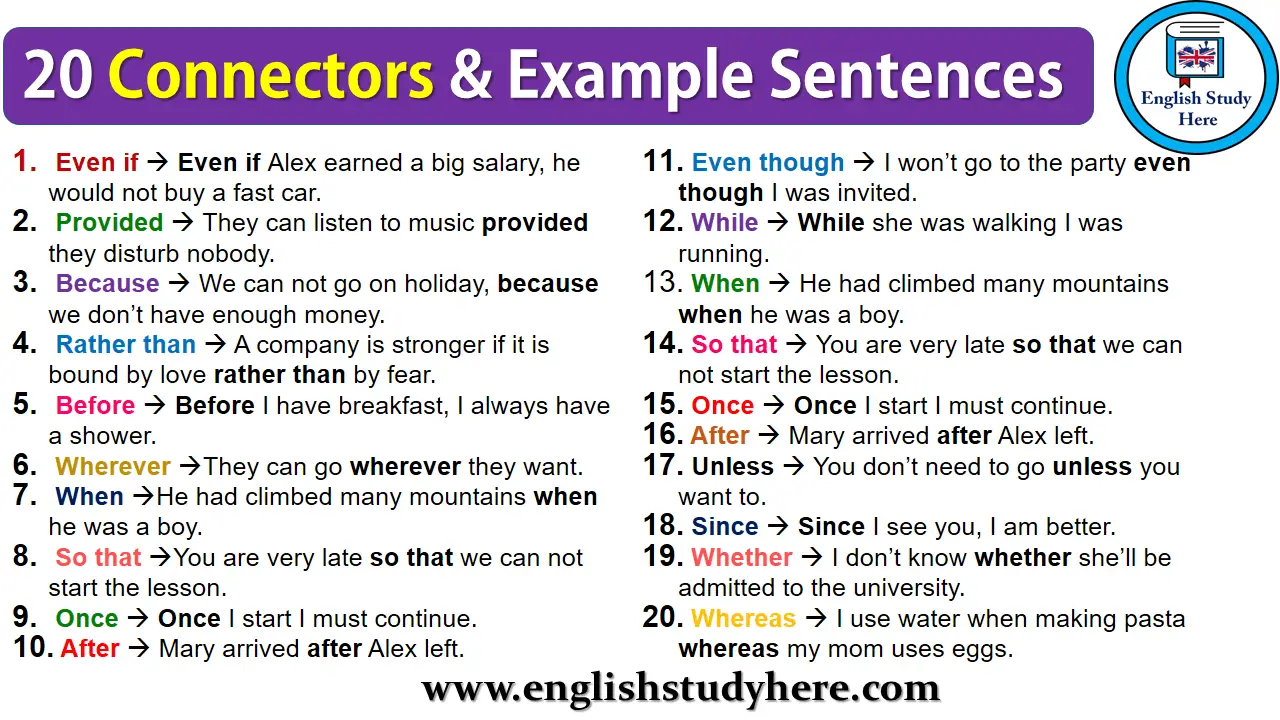
👉 SIMILARITY
1. LIKEWISE
- You can’t give your phone number to every man who asks for it. Likewise, you can’t go out with everyone who fancies you.
2. SIMILARLY
- You’re not allowed to use your phone here. Similarly, you have to switch it off when you’re in the library.
3. CORRESPONDINGLY
- She’s an excellent photographer. Correspondingly, her paintings are works of art.
4. IN THE SAME WAY
- Cutting down on sugar will help you lose weight. In the same way, doing more exercise will help you get rid of a few kilos.
- I want to talk to Prince Harry when I’m in England. Also, I want to meet his sister-in-law.
Read more: Difference between COMPARED TO and COMPARED WITH
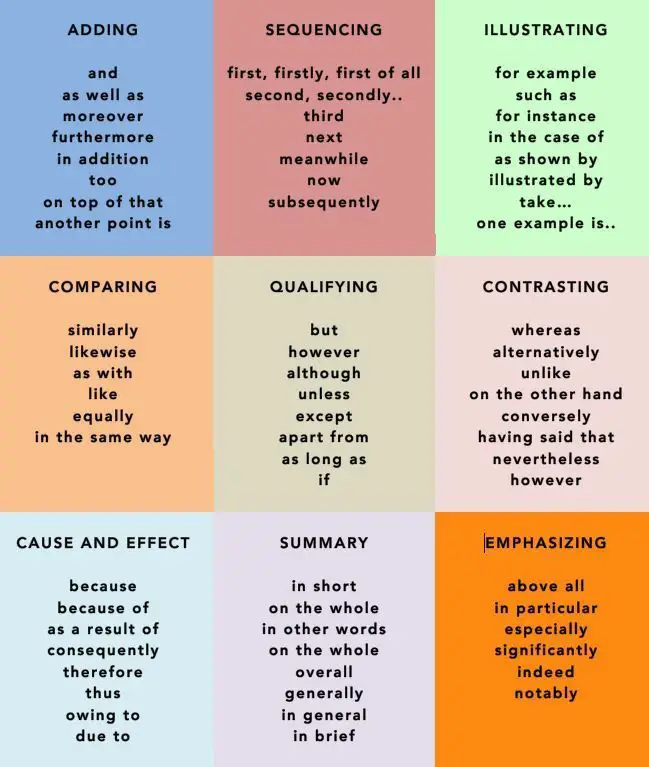
1. AS A RESULT
- I’ve done a pranic healing course. As a result, I’ve been able to cure my neighbour’s sick cat.
2. AS A CONSEQUENCE
- Zack has skipped school on many occasions. As a consequence, he’s failed his French test.
3. THEREFORE
- We’re going to experience some meteor showers in the next few days. Therefore, the number of miraculous self-healings will rise.
- You didn’t tell me you wanted to come. Thus, we won’t be taking you with us.
5. ACCORDINGLY
- Plenty of tourists visit the area in summer. Accordingly, selling hand-made objects is the main source of income for locals.
Read more: 6 Ways to Improve Your English Writing Skills

👉 SEQUENCING
1. FIRST, FIRSTLY, FIRST OF ALL, IN THE FIRST PLACE
- First of all, I’d like to talk about the benefits of having a pet pig.
2. TO BEGIN WITH
- To begin with, pet pigs are cleaner than dogs.
3. FOR ONE THING
- For one thing, they’re completely loyal to their owners.
4. SECOND, SECONDLY, IN THE SECOND PLACE
- Secondly, their impressive numeracy skills must be mentioned.
5. FOR ANOTHER THING
- For another thing, you might want to consider how cute they look in pyjamas.
6. THIRD, THIRDLY, IN THE THIRD PLACE
- In the third place, you can always count on your pet pig to perform some tricks for you when you’d like to impress a pretty girl.
- Also, they don’t eat much.
- Besides not eating much, they won’t ever chew on your electric cords.
9. IN ADDITION
- In addition, they can be taught to feed themselves if you allow them access to your pantry.
10. FURTHERMORE
- Furthermore, they make wonderful walking buddies.
11. MOREOVER
- Moreover, they’ll show you the way home when you’re drunk.
12. FINALLY
- Finally, pet pigs are fantastic guards. No burglar would ever have the heart to hurt a pet pig.
13. LAST, LASTLY, LAST OF ALL
- Lastly, your reputation as an eccentric will rapidly grow in the neighbourhood if you’re seen walking a pet pig on a leash every morning.
Read more: 18 Powerful Websites to Improve Your Writing Skills in English
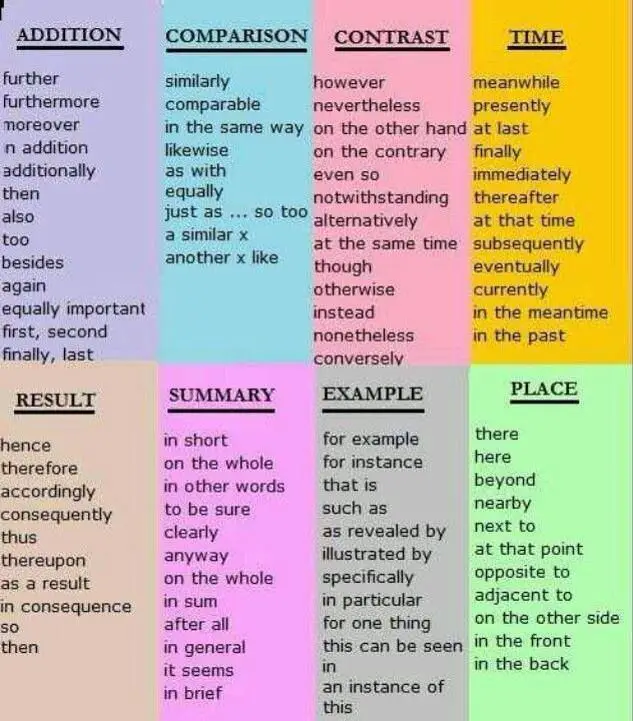
👉 ORDER OF IMPORTANCE
1. MOST IMPORTANTLY
- I’d like to talk to you about how to keep calm at your workplace. Most importantly, never go to the canteen while your boss is there.
2. PRIMARILY
- You’ll have to focus on your immediate surroundings. Primarily, on your computer screen.
3. ABOVE ALL
- Above all, don’t ever look up from your notes when people are around.
4. MOST SIGNIFICANTLY
- Most significantly, avoid eye-contact at all costs.
5. ESSENTIALLY, BASICALLY (usually spoken)
- How can I put this? Essentially, having an affair with one of your colleagues should be the last thing on your mind.
Read more: 7 Special Apps To Quickly Improve Your Typing Speed
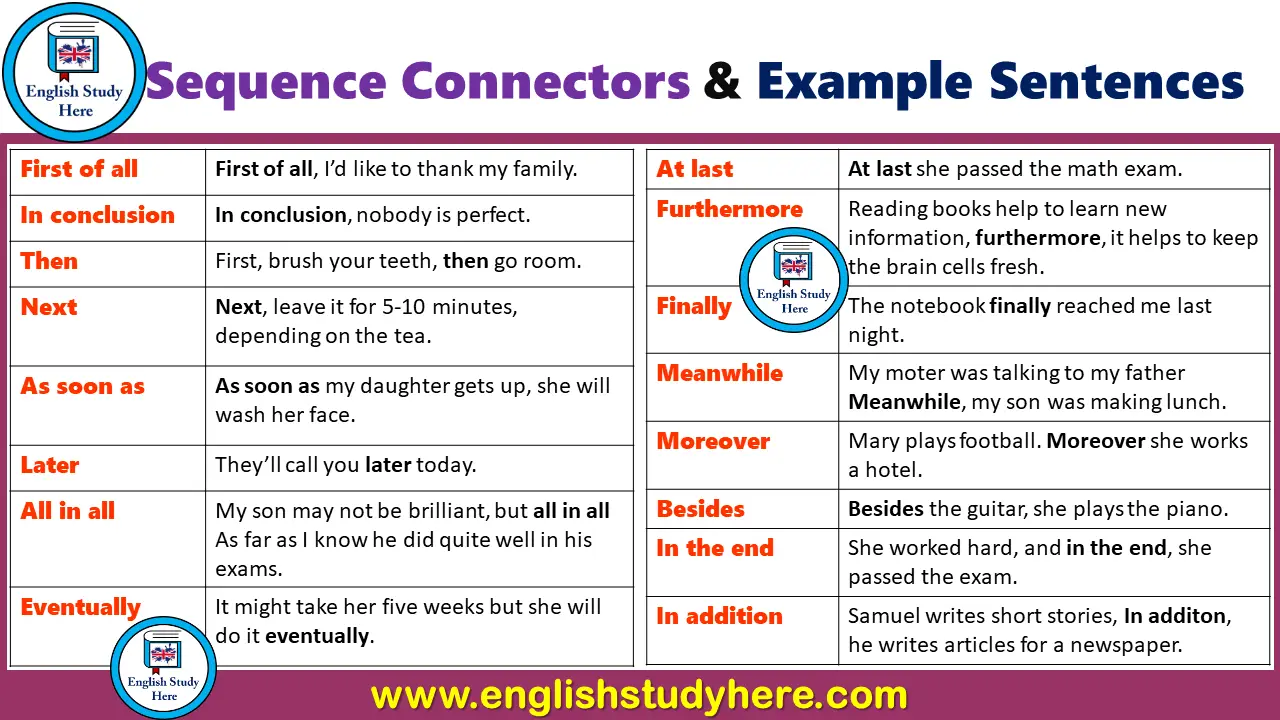
👉 PARTICULARIZATION
1. IN PARTICULAR, PARTICULARLY
- Nearly a third of marriages end in divorce. In particular, it’s middle-aged couples that yearn for much more from life.
2. MORE SPECIFICALLY
- Couples tend to argue about financial issues. More specifically, they argue when one of them is out of work.
Read more: How Many Types of Expressions there are in English?
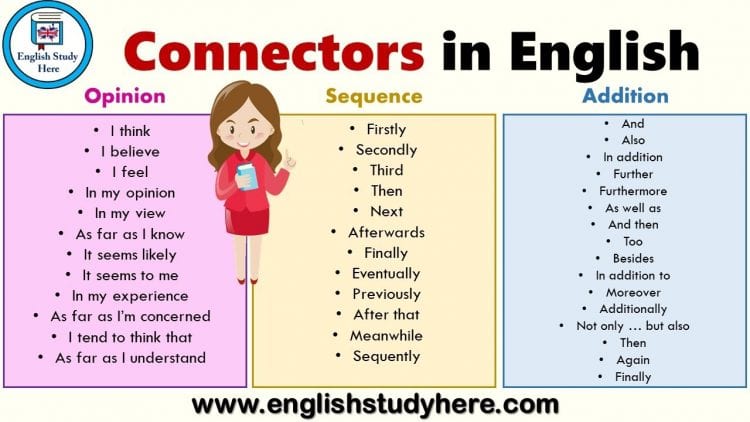
👉 EXAMPLIFICATION
1. FOR EXAMPLE
- To solve this problem, you might want to try making small gestures. For example, making your spouse’s favourite meal for dinner or giving him a massage after a tiring day.
2. FOR INSTANCE
- Appreciate the small things your spouse does for you. For instance, leave thank-you notes for them every now and then.
3. TO ILLUSTRATE
- Misunderstandings can be highly destructive. To illustrate, if your spouse sees you with a friend of the opposite sex in a café, he might not understand why he hasn’t been invited and demand an explanation.
Read more: Other ways to say for example?
👉 EXPLANATION
1. THAT IS TO SAY, THAT IS
- Keep romance alive. That is to say, don’t let your lovelife fall into routine.
- I have a very good reason for not trusting my ex. Namely, he’s a convicted felon.
3. IN OTHER WORDS
- Don’t be unsociable. In other words, go out and make some friends.
4. PUT DIFFERENTLY
- John has managed to get over Jane. Put differently, he’s started seeing other women.
Read more: 10 Common English Expressions with Explanation (Video)
👉 EMPHASISING
1. AS A MATTER OF FACT
- I love sleeping with my pet pig. As a matter of fact, I can’t fall asleep unless he’s in my bed.
- I told them not to invite Rachel to the party. In fact, I was the only person who saw what a party pooper she really was.
3. ACTUALLY
- I think it would be a good idea to send her some flowers. Actually, you should get her a hundred orchids.
- He may be the best-dressed man around. Indeed, he has a really good taste in fashion.
Read more: Essential Academic Writing Examples and Phrases!
👉 FOCUSING AND LINKING
1. AS FOR (often suggests disinterest or dislike)
- I’m going to Janet’s party at the weekend. As for Mary’s, I think I’ll pass.
2. WITH RESPECT TO
- Starting your own IT company may be the one of the best things you can do right now. With respect to opening a pet shop, it’s hard to say the same thing.
3. REGARDING
- Start your day with making the most important phone calls. Regarding emails, you might put them off until later.
4. WITH REGARD TO
- With regard to handling complaints, you might want to keep in mind that your customers are always right.
5. AS REGARDS
- Working from home has many advantages. As regards disadvantages, it might be difficult to keep your cat off your keyboard.
6. TALKING OF
- Talking of cats, you can’t trust them to keep you company when you need it. They’re quite selfish creatures.
7. AS FAR AS … CONCERNED
- As far as dogs are concerned, they might give you a chance to get up from your desk and get some exercise during the day.
Read more: English Grammar: Sentence Structure in English
👉 CONCLUSION
1. IN CONCLUSION
- In conclusion, it may be said that pigs make the best pets.
2. IN BRIEF
- Meeting my boss at the pub was an interesting experience. In brief, it was a disaster.
3. IN SUMMARY
- In summary, it may not be the best idea to frequent the same pubs as your boss.
4. TO SUM UP
- To sum up, some people are better suited to working from home than others.
5. ALL IN ALL
- All in all, you have to make sure both you and your customers are satisfied with your work.
Read more: What are the other ways to say in conclusion ?
👉 CORRECTION
- I thought it was a good idea to get a ferret. Rather, it had always been my dream to get one.
2. TO BE MORE PRECISE
- You might want to change a few things. To be more precise, I think you should start again from scratch.
Read more: Best English Grammar and Spelling Checkers Online
1. AT FIRST
- It wasn’t a piece of cake to learn English. At first, I couldn’t pronounce all the words correctly.
- Then, I couldn’t spell all the words correctly.
3. AFTERWARDS
- Afterwards, I had a hard time understanding the tenses.
- Later, I couldn’t memorize phrasal verbs and idioms.
5. IN THE MEANTIME
- In the meantime, I was getting some help from MyEnglishTeacher .
6. MEANWHILE
- Meanwhile, I was enjoying my skype lessons more and more.
Read more: A Visual List of 100 English IDIOMS FOR TIME with Examples
👉 DISMISSAL
(of what was said before)
- I couldn’t get my head around the Passive Voice. Anyway, I don’t think it’s important to use it all the time.
- Anyhow, I’ve just decided to learn Russian next.
3. AT ANY RATE
- At any rate, I don’t want to become a simultaneous interpreter in five languages.
Linking Words Quiz › TEST YOURSELF
- To begin with
- For one thing
- In other words
- Along those lines
- On the other hand
- All the same
- Firstly / Secondly
- Soon / After
- Now / Later
- Before / After
- As for / treated
- However / asked
- As far as / concerned
- As far as / thinking
- On the other side
- Despite this
- Another / like
- Just as / so too
- Likewise / equally
- In the back
- On top of that
- Subsequently
- Nevertheless
- In particular
- Furthermore
- Accordingly
- As a result
- In contrast
- At any rate
👉 Connectors Synonyms
Connectors are not only used in grammar . Connectors are things that are used to connect or tether two, or more, things together. There are many different synonyms for connectors:
- Bond, coupling, joint, link, adapter, clamp, fastener, junction, tie, terminal, plug, fitting, splicing, fastener, sleeve, etc.
👉 Sentence Definition
A sentence is a set of words that forms a coherent and complete thought and message. This means that a sentence says something concrete. It has to be structured and logical in order for the sentence to be correct.
Sentences are made up of various parts , such as: nouns, verbs, adjectives, pronouns, articles, etc. Within a sentence, there are parts that relate the thought and message , such as: subject, predicate, object, phrase, punctuation, etc. Each of these parts is important for a sentence to be complete.
Through sentences we tell other people what we think, feel, or what we want to do . In order to relate those thoughts we string together words into groups. These finally relate our message to other people and the world.
There are four different types of sentences , and each has its own specific goal and structure. These types are: declarative, imperative, interrogative, and exclamatory.
RELATED ARTICLES MORE FROM AUTHOR

Complex Sentences and Compound Complex Sentences in English

50+ Best Online Quiz Makers for You!

Examples of Silent Letter L

Find the Perfect Film for your Mood with our “What Movie Should I Watch” Quiz!
![Spot Parts of Speech [Grammar Quiz] parts of speech quiz](https://www.myenglishteacher.eu/blog/wp-content/uploads/2023/01/parts-of-speech-quiz-218x150.jpeg)
Spot Parts of Speech [Grammar Quiz]
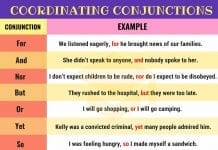
FANBOYS GRAMMAR 😃🥳😜 7 Coordinating Conjunctions with Examples

One of the best posts I’ve ever read here. Congrats!!
It’s awesome so useful and practical thanks a million. I’m gonna share it with my friends.

I liked it so much. Thank you Mr/Mrs tutor.

Indeed, it refreshing our vocabulary

Thank you very much!! This must be by far one of the greatest post I’ve seen to improve my writing skills and expand the vocabulary of connectors. Therefore 😉 , I will add to my list of resources and share with my friends
So glad! 😃❤️

Thanks a ton, teacher!
Sure, anytime!

Thankyou soo muchhh for this usefull info..

Thank you so much for this useful

Excellent exercise
My great thanks
It is highly appreciated

Thanks a lot
you are welcome!

Helpful post! You have nicely divided all the connectors in group like result, time, explanation, conclusion …. and present them with accurate examples. Everything is easy to grab. Thanks for sharing this rare post.
Thank you so much Mohan! I’m glad you loved it!

Thanks for this usefull lessons. They are highly educattive.
Thank you so much!

So far this is the best post I’ve ever seen. I find it hard to use those connectors in statements. I can speak basic English and sometimes not concise with my statements because I’m not good in using connectors in English. Thank you for this great post. It will help a lot of speakers to become articulate with the language.
Thank you so much Oscar for your feedback!

Thanks millions for posting the tables of connecting sentences. Have a great life

I love this array of connectors. Great selections to fit our lesson. Thank you to all who are part of this website and contributors. God bless you all!
Thank you so much Mica.

Linker words, also known as sentence connectors, play a crucial role in connecting phrases, sentences, and paragraphs for enhanced coherence in writing. In terms of contrast, words like “however,” “in contrast,” and “nevertheless” emphasize opposing ideas. For expressing similarity, “likewise,” “similarly,” and “correspondingly” are effective. Result-oriented connectors include “as a result,” “therefore,” and “accordingly,” signaling outcomes or consequences. These words help create a logical flow within text, ensuring a smooth transition between ideas. Whether highlighting differences, similarities, or results, these connectors contribute to cohesive and well-structured writing, facilitating the comprehension of complex information.

Its very useful , thank you.
Thank you so much Himali!
MOST POPULAR

👉 A BIG List of Prefixes and Suffixes and Their Meanings

200 Phrases for saying THANK YOU in any situation!

Formal and Informal Email Phrases – from Greetings to Closing Phrases!

80 In Conclusion Examples! + Translation

90 Names of Baby Animals and Their Parents
![Types of Adverb 🦠 Adverb Examples [All You Need] adverbs](https://www.myenglishteacher.eu/blog/wp-content/uploads/2018/07/adverbs-100x70.jpg)
Types of Adverb 🦠 Adverb Examples [All You Need]

Talk to Strangers / Free Chat Rooms

English Level Test

6 Ways to Immediately Improve Your English Communication Skills

50 Creative Ways to Say Happy Birthday: My Top Picks

What does TBH mean? (TBH full form) on Facebook, Instagram, Texting

25 Ways to Say “Keep Up The Good Work” 💪 &...
Stay connected, editor picks.

Supposition Meaning

Summary of how Components of Health are related to Wellness

Understanding the Extroverted Introvert
Popular posts, popular category.
- Q&A 2439
- English Vocabulary 624
- English Vocabulary Dictionary 363
- English Grammar 200
- Synonyms 147
- Infographics 109
- Collocations 105
- Learn English 81
- English Idioms 69
- Privacy Policy
- Terms & Conditions
Welcome Guest!
- IELTS Listening
- IELTS Reading
- IELTS Writing
- IELTS Writing Task 1
- IELTS Writing Task 2
- IELTS Speaking
- IELTS Speaking Part 1
- IELTS Speaking Part 2
- IELTS Speaking Part 3
- IELTS Practice Tests
- IELTS Listening Practice Tests
- IELTS Reading Practice Tests
- IELTS Writing Practice Tests
- IELTS Speaking Practice Tests
- All Courses
- IELTS Online Classes
- OET Online Classes
- PTE Online Classes
- CELPIP Online Classes
- Free Live Classes
- Australia PR
- Germany Job Seeker Visa
- Austria Job Seeker Visa
- Sweden Job Seeker Visa
- Study Abroad
- Student Testimonials
- Our Trainers
- IELTS Webinar
- Immigration Webinar
Connectors / Linking Words for Writing – Functions and Tips
Updated On Sep 15, 2023

Share on Whatsapp
Share on Email
Share on Linkedin

Effective IELTS Essay Connectors for Writing Task 2 & Task 1
Linking words or connectors are the adverbs that turn out to be the easiest way to connect ideas or sentences with one unique word. Such linking words or connectors make the entire sentence look appealing. In IELTS, if you use the connesctors appropriately, it will showcase your advanced English communication skills.
So, in any way, if you find yourself stuck with handling these linking words or connectors, here are a few tips that will help you out.
How do Linking Words or Connectors Function?
Jotted down below are a few reasons why you should be using linking words or connectors in your IELTS writing tasks:
- They make your writing clear and appealing.
- You get to provide meaning to otherwise complex sentences.
- They help readers understand how one sentence is related to the other.
- They help to know the purpose of the question and also give an appropriate answer to the question.
Tips to Use Linking words or Connectors
Here are a few tips that you can keep in mind when using linking words or connectors:
Are you being accurate with your choice of words?
There are a lot of linking words that can be used in a sentence, so you need to be careful while using the linking words and use them accurately.
Are you overusing linking words or connectors?
The linking words can be used once or twice in the sentence. Making overuse of the linking words in the sentence makes the sentence meaningless.
Are you mixing up?
Try to use a lot of linking words in the paragraph, but make sure the sentence is meaningful while using these words. Using a single word many times in a paragraph doesn’t make any sense. So while using the linking words, use them wisely.
Common Linking words and Connectors used in IELTS Writing
When writing an essay or a report in an IELTS exam, there are plenty of linking words or connectors used throughout. You can take ideas from the ones mentioned below:
Also check :
- IELTS Writing tips
- IELTS Writing recent actual test
- IELTS Writing Answer sheet
- IELTS Writing Practice tests
Frequently Asked Questions
Why are connectors important in writing?
Name some of the common connectors used in IELTS Writing?
What are some linking words expressing differences or contrasts?
Mention some linking words that can be used to express a finale or summarization
Where do you use connectors or linking words in IELTS writing?
Explore IELTS Writing

Proven tips to score Band 9 in IELTS Writing
Janet had been an IELTS Trainer before she dived into the field of Content Writing. During her days of being a Trainer, Janet had written essays and sample answers which got her students an 8+ band in the IELTS Test. Her contributions to our articles have been engaging and simple to help the students understand and grasp the information with ease. Janet, born and brought up in California, had no idea about the IELTS until she moved to study in Canada. Her peers leaned to her for help as her first language was English.
Explore other Writing Articles
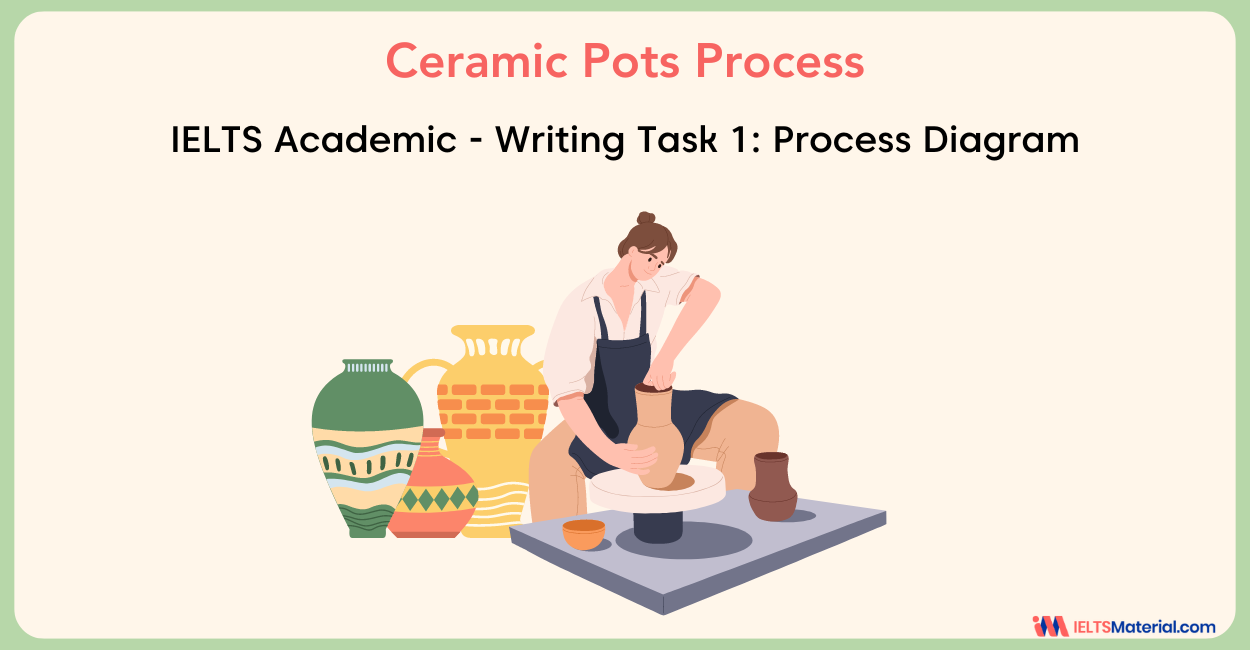
Akanksha Tripathi
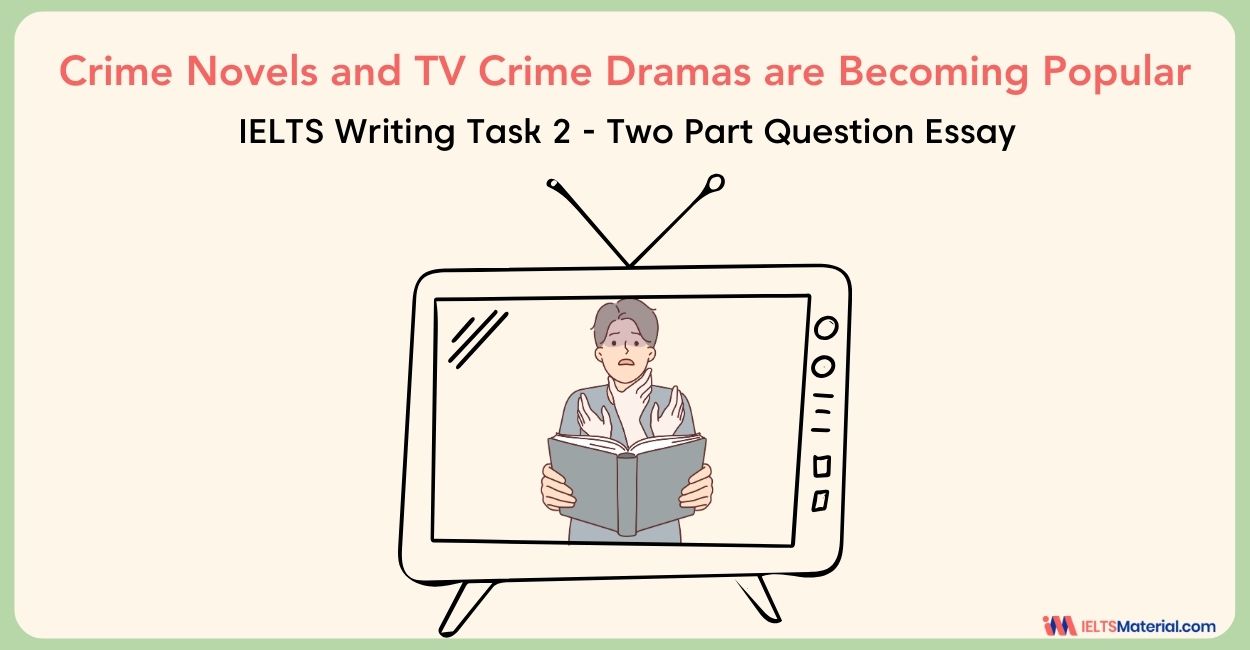
Kasturika Samanta
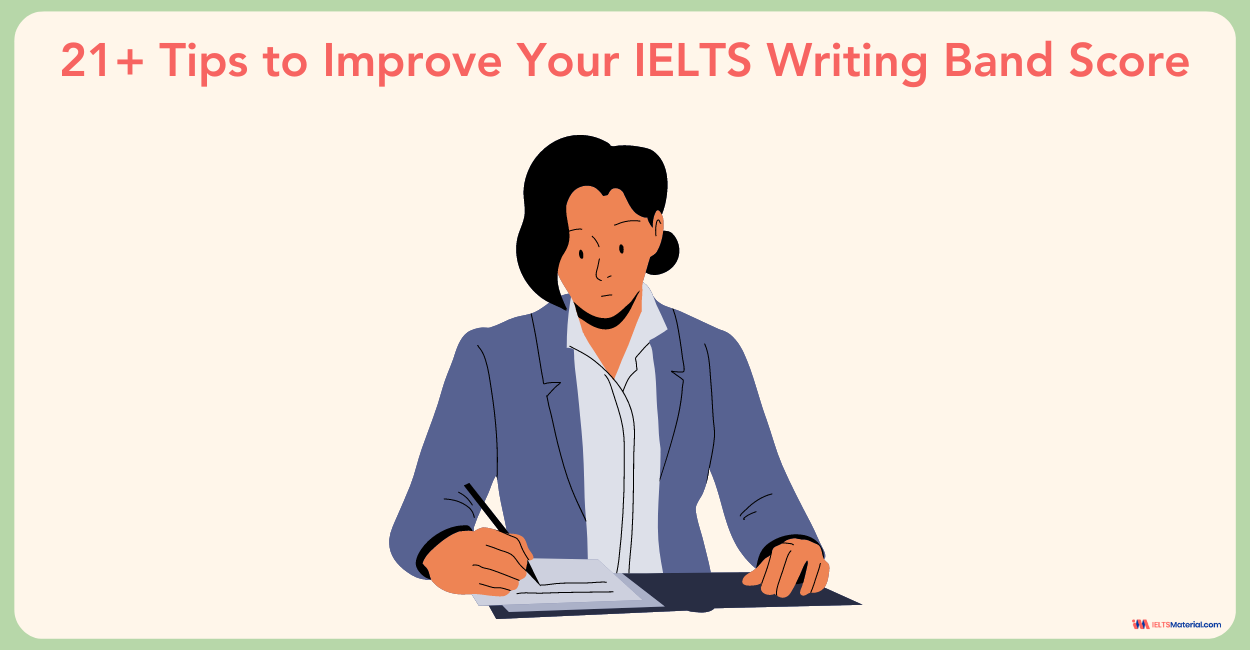
Raajdeep Saha
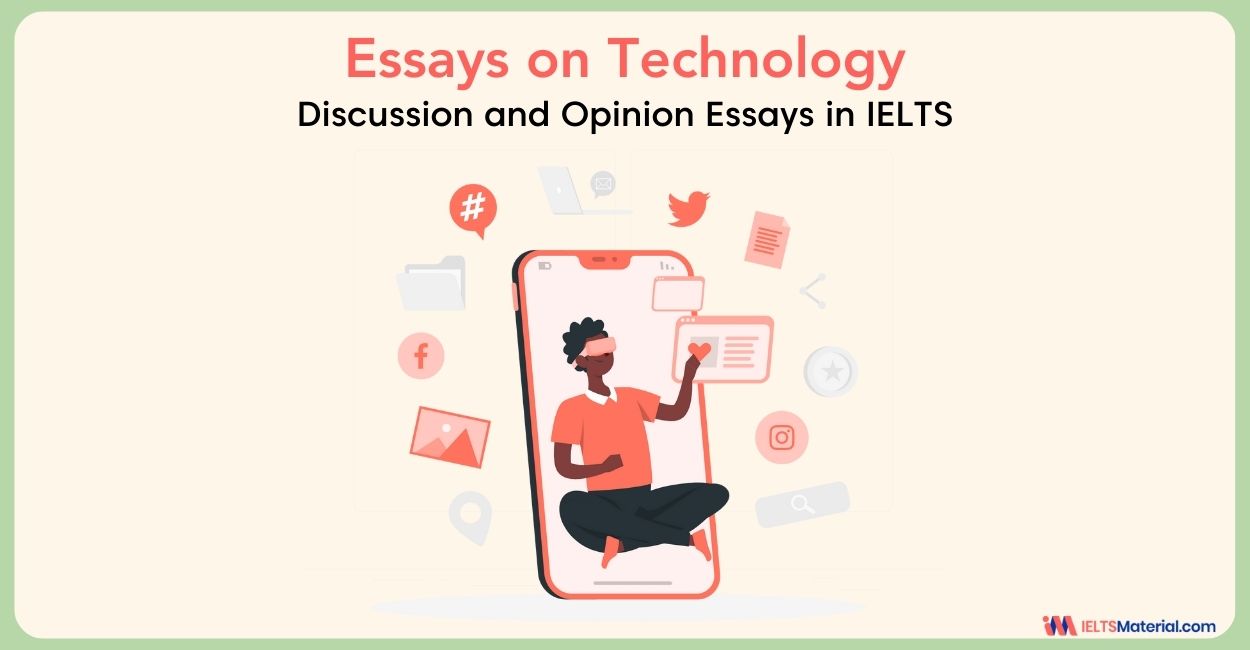
Post your Comments
Recent articles.
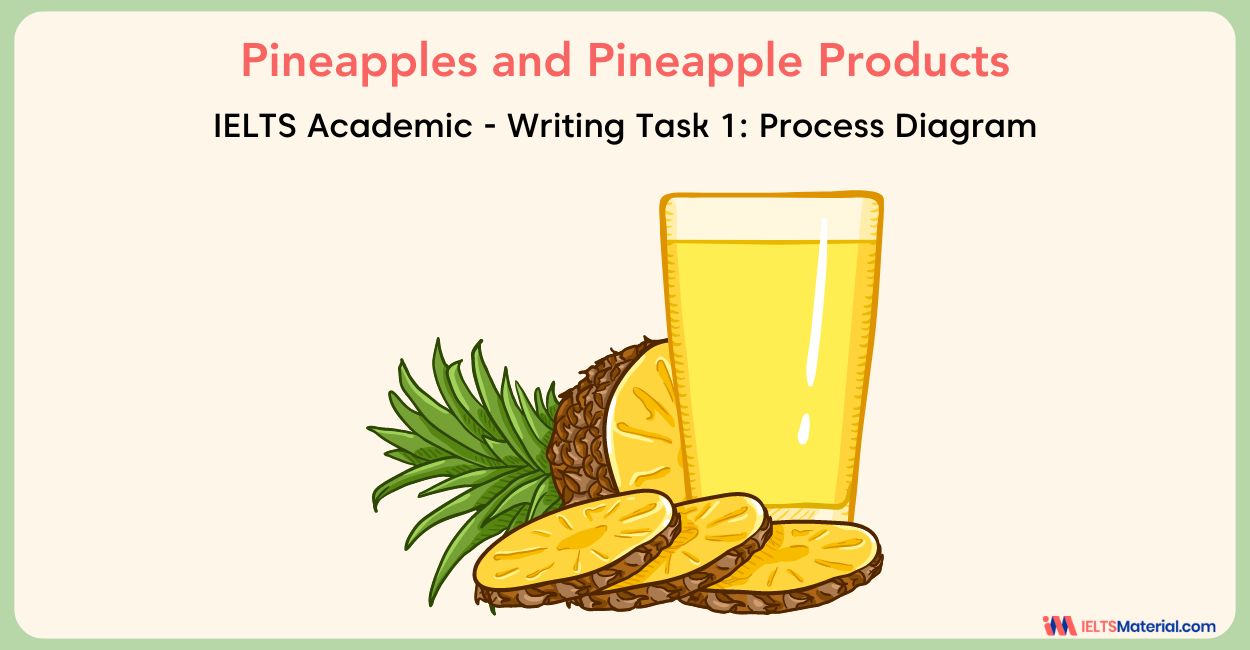
Our Offices
Gurgaon city scape, gurgaon bptp.
Step 1 of 3
Great going .
Get a free session from trainer
Have you taken test before?
Please select any option
Get free eBook to excel in test
Please enter Email ID
Get support from an Band 9 trainer
Please enter phone number
Already Registered?
Select a date
Please select a date
Select a time (IST Time Zone)
Please select a time
Mark Your Calendar: Free Session with Expert on
Which exam are you preparing?
Great Going!
ELT Learning Journeys
Blog pearson elt spain and portugal.

Using connectors in English to improve your writing skills

The most common connectors, and the ones used most frequently in speech, are and , but , or , because , so and then , and with them you can express most ideas quite well. However, in order to demonstrate a more sophisticated knowledge of the language and to express more nuanced ideas, especially in formal writing, there are many other connectors that you need in your repertoire. Let’s have a look at some of them.
CONNECTORS IN ENGLISH:
***Connectors that add information or strengthen an assertion***
in addition to : In addition to numerous seminars and workshops, conference participants will also be able to attend the screenings of several documentaries.
moreover : The new software is cheap and easy to use; moreover , it’s compatible with most operating systems.
furthermore : Candidates caught cheating will be asked to leave the exam hall immediately. Furthermore , they will be banned from taking the exam in the future.
***Connectors that weaken an assertion**
mind you (informal): John’s one of the friendliest people I know. Mind you , he can be a bit shy when you first meet him.
having said that : The city centre is generally very safe for tourists. Having said that, visitors should keep an eye on their belongings while travelling on public transport.
***Connectors that show a contrast between ideas***
however : Mike didn’t think he had studied enough to pass the exam. I n the end, however , he passed it with flying colours.
although : Simon has a credit card, although he very rarely uses it.
even though : Even though you’ve studied this grammar before, it’s still a good idea to review it from time to time.
nevertheless/nonetheless : A lot of improvements have been made to internet security over recent years. Nevertheless , stories of hacked accounts and stolen identities are still worryingly common.
even so : Jack was concerned he might not be fit enough to climb the mountain. Even so , he went ahead and climbed it anyway.
despite : Despite being turned down at first by dozens of publishers, J. K. Rowling finally went on to become one of the most successful writers of our era.
in spite of : The match went ahead in spite of the rain .
whereas : It used to be expensive to travel by plane between different European cities, whereas these days it is often much cheaper than taking the train.
(On the one hand) … on the other hand… (This shows a balanced contrast of ideas): ( On the one hand, ) I would like to earn more money. On the other hand , I don’t really want to work longer hours.
***Connectors that show the cause of something***
because of : Joe was finally expelled from school because of his ongoing bad behaviour.
owing to : Owing to low ticket sales, several shows have been cancelled.
due to : The school has reported improved student engagement due to the increased use of interactive technology in the classroom.
***Connectors that show the result of something***
consequently : The cost of living has risen tremendously in recent years. Consequently , more families than ever are struggling to survive.
therefore : Student numbers have been steadily increasing over the last few years. Therefore , the college has decided to move to larger premises.
as a result : The company was making considerable losses. As a result, nearly a third of staff had to be made redundant.
***Connectors that show the reason for something***
in order to : The police have installed security cameras in the town centre in order to help reduce crime.
so that : I started using the cloud so that I could access my files from anywhere.
so as to : The government is relaxing visa regulations so as to make it easier for overseas students to study here .

You might also be interested in…
– 35 common English proverbs
– 21 unusual English expressions from around the world
– 30 useful English idioms and expressions
– 10 unusual expressions in English and where they come from
– 50 of the most useful English abbreviations and acronyms
– 20 words and phrases English owes to Shakespeare
Don’t forget to sign up to our ELT blog . You’ll find lots of great stuff to read here!
More info at ELT Spain & Portugal

Get our best posts directly in your inbox
Subscribe to our blog, share this:.

One thought on “ Using connectors in English to improve your writing skills ”
Pingback: 10 best practices for tackling English language exams
Leave a Reply Cancel reply
Subscribe to.
Your Privacy is protected.

ABA Journal The digital English academy

How to use paragraph connectors in English
What are connectors in English used for? Connectors or linkers can help you join two or more ideas (sentences), allowing you to have a more structured and harmonious delivery. Instead of using single sentences, you can connect them in a logical way.
In this article, you’ll learn about different types of connectors in English (contrast, cause, purpose, effect, addition, illustration, etc.) that will help you achieve optimal communication.
This type of connector is used to create continuity in the text between two clauses that present contradictory ideas.
Also known as causative connectors, these are used to explain the reason behind something.
Enjoy our lessons from the comfort of your mobile phone, tablet, or laptop by downloading the ABA English app, in which you’ll find hundreds of lessons to improve your English level.
Everything we do has a consequence. In the previous category, we discussed what causes something to happen, in this case, we’re talking about the effect or result of an action.
You can use the purpose connectors when you want to express the intention behind an action or decision.
Click To Tweet
These are used when you want to expand an idea by adding arguments.
Connectors to give examples
We use illustration connectors to clarify an idea by using examples.
Opinion connectors
You can start the sentence with these connectors when you want to express your point of view.
Explanatory connectors
These connectors can be used to give more details about the idea being developed.
To establish a sequence
These connectors allow us to describe ideas in a sequential and organised manner.
Do you like learning about connectors in English? Follow our blog and discover how to use correlative conjunctions and many other connectors, too.
If you want to perfect your English even more, you can sign up for our online English course. It offers hundreds of short films and fun lessons, so that you can learn to speak like a true native.
Related Articles

Vegetables in English: vocabulary about greens and produce
July 7, 2022

Most-used words for everyday objects in English
April 1, 2022

February 28, 2022
One comment
Thank you for this topic.
It’s very useful and interesting.
Leave a Reply Cancel reply
Your email address will not be published. Required fields are marked *
Notify me of follow-up comments by email.
Notify me of new posts by email.

Essay Connectors in English and Examples
In this useful lesson, we’re going to explore some magic keys that help link your ideas together in English: essay connectors! Think of these connectors as bridges that help your thoughts flow smoothly from one to the next, making your stories and explanations easier to follow.
Whether you’re just starting your English learning journey or looking to polish your skills, these connectors will be your best friends in writing and speaking more clearly. So, get ready to add some sparkle to your English with these handy tools!
Table of Contents
What are Connectors in an Essay?
Connectors are words or phrases that join two or more sentences together. They can be used to create smooth, logical sentences. In this blog post, we’ll take a look at some of the most common connectors in English and give you some examples of how to use them.
They are also called linking words or linking phrases.
Why use Connectors in an Essay?
Connector words and phrases help to create a smooth, logical flow of ideas in your essay. They make your writing easier to read and understand.
List of Essay Connectors in Detail
It is always a good idea to start your essay with a strong sentence. One way to do this is to use a result connector. A result connector shows the outcome or consequence of something. Here are some examples:
- Consequently, we won’t be able to go on the trip.
- As a result, I got a bad grade on my test.
2) Contrast
Contrast connectors show the difference between two things. Here are some examples:
- However, I don’t think that’s a good idea.
- On the other hand, I believe that we should proceed with caution.
Time connectors express when something happens or how long it lasts. Here are some examples:
- Meanwhile, I’ll be waiting for your call.
- Since then, she’s been avoiding me.
4) Condition
Condition connectors are words or phrases that show a condition or requirement. Here are some examples:
Unless you study hard, you’ll never pass the test.
If it starts to rain, we’ll have to go inside.
5) Addition
Addition connectors express addition or increase. Here are some examples:
furthermore, moreover, and in addition.
- In addition, I think we should try a different approach.
- Furthermore, I don’t think this is a good idea at all.
6) Cause and Effect
Cause and effect connectors express the relationship between two things. They show how one thing caused another thing to happen. Here are some examples:
- The sound of the thunder caused her to scream.
- He didn’t study for the test, so he failed.
7) Location
Location connectors express where something takes place. Here are some examples:
- The meeting will be held in the conference room.
- She always sleeps in her bed.
Purpose connectors express the reason why something is done. They show the purpose of an action or event. Here are some examples:
- I’m studying English to improve my language skills.
- He was late for class because he lost his bus ticket.
9) Comparison
Comparison connectors compare two things. They show how they are similar or different. Here are some examples:
- He’s the best basketball player I’ve ever seen.
- She runs faster than any other girl on the track team.
10) Conditionals
Conditional connectors express a hypothetical situation. They show what would happen if something were to happen. Here are some examples:
- If I had more money, I would buy a new car.
- If you studied harder, you would likely get better grades.
As you can see, there are many different types of essay connectors in English. These connectors help you create clear and logical sentences. By using them correctly, you can make your writing sound more professional and academic.
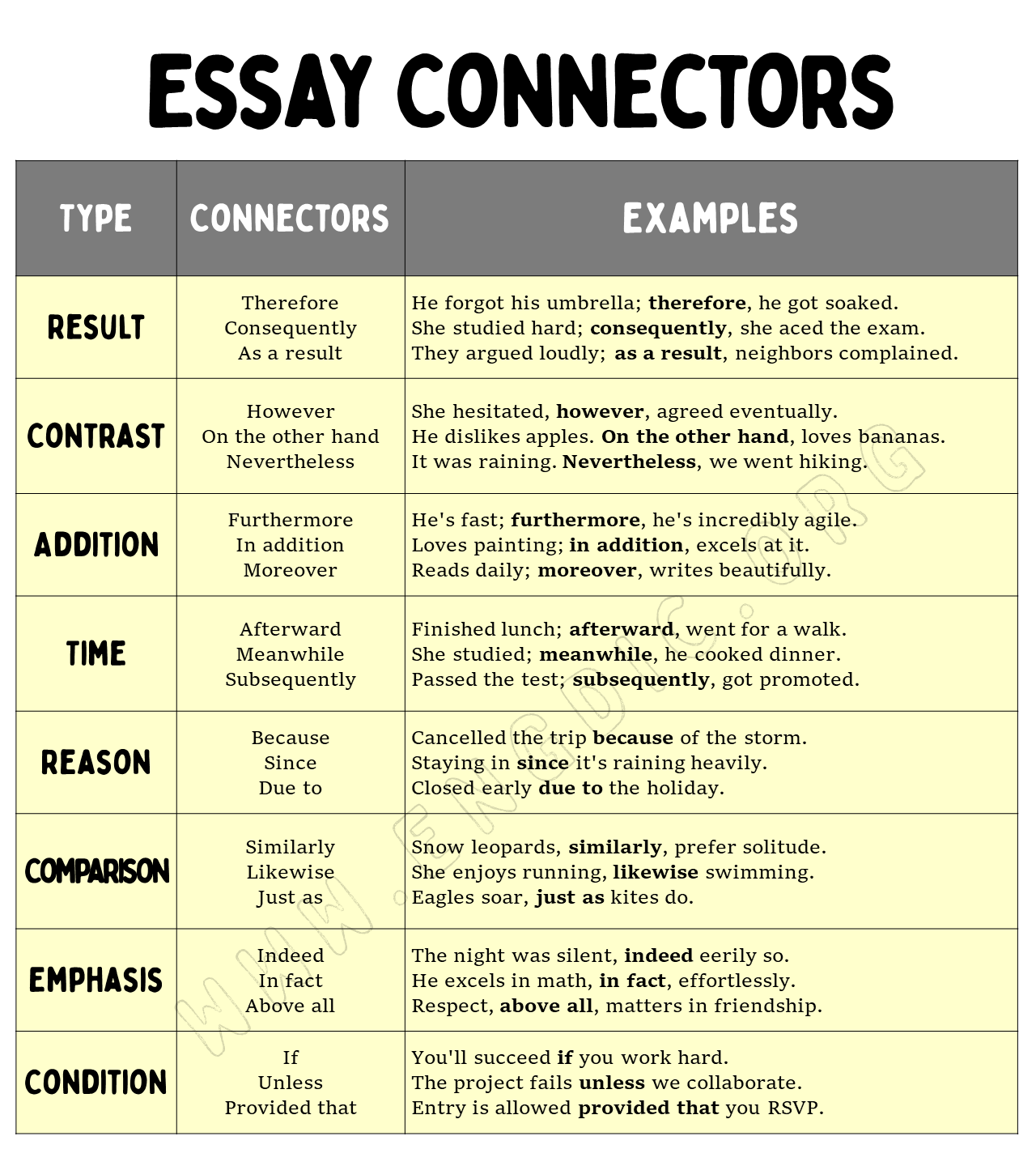
How do you use Connectors in an Essay?
Using connectors in essays requires a few steps:
- Choose the connector that best suits your needs.
- Connect the two sentences with the connector.
- Make sure the sentences are logically connected.
Here’s an example:
Result: I didn’t get a good grade on my test.
Contrast: However, I got a good score on the practice test.
The result of not studying was that I got a bad grade on my test. However, the contrast is that I did well on the practice test.
Make sure your sentences are properly connected with a connector to create a logical argument. By using connectors, you can make your writing clear and concise.
Now that you know all about essay connectors, try using them in your own writing. Practice makes perfect, so keep practicing until using connectors becomes second nature to you. Soon, you’ll be writing essays that are clear, concise, and well-organized.
- In the same way
- Of contrast
- Despite this
- In comparison
- In contrast
- Even though
Cause & Effect
- Consequently
- As a result of
- As a consequence of
- Contributes of
- Brings about
- Because of this
- For this reason
- Results from
- Is the result of
- Is the consequence of
- Is caused by
- Nevertheless
- Alternatively
- On the contrary
- In spite of
- In addition
- Furthermore
- In addition to
- Additionally
- Not only … but also
illustration
- For example
- For instance
- In other words
- An instance
- As revealed by
- To show that
- In the case of
- As an example
- For one thing
- In my opinion
- As far as I know
- It seems likely
- It seems to me
- In my experience
- I believe that
- As for me, I think
- If I am not mistaken
- What I mean is
- I’d say that
- Personally, I think
- To conclude
- In conclusion
- On the whole
- Summarizing
- Undoubtedly
Last updated on March 27th, 2024 at 03:48 pm
About The Author
Hi, I'm USMI, engdic.org's Author & Lifestyle Linguist. My decade-long journey in language and lifestyle curation fuels my passion for weaving words into everyday life. Join me in exploring the dynamic interplay between English and our diverse lifestyles. Dive into my latest insights, where language enriches every aspect of living.
- Memberships
- Institutional Members
- Teacher Members

Formal Linking Words / Cohesive Devices
Linking words can also be referred to as connectors, conjunctions, and cohesive devices. This webpage includes a useful lesson on helping improve students’ knowledge of these linking words. It includes a lesson plan using a kinaesthetic matching activity and worksheet.
Terms & Conditions of Use
Lesson: matching activity.
Cut these up and students match
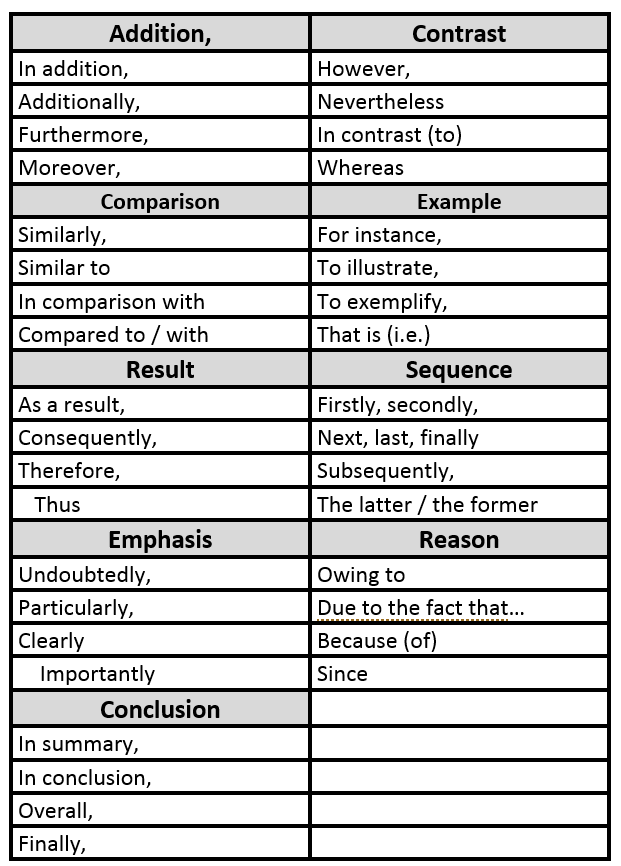
Linking Words Reference Sheet
Print off and give this to students as a helpful reference guide.
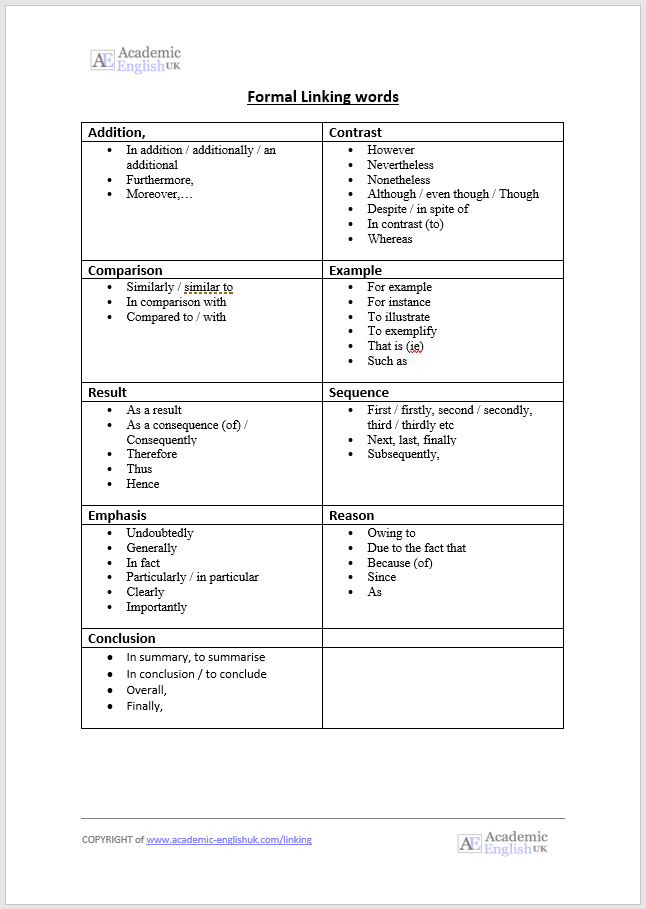
online resources
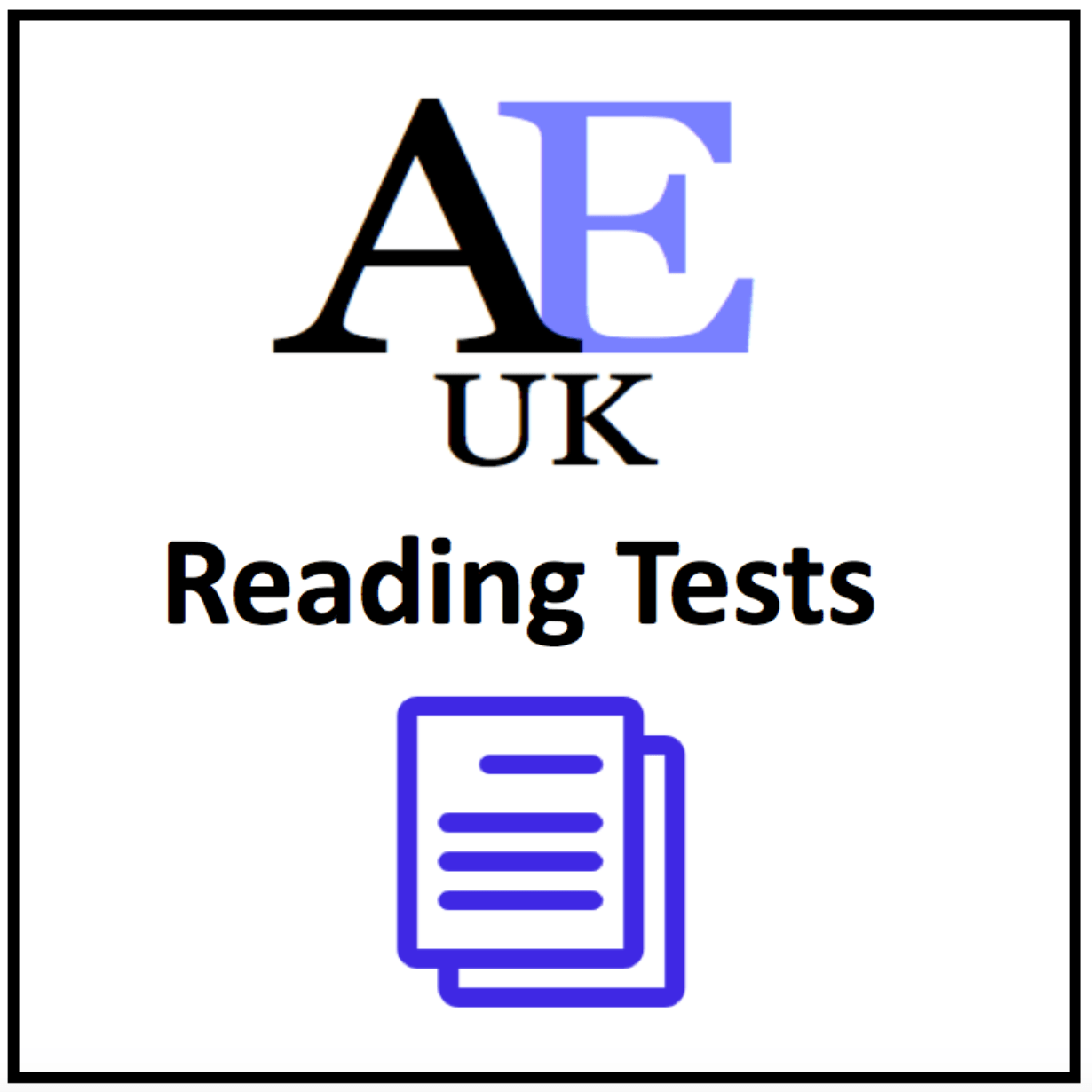

Medical English
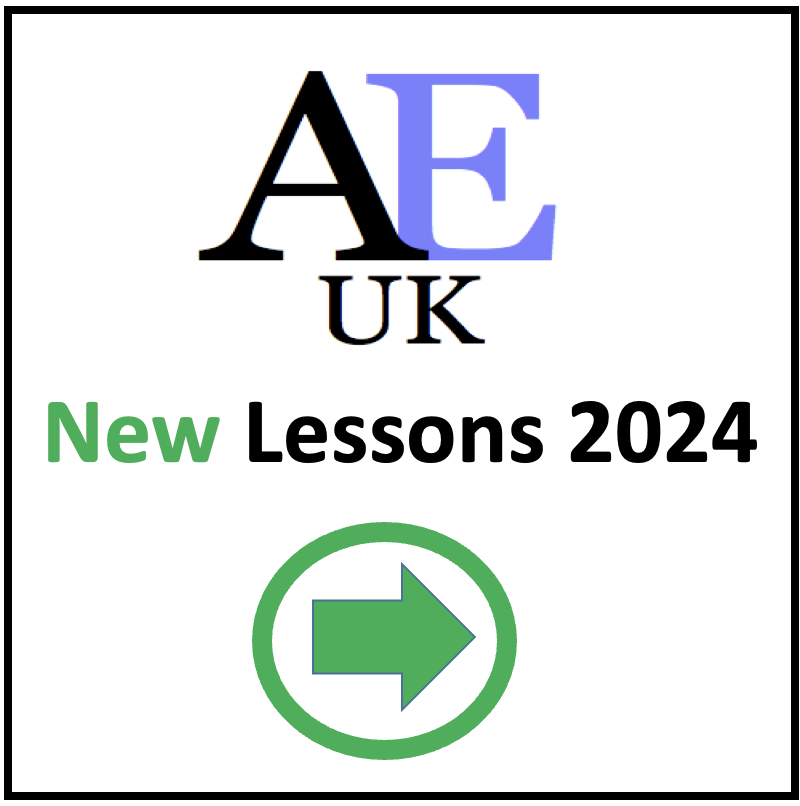
New for 2024

DropBox Files
Members only
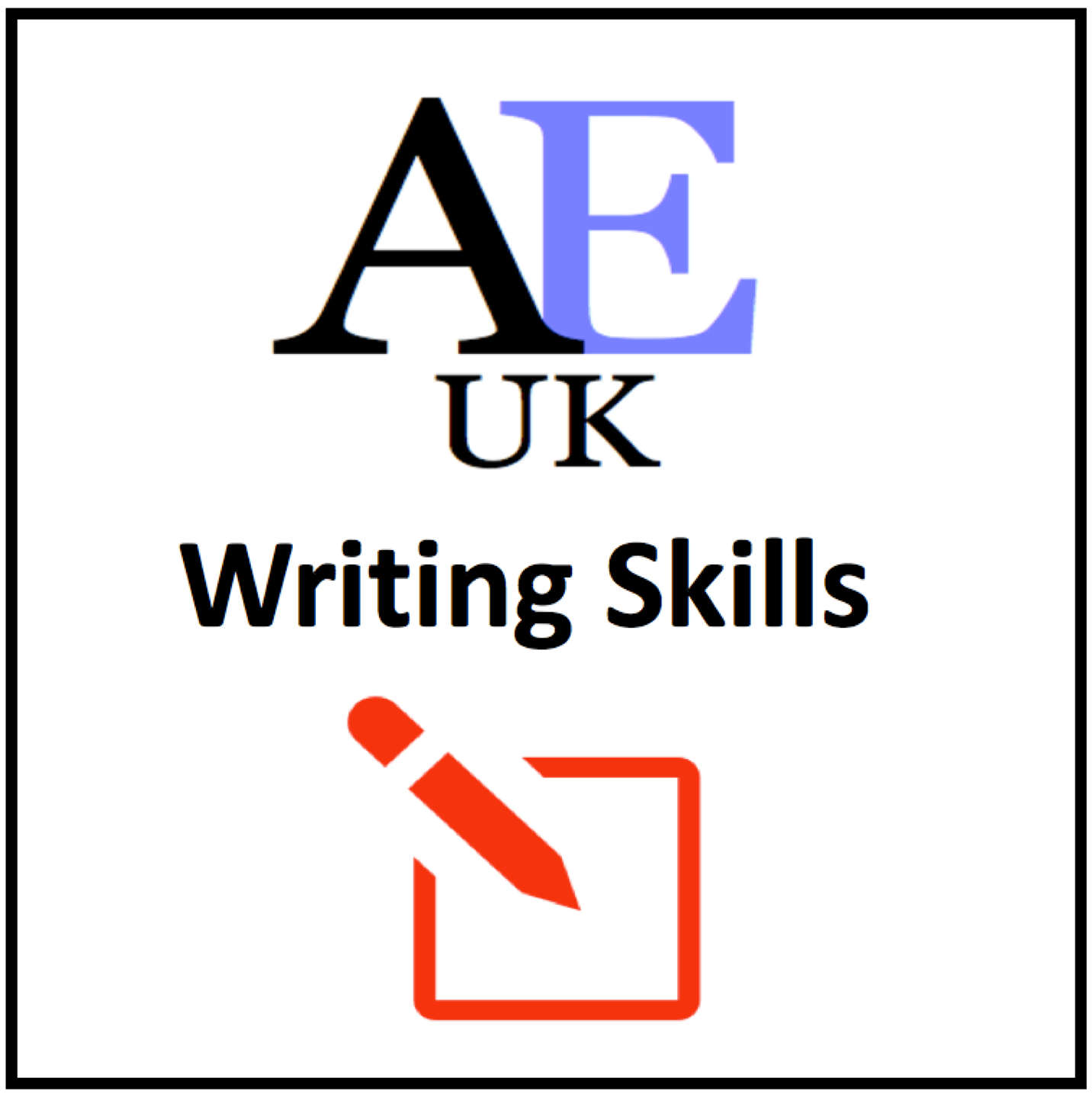
Instant Lessons
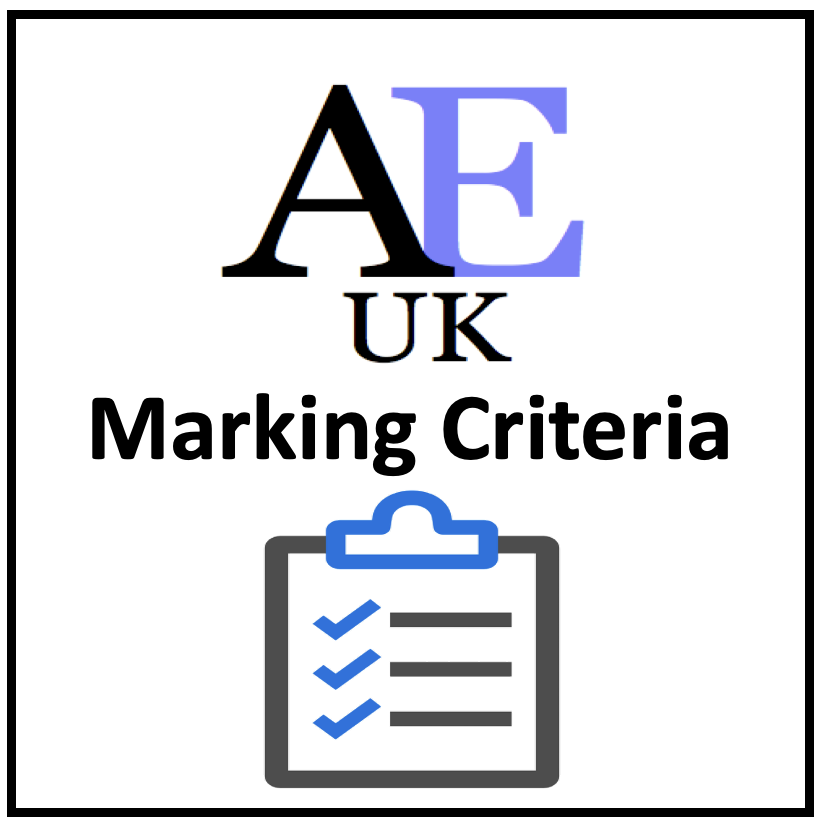
OneDrive Files

Topic-lessons
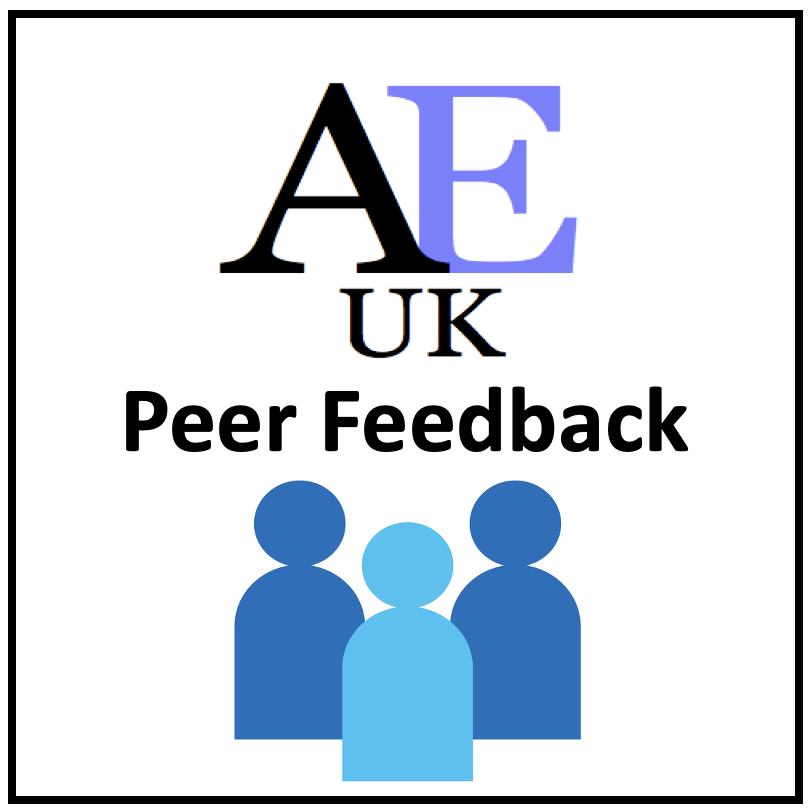
Feedback Forms
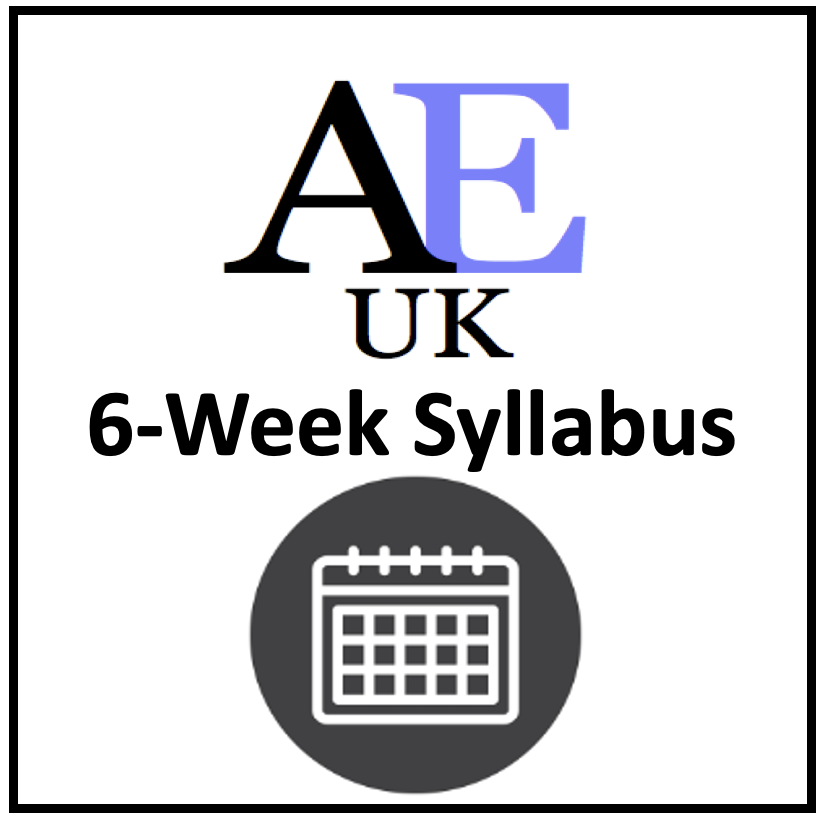
6-Week Course
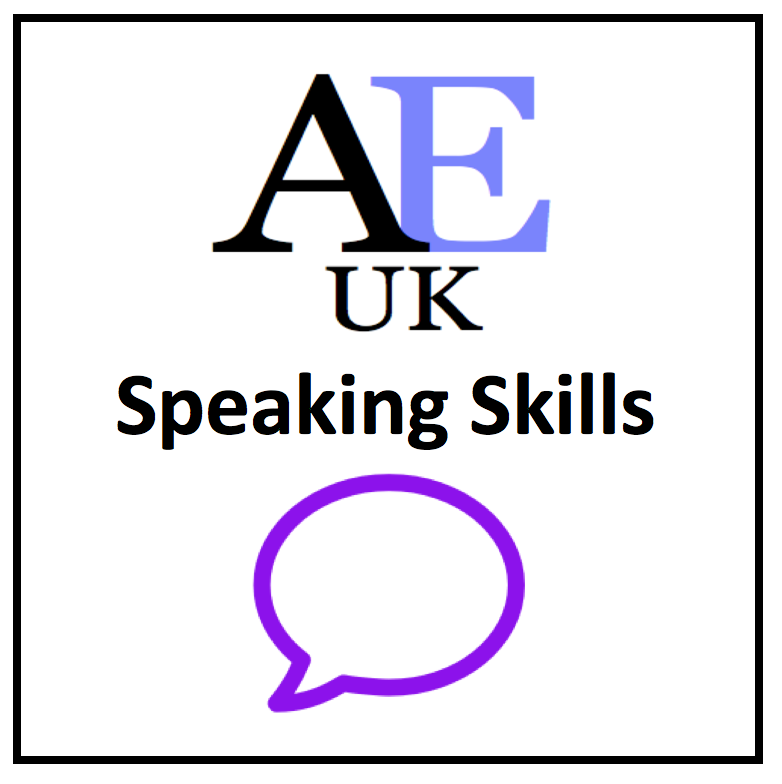
SPSE Essays

Free Resources

Charts and graphs

AEUK The Blog
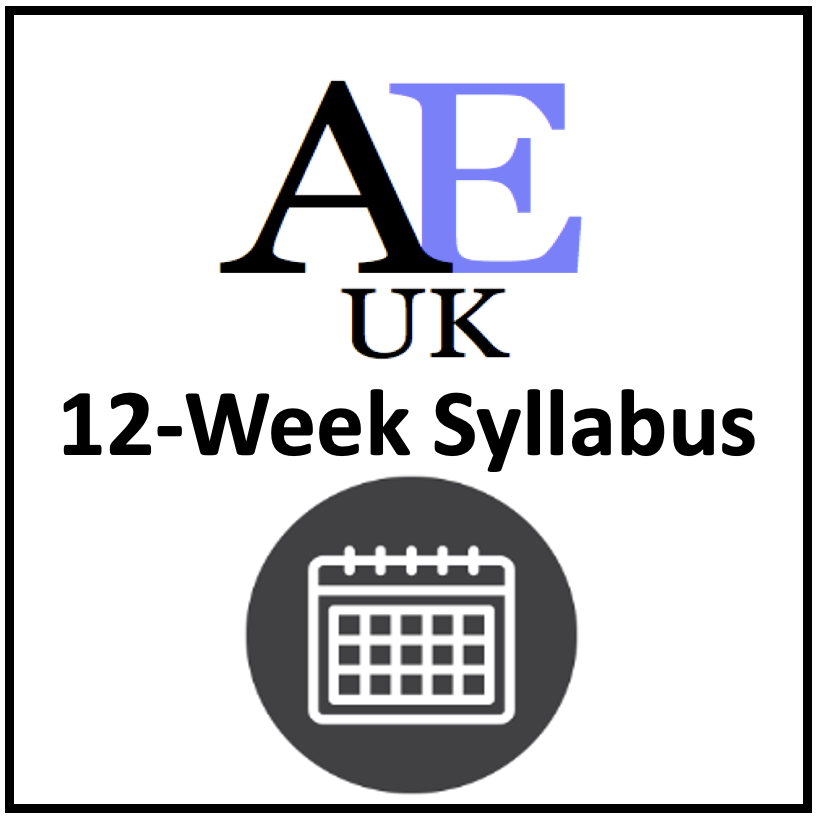
12-Week Course
Advertisement:.

Englit English Language Lab
Writing connectors (introduction).
- If you want to make your writing easier to read and more eloquent, using the connectors in the correct places is a must. Start using connectors to give your writing more flow and more style. Different types of connectors are used according to the logical relationship they establish between one sentence and another. Also known as conjunctions, these linkers can express contrast, cause, purpose, consequence, addition, and exemplification.
- Although/ though/ Even though + full sentence +comma / Even so+ comma
- In spite of/ despite + noun or –ING
- Despite the fact that…
- However/ Nevertheless + comma
- On the one hand/ On the other hand + comma
- In contrast to/with
- As opposed to…
- On the contrary + comma
- Alternatively + comma
- Instead of + -ING
- The former/ the latter (only with 2 components)
- Conversely+ comma
- While/ Whereas + full sentence
- But/Yet + full sentence or –ING Example: The book is short, YET it is interesting / The book is short YET interesting .
- As well as + -ING
- Apart from this / that + comma
- Also (at the beginning + comma/ before the main verb)
- Too (at the end of a sentence)
- Besides + comma
- Additionally + comma
- What is more + comma
- On top of that + comma
- Furthermore / Morever (after giving various reasons)
- In addition to + – ING
- One such example is …
- In other words + comma
- That is to say …
- One instance could be …
- For example / for instance
SEQUENCE and TIME
- First of all / Firstly + comma
- To begin with + comma
- Once /as soon as + full sentence. Ex. Once you have finished studying you can go to the park
- Secondly + comma
- Later/ after that / afterwards + comma
- Then / next + comma
- Meanwhile/ in the meantime + comma
- Now that + full sentence. Ex. Now that you have finished studying you can go to the park.
- All of a sudden / suddenly + comma
- Eventually/ finally/ in the end + comma
- To infinitive
- So that / in order that + full sentence
- In order to /so as to + infinitive
- As a result/ consequently/ accordingly/ as a consequence + comma
- Therefore + comma
- For this /that reason + comma
- So / that is why/ because of this/ that + comma
- With this in mind + comma
- On account of the fact that + full sentence
- Bearing this in mind + comma
- Taking this into account + comma
- Because of / on account of + full sentence
- Owing to / due to + -ING / noun
- In view of/ in the light of + -ING/ full sentence
- Given that + comma
- My own view of this is …
- My personal opinion …
- Speaking personally + comma
- It seems to me that…
- For my part + comma
- As I see it + comma
- I feel strongly that …
- I believe …
TO PRESENT A TOPIC
- It is often said / asserted/ claimed that …
- It is a well-known fact that…
- For the majority of people …
- One of the most striking features/ aspects of this issue/ topic…
- By way of introduction …
- In summary + comma
- In brief + comma
- In short + comma
- To sum up + comma
- All in all + comma
- In conclusion to be brief + comma
- On the whole + comma
- Basically + comma
CLARIFICATION
- That is to say + comma
- To clarify + comma
- To rephrase it + comma
- That is + comma
- In the same way + comma
- Likewise + comma
- Similarly+ comma
- Compared with + -ING / full sentence
- In comparison with + -ING/ full sentence
INTENSIFICATION
- Indeed + comma
- Undoubtedly / without doubt + comma
- In fact + comma
- Certainly+comma
- By all means + comma
- Surely + comma
PARTICULARISATION
- In particular +comma
- Particularly + comma
- Specifically + comma
Connecting Ideas Through Transitions
Writing that Establishes Relationships and Connections between Ideas
Introduction Common Kinds of Relationships Writers Establish between Ideas Cohesion Coherence Transition Words and Phrases
Introduction
According to poet and science writer Diane Ackerman, “one of the brain’s deepest needs [is] to fill the world with pathways and our lives with a design.” We naturally look for how things are related. In writing, this means that readers tend to assume that two side-by-side sentences or adjacent paragraphs relate to each other. If the pathways and design of your writing aren’t clear to readers, readers will either get confused or frustrated or try to mistakenly intuit their own connections. Both responses can be disastrous.
Good writing provides clear passages through all of your ideas so that readers don’t get lost or start to blaze their own conceptual trail. These connections between ideas occur at the sentence, paragraph, section, and (for longer works) even chapter level. As a writer, it is your responsibility to make sure that your readers follow this progression, that they understand how you arrive at your various ideas and how those ideas relate to each other. In this page, we explore how to make your connections between ideas understandable by using common relationship categories to compose sentences that are cohesive, paragraphs that are coherent, and transitions that clearly order and introduce ideas.
Common Kinds of Relationships Writers Establish between Ideas
Writers are always working to establish clear relationships between and within all of their ideas. Consider how Derek Thompson moves naturally between one concept to another in this short passage from his The Atlantic feature about the future of jobs entitled “A World Without Work”:
[1] One common objection to the idea that technology will permanently displace huge numbers of workers is that new gadgets, like self-checkout kiosks at drugstores, have failed to fully displace their human counterparts, like cashiers. [2] But employers typically take years to embrace new machines at the expense of workers. [3] The robotics revolution began in factories in the 1960s and ’70s, but manufacturing employment kept rising until 1980, and then collapsed during the subsequent recessions.
In the first sentence, Thompson begins with an idea that is familiar to readers at three different levels. The argument that machines haven’t replaced all retail employees and therefore won’t do so in the future is common to anyone who has thought much about workplace technology. This idea is also specifically familiar to the individuals who have been reading Thompson’s article. Finally, Thompson makes this idea even more familiar by connecting it to an example that his readers are familiar with: the effects of self-checkout kiosks. In his second sentence, Thompson uses the transition word “but” to establish a contrastive relationship; what he is about to say in some way opposes what he just said. He concludes this passage with a sentence providing chronologically organized evidence for the idea he raised through that contrast. In this example, he very quickly leads us from the 1960s to the late 20 th century and is able to cover a lot of ground clearly because he starts with happened earlier and concludes with what has happened more recently.
In just these three sentences, we can see Thompson establishing different kinds of relationships between concepts. He is:
- guiding us from familiar ideas into unfamiliar ones,
- comparing two unlike things,
- providing examples for his claims, and
- presenting information chronologically.
Familiarity, contrast, example, and chronology are four common ways that topics can be related, but there are several others. The following lists identifies key relationships that we tend to find naturally in the world around us when we ask questions like, “Why did that happen?” and, “How do these two things fit together?” If you can obviously situate any your ideas within these well-known structures, then readers will be able to more quickly understand the connections you are establishing between your ideas. In the list that follows we identify these common relationship categories, explain them, and provide examples of sentences that establish these kinds of relationships. (All off these sample sentences are about research in Lake Mendota—the body of water just north of the UW-Madison campus.)
Familiarity– Connecting what readers know to what they don’t known.
Learning often involves drawing from existing knowledge in order develop new knowledge. As a result, this is one of the most important relationships you can establish in your writing. Start with what your readers know (either because you can assume a common knowledge or because you’ve already told them about this earlier in your paper or even in the preceding sentence) in order to then take them to something they don’t know.
Example: When you dive into a lake for a quick swim, you’re actually entering a diverse limnology laboratory—the research field for the ecologists who study inland waters.
Causation– Connecting the instigator(s) to the consequence(s)
We are very familiar with thinking about ideas and processes in relationship to cause and effect. You can use the prevalence of this relationship to your advantage by relating your ideas to causation.
Example: In the mid-19 th century, the white sand beaches that used to line Lake Mendota were engulfed by the additional four feet of water that the Tenney Locks brought into the lake (Van Eyck).
Chronology– Connecting what issues in regard to when they occur.
This is particularly useful if you are describing a sequence of events or the steps of a process.
Example: In 1882, E.A. Birge was gathering data about the prevalence of blue-green algae in Lake Mendota (Van Eyck). By 1897, he was publishing about plankton (Birge). Even when he became president of UW-Madison several years later, his interest in freshwater lakes never waned (“Past presidents and chancellors”).
Combinations
Lists–connecting numerous elements..
You can think of this as a “this + this + this” model. You are saying that a collection of concepts or elements contribute equally or simultaneously to something. Within lists, it’s still important that you are being strategic about which elements you are identifying, describing, or analyzing first, second, and third.
Example: Across its studied history, Lake Mendota has been negatively affected by blue-green algae, Eurasian milfoil, spiny water fleas, and zebra mussels, among others (Van Enyck).
Part/Whole— Connecting numerous elements that make up something bigger.
This is a “this + this + this = that” model. You are showing how discrete elements form something else through their connections.
Example: Across generations, the damage Lake Mendota has sustained as a result of the unnaturally prolific prevalence of blue-green algae, Eurasian milfoil, spiny water fleas, and zebra mussels has irreparably altered these waters.
Contrast– Connecting two things by focusing on their differences.
This establishes a relationship of dis-similarity. It helps readers understand what something is by comparing it with something that it is not.
Example: But whereas boosting the population of walleye and northern perch in Lake Mendota effectively reduced the prevalence of Eurasian milfoil, scientists haven’t been able to develop a plan to respond to the damaging spiny water fleas (Van Eyck).
Example– Connecting a general idea to a particular instance of this idea.
Arguments are made more understandable and persuasive when you develop your overall claims in relationship to specific evidence that verifies or exemplifies those claims. Which examples will be the most persuasive (e.g., statistical data, historical precedent, anecdotes, etc.) will depend on the knowledge, interests, disposition, and expectations of your reader.
Example: “These new challenges demand new solutions, some behavioral (such as cleaning boats from lake to lake) and some research-driven (for example, identifying a natural predator for the invasive species)” (Van Eyck).
Importance– Connecting what is critical to what is more inconsequential.
This can also be thought of as connecting what is big to what is small. You may also choose to reverse these relationships by starting with what matters least or what is smallest and building to what is the most important or what is the most prominent. Just make sure that you are helping your reader understand which end of the spectrum you are starting with.
Example: Boaters were inconvenienced by the Eurasian milfoil clogging their propellers, but the plants’ real harm was dealt to the lake’s native flora and, consequently, its fish (Van Eyck).
Location– Connecting elements according to where they are placed in relationship to each other.
Even if you aren’t writing about geographical entities, you can still clarify how various ideas are positioned in relationship to each other.
Example: Whether or not the lake is pretty is peripheral to the issue of whether or not its natural ecosystems are in balance.
Similarity– Connecting two things by suggesting that they are in some way alike.
This highlights commonalities to show readers how elements or ideas are serving the same function.
Example: Just as invasive water flora (i.e., Eurasian milfoil) disrupted Lake Mendota’s ecosystem in the 1970s, in 2009 scientists discovered that the lake was being damaged by invasive water fauna (i.e., spiny water fleas) (Van Eyck).
While the examples provided above for each of these relationships is a sentence or short series of sentences where relationships are established through sequencing and transition words, you should also develop these kinds of common connections between ideas on a large scale through grammatical parallelism, paragraph placement, and your progression from one section to another.
Also, as can be seen in these examples, sometimes multiple different relationships are functioning simultaneously. For instance, consider again the example for the “Importance” item:
The ideas in this sentence work within the following relationship categories:
- Importance—Connecting what is more inconsequential (i.e., how boaters are bothered by Eurasian milfoil) to what is most critical (i.e., how the lake’s ecosystem is disrupted by Eurasian milfoil),
- Contrast—Connecting two things (i.e., boaters’ concerns and the lake’s wellbeing) by focusing on their differences,
- Causation—Connecting an instigator (i.e., Eurasian milfoil) to consequences (i.e., native plants’ destruction and, secondarily, the native animals’ destruction).
This collection of interwoven relational connections doesn’t mean that these ideas are jumbled; this is just an indication of how relationships can become interconnected.
Since clearly working within these relationship categories can be useful for organizing your key concepts as well as guiding readers through the structure of entire papers or particular paragraphs as well as sentences, different kinds of connections can be similarly layered across the whole structure of a paper. For example, if you are composing an argument about why it’s so hard for meteorologists to pin-point the severity and location of tornadoes, the overarching relationship of your ideas might be part/whole because you’re interested in how a range of factors contribute to a difficult prediction process. However, within your paragraphs, you might have to use chronological and causation relationships to describe the physical processes by which tornadoes are formed. And from sentence to sentence, you’ll need to make sure that you are starting with what’s familiar to your readers before moving into what’s new.
Joseph Williams and Joseph Bizup, in their handbook Style: Lessons in Clarity and Grace , identify the process of moving from what is known to what is unknown as “cohesion.” “Sentences are cohesive ,” they write, “when the last few words of one sentence set up the information that appears in the first few words of the next” (67). They relate this careful sequencing to the issue of “flow”—readers find that ideas follow each other naturally when one sentence begins where the previous sentence left off.
Consider another annotated example passage from Derek Thompson’s economic analysis of the effects of automation and technology on jobs. This paragraph comes after one about how horses (once primary forces for industrial production) were made obsolete by transportation technology.
[1] Humans can do much more than trot, carry, and pull. [2] But the skills required in most offices hardly elicit our full range of intelligence. [3] Most jobs are still boring, repetitive, and easily learned. [4] The most-common occupations in the United States are retail salesperson, cashier, food and beverage server, and office clerk. [5] Together, these four jobs employ 15.4 million people—nearly 10 percent of the labor force, or more workers than there are in Texas and Massachusetts combined. [6] Each is highly susceptible to automation, according to the Oxford study.
Thompson’s most obvious application of Williams and Bizup’s concept of cohesion happens at the end sentence 4 and the beginning of sentence 5 where he first lists four professions (salesperson, cashier, server, and clerk) then begins the next sentence with, “these four jobs.”
But even on a conceptual level, Thompson is continuously moving from old information to new information. Consider this analysis of the conceptual shifts within each of these six sentences where Thompson’s ideas have been stripped down and his key concepts have been highlighted in different colors:
[1] Humans have more skills than horses. [2] Humans’ full range of skills aren’t always utilized by many office jobs . [3] Many jobs don’t push us to our full potential. [4] Here are the most common jobs . [5] These jobs employ many people. [6] These jobs could be eliminated through automation .
Thompson begins this paragraph by connecting a new idea (i.e., humans’ present occupational relationship to technology) to an old idea from the previous paragraph (i.e., horse’s past relationship to technology). After introducing the human subject, he then uses it to bring in his next topic: workplace skills. Then, through skills he brings in the issue of jobs, and jobs eventually lead him to the issue of automation. This sequence holds together like a line of conceptual dominoes.

Connecting new ideas to old is a practice that you should implement across sentences, paragraphs, and even whole sections of your writing. However, be careful. If this practice becomes heavy-handed or overdone, your writing can become patronizing to your readers. Make sure that you are clearly and comprehensively connecting ideas and not just sequencing subjects.
In Style: Lessons in Clarity and Grace , Joseph Williams and Joseph Bizup also write about the importance of coherence. While “cohesion” and “coherence” sound similar, they are two different things. “Cohesion” is about ideas that connect to each other “the way two pieces of a jigsaw puzzle do,” whereas “coherence” “is when all the sentences in a piece of writing add up to a larger whole” (69). Sometimes this is also called “unity.” Coherence is achieved when the things you are writing about all clearly contribute to the same overarching topic. For example, let’s return to the domino example from above. The movement from humans to skills to jobs to automation works because Thompson’s larger article establishes a thematic connection between all of these topics: work changes in response to technological developments. Thompson is even able to start this paragraph with an otherwise unexpected reference to horses because in the previous paragraph he has shown his readers how horses also relate to this theme of work changing in response to technological development. Within your writing, it’s important to make sure that all of your smaller ideas are related to and pointed towards the same goal.
Williams and Bizup suggest one way of making sure that your writing is coherent or unified is to pay attention to what each of your sentences is about—its subject (the noun or pronoun that guides a sentence) and topic (the idea that is the focus of that sentence). In most sentences, your subject and topic should be the same thing. Also, most of the time your topic should be short and direct, and each paragraph should be primarily dedicated to one topic. As an example, consider again this paragraph from the Thompson article about human skills, jobs, and automation. The subjects/topics of each sentence have been highlighted.
1] Humans can do much more than trot, carry, and pull. [2] But the skills required in most offices hardly elicit our full range of intelligence. [3] Most jobs are still boring, repetitive, and easily learned. [4] The most-common occupations in the United States are retail salesperson, cashier, food and beverage server, and office clerk. [5] Together, these four jobs employ 15.4 million people—nearly 10 percent of the labor force, or more workers than there are in Texas and Massachusetts combined. [6] Each is highly susceptible to automation, according to the Oxford study.
Note that after setting up this paragraph in a way that connects back to the previous paragraph’s focus on horses, Thompson settles into the issue of jobs as his clear and primary focus. The final four sentences have some version of “jobs” as their subject and topic. This consistency allows him to develop coherent ideas about this one issue.
For more information about writing intentionally structured and unified paragraphs, check out our resource on paragraphing. Additionally, if you are trying to discern whether or not your paragraphs are functioning coherently across your entire paper, we recommend the practice of reverse outlining. You can find out more about this technique here.
Transition Words and Phrases
The best way to clearly communicate the logical pathways that connect your ideas is to make sure that you move smoothly from old information to new information (cohesion) and that your readers always understand how your primary topics contribute to the big picture of your overall argument (coherence). While we’ve considered ways that whole sentences and paragraphs can do this work, sometimes even individual words can help you establish clear, cohesive, and coherent relationships between your ideas. In writing these are often called “transition words.”
The following is a list of useful transition words and phrases. Following the list of common relationship categories provided above, these words are organized according to the kinds of relationships they frequently develop. Of course, establishing clear relationships between ideas requires much more than just dropping one of these into the start of a sentence, but used sparingly and carefully based on the logical associations they establish, these words can provide usefully obvious indications to your readers of the kind of connections you are trying to develop between your ideas.
Causation– Connecting instigator(s) to consequence(s).
accordingly as a result and so because
consequently for that reason hence on account of
since therefore thus
after afterwards always at length during earlier following immediately in the meantime
later never next now once simultaneously so far sometimes
soon subsequently then this time until now when whenever while
Combinations Lists– Connecting numerous events. Part/Whole– Connecting numerous elements that make up something bigger.
additionally again also and, or, not as a result besides even more
finally first, firstly further furthermore in addition in the first place in the second place
last, lastly moreover next second, secondly, etc. too
after all although and yet at the same time but
however in contrast nevertheless nonetheless notwithstanding
on the contrary on the other hand otherwise though yet
as an illustration e.g., (from a Latin abbreviation for “for example”)
for example for instance specifically that is
to demonstrate to illustrate
chiefly critically
foundationally most importantly
of less importance primarily
above adjacent to below beyond
centrally here nearby neighboring on
opposite to peripherally there wherever
Similarity– Connecting to things by suggesting that they are in some way alike.
by the same token in like manner
in similar fashion here in the same way
likewise wherever
Other kinds of transitional words and phrases Clarification
i.e., (from a Latin abbreviation for “that is”) in other words
that is that is to say to clarify to explain
to put it another way to rephrase it
granted it is true
naturally of course
finally lastly
in conclusion in the end
to conclude
Intensification
in fact indeed no
of course surely to repeat
undoubtedly without doubt yes
for this purpose in order that
so that to that end
to this end
in brief in sum
in summary in short
to sum up to summarize
Works Cited
Ackerman, Diane. “I Sing the Body’s Pattern Recognition Machine.” The New York Times , 15 June 2004. https://www.nytimes.com/2004/06/15/science/essay-i-sing-the-body-s-pattern-recognition-machine.html . Accessed 6 June 2018.
Birge, Edward Asahel. Plankton Studies on Lake Mendota . Harvard University Library of the Museum of Comparative Zoolog., 1897.
“Past presidents and chancellors.” Office of the Chancellor , University of Wisconsin-Madison, 2016. https://chancellor.wisc.edu/past-presidents-and-chancellors/ . Accessed 16 June 2018.
Thompson, Derek. “A World Without Work.” The Atlantic , July/August 2015, https://www.theatlantic.com/magazine/archive/2015/07/world-without-work/395294/. Accessed 14 June 2018.
Van Eyck, Masarah. “Lake Mendota: a scientific biography.” L&S News , College of Letters and Sciences University of Wisconsin-Madison, 29 Aug. 2016. http://ls.wisc.edu/news/lake-mendota-a-scientific-biography . Accessed 15 June 2018.
Williams, Joseph M. and Joseph Bizup. Style: Lessons in Clarity and Grace . 12 th ed., Pearson, 2017.

Improving Your Writing Style
This is an accordion element with a series of buttons that open and close related content panels.
Clear, Concise Sentences
Use the active voice
Put the action in the verb
Tidy up wordy phrases
Reduce wordy verbs
Reduce prepositional phrases
Reduce expletive constructions
Avoid using vague nouns
Avoid unneccessarily inflated words
Avoid noun strings
Transitional Words and Phrases
Using Transitional Words and Phrases
- +91-9780747405
- [email protected]
- Answer Short Question
- Best PTE Classes in Kathmandu
- Describe Image
- Describe Images
PTE PEARSON STUDY MATERIAL
PTE Academic – The English test that takes you places
CONNECTORS FOR ESSAY WRITING
Connectors that can help you get a better score in pte academic essay writing, essay connectors.
- to illustrate
- In another hypothetical case
- There is also a possibility that
- On the positive side
- I would probably oppose the fact that
- Most important from my point of view
- This quotation describes as undeniable fact
- Of-course, some people may argue that
- To a point, that is true
- Here I would like to put emphasis on
- Though it may be unpopular to say so
- In extreme cases
- Other consequence may include
- There is a good reason to oppose
- On the whole
- This situation is troublesome and may lead to
- In addition to the other factors listed above
- We live in an ever-changing society
- To a large extent
- Many other cases also illustrates
- In recent years
- Here is even a more extreme scenario
- Now imagine
- Let us first concentrate
- For several reasons I would prefer
- However, I also believe that
- One must also remember that
- The matter of the fact is that
- While this may be true to some extent
- This brings me to my second point
- However I would argue that
- Although it is undoubtedly true
- All in all, I believe that
- Others myself included are of the opinion that
- Another effective measure would be
- One solution to the problem is
- I suppose most of us would argue that
- It’s a very common sight these days
- To begin with
- While I believe it is true
- In a nutshell
- In conclusion, I believe that
- On the other hand, however, there are those who claim that
- Nowadays modern technology has totally changed our approach to studying.
- Personally, I believe
- . Experts have put forward many suggestions to address this problem.
- However, there is growing evidence that
- Perhaps a solution to this problem is
- This is surprising as most people think that
- Let us take a more detailed look at the causes of this
- One of the most obvious reasons
- I tend to agree that
- In the long run
- “Experience is the best teacher” is an old cliché, but I agree with it.
- The twentieth century has brought with it many advances. With those advances, human lives have changed dramatically.
- The most important thing to realize is that
- I entirely agree with this view and believe that
- There is plenty of evidence to suggest that
- There is a third factor, however, which contributes to the situation
- The reasons for this trend may involve
- There are advantages and disadvantages for both of the arguments.
- Providing an excellent education in the public school system is vital to the strength of our community and our country.
- I totally disagree with the idea
- there is indeed a correlation between a healthy body and healthy mind.
- sports can serve to create healthier bodies, which in turn would serve as a form of “preventive medicine” thereby cutting down on medical costs.
- When we are healthy, we feel better and so are more likely to be productive academically
- With the advent of globalization
- It’s widely believed in today’s materialistic world that
- However, this statement does not fully hold water
- In conclusion, I would say that I largely agree with the argument that
- Overall, it can be said that
- On the other hand, there is no doubt that
- In conclusion, while both approaches have benefits and drawbacks
- A much-debated issue these days is
- To sum up, I think that
- Below I will give my reasons to support my answer
- From my everyday experience and observation, I can claim that
- In our modern stressful world, we often forget about our customs and traditions
- I am a person who likes to travel. I think traveling is a great opportunity to meet new people, gain more knowledge and experience, and learn new customs and traditions.
- Some people say that the invention of computers is one of the greatest humankind’s inventions. However, other people think that computers make their life more stressful.
- The invention of television is undoubtedly one of the humankind’s greatest inventions
- People learn through their entire lives. Curiosity was always the basic characteristic of a human being. We always want to break limits and learn more.
- Ironically, the government has taken only little/ minuscule steps to combat this problem.
- The problem if aggravated to its highest possible limit then it would be catastrophic.
- Jumping to the conclusion straight away would be little premature.
- This problem has penetrated the very fabric of our society.
- To come out of the shackles of the poverty we must …………………………………..
7 thoughts on “CONNECTORS FOR ESSAY WRITING”
Thanks you so much for all these prominent connectors…. 🙂
These are great essay connectors. Thanks.
Thanks a lot for these useful connectors.☺
Thank u so much for ur help.
Very useful connectors.thanks
thanks for connectors , definitely i will use these ..
thanx, a lot dear.
Leave a Reply Cancel reply
Your email address will not be published. Required fields are marked *
Save my name, email, and website in this browser for the next time I comment.

Connectors in English
There are a number of connectors in the English Language that can be used to help you show contrast, similarity, outcome, result, sequence and order or relevance or importance, exemplification, emphasis, explanation, dismissal, summarising or concluding, particularising, focusing, timing, and correction.
Connectors are especially useful when it comes to your IELTS writing exam and the Speaking exam.
Below is a list of all the connectors in the English language categorized by what they are used for.
There are also examples to help you see how they are applied.
Connectors for the Writing and Speaking Exam
- Likewise (can be used for both the writing and speaking tests)
In his budget the Minister of Finance increased spending on higher education, he likewise improved spending on social development.
- In the same way (can be used for both the writing and speaking tests)
Religious doctrine is used to teach people right from wrong in the same way as fables were used to teach simple human truths.
- Similarly (can be used for both the writing and speaking tests)
Italian painters are renowned for their innovative works. The Greeks are similarly known for their philosophies.
- Also (can be used for both the writing and speaking, but there are more academic sounding alternatives to “also” to use in your essays).
Employees of any large organisation expect fair treatment. They also expect to earn a fair wage.
- Correspondingly (writing)
The cost of living in large cities is higher than in the country but the salaries are correspondingly higher.
- Simultaneously (writing)
Most governments simultaneously tackle crime and unemployment as they are seen as two sides of the same coin.
- In the same breath (writing)
Many countries express the view that climate change must be halted. In the same breath they throw suspicion on the whole global warming issue.
Connectors for Outcome and Result (writing)
- Therefore (ok for both)
Most governments believe in the importance of education. They are, therefore, willing to invest large amounts of money in improving the quality of the education.
- As a consequenc e (ok for both)
The nuclear disaster at Fukushima was worse than the scientists had anticipated. As a consequence the Japanese government has changed the way that nuclear power plants are built.
- Thus (more for writing)
The local council received additional funding for the arts. They were, thus able to renovate the art gallery on the city centre.
- As a result (neutral, can be used in the speaking and in your essays)
It rains quite often in Europe, as a result, most Europeans tend to vacation in sunnier destinations.
- Accordingly (writing)
The quality of products started to decrease rapidly so the government acted accordingly and started to inspect all incoming goods.
Contrast (writing)
- Nonetheless
Humans only use on average about 10% of their brains. They are, nonetheless , able to compute huge amounts of data, coming up with ever more innovative ideas.
- Nevertheless
I really wasn’t feeling very well, I, nevertheless , went to work because I had a presentation to do.
- In contrast
Coastal tourism is on the rise. In contrast , visits to urban areas are declining as people reduce business travel and confine meetings to video conferencing.
The government planned to re-introduce the death penalty. There was, however , a public outcry and they had to halt the legislation.
Today most people are aware of the dangers of smoking and yet many people continue to damage their health by smoking
- All the same (more suited for spoken English)
Tourists are often drawn by inner city art otherwise known as graffiti. All the same many city councils regularly remove the art.
- In any case (more for spoken English)
The much anticipated outdoor exhibition was called off at the last minute. In any case the weather was awful so the exhibition would not have drawn many visitors
- Instead (ok for both)
America should consider amending their gun laws, instead , they ignore the problem.
- On the contrary (ok for both)
The curator of the museum was of the opinion that the Antiquities room would draw the most interest. He found, on the contrary , that the natural sciences display was much more popular.
- By comparison (ok for writing)
Tourism in the 20th century has been driven by the availability of high speed transport. By comparison , in the 19th century, tourists had to rely on ships and trains to get to their destinations.
- On the other hand (more used in writing but can be used when speaking too)
Some people contend that antibacterial soaps and detergents are good because they ensure a bacteria free environment. On the other hand , there are those who disagree arguing that ridding the environment of microbes robs us of the ability to form an immune response.
Connectors to illustrate a sequence (speaking)
- For one thing
He was asked why he seldom read the newspapers. His reply “For one thing, the news is depressing, for another, I prefer to spend my spare time watching documentaries.”
- To begin with
He found that the work was easy to begin with , but it got progressively more difficult as he went along.
- For another thing
People with common sense should quit smoking. For one thing it costs a fortune. For another thing it is dangerous and can lead to a number of nasty diseases.
The charity was looking for volunteer workers to man the stalls. They also needed people who were prepared to stay overnight and look after the valuable goods that would go on sale over the weekend.
Connectors to illustrate a sequence (writing)
- First, Firstly, In the first place, First of all
The local council should not allow people to sleep on the streets in the first place.
- Second, Secondly, In the second place
It is first and foremost the government’s responsibility create employment. In the second place they should ensure that employers treat their workers fairly and with respect.
- Third, Thirdly, In the third place
In seeking employment she wanted to ensure that she followed her dreams. Secondly she wanted a decent wage and thirdly she hoped that there were opportunities for promotion.
- Last, Lastly, Last of all (can also be used in your speaking)
Lastly it is the responsibility of the most senior member of staff to ensure that the offices are locked and secured at the end of the day
- In addition
The organisation offered to make amends for any problems that had been caused by the misinformation that had been published in their magazine. In addition , they discounted the next edition of the glossy publication.
Besides the medical aid costing too much, it fails to offer even the most basic of out of hospital services
Over the years computers have become more and more powerful, moreover they have also become less expensive.
- Furthermore
The houses in the neighbourhood were large and spacious. Furthermore , they had easy access to public transport.
The shipment of computers was three weeks late, but when it finally arrived the staff agreed that the quality and high speed made the wait worthwhile.
Order of relevance or importance
- Most importantly (suitable for both the speaking and the writing tests)
We should discuss how to maintain a work life balance, most importantly , how organisations can ensure that employees are not overworked.
- Most significantly (suitable for both the speaking and the writing tests)
The president said that the year ahead would be different. Most significantly he indicated that he would re-allocate funding to obtaining additional resources.
- Essentially, Basically (suitable for both the speaking and the writing tests)
The manager said that it was basically the responsibility of every employee to ensure that the customers were delighted with the service that they received.
- Above all (suitable for both the speaking and the writing tests)
The leader of the opposition said that it was his responsibility to ensure that the government was transparent. Above all he was concerned that corruption is kept at bay.
- Primarily (more common to write this word than say it)
The government is primarily responsible for the welfare of the people.
Exemplification – Giving Examples
- For example (suitable for both)
If, for example , we could put the well-being of others before ourselves the world would be a much happier place for all.
- For instance (suitable for both)
Modern urban populations are battling lifestyle diseases brought on by obesity. Diabetes, for instance , is growing in prevalence and more and more people have to take chronic medication.
- To illustrate
Misinformation can cause many disagreements. To illustrate , a company advertising goods at an incorrect price could lead to disgruntled customers.
- In fact (suitable for both)
It could be argued that trade sanctions are trouble for the economy. In fact , many would say that the imposition of sanctions could start a war.
- Actually (more commonly found when speaking)
The doctor thought that the patient had measles when, actually , it was something far more severe.
- As a matter of fact (more commonly found when speaking)
What most people fail to understand is that travelling isn’t for everyone, as a matter of fact , many people prefer to settle down in one place.
- Indeed (could be difficult to use this phrase naturally in spoken English, therefore better for the writing).
Indeed , it may be a lot easier to just give up on passing your driver’s licence test.
Explanation
- Namely (suitable for both)
The teacher had pointed out various countries around the world, namely, Portugal, Brazil, India and Australia.
- That is to say (that is) (more suitable for spoken English)
He was not found guilty in a court of law that is to say he walked out scot free.
- Put differently (“in other words” can also be used) (use this in spoken English)
It gets really busy during the holiday season and the beaches tend to get crowded, put differently, rather go to the beach before the holiday season starts.
- In other words (more suitable for speaking)
There is much to discuss before choosing to start a family, in other words, think before you rush into it.
Dismissal (dismissing what has been said prior)
- Anyhow (definitely a spoken phrase, not academic)
Anyhow, I’ll just take the next train instead.
- At any rate
At any rate, learning a new language will not be easy.
- Anyway (informal)
Anyway, I will leave the function early.
Summarising or Concluding
- In summary (formal)
In summary, I have come to the realisation that communication plays a big role in the success of a team.
- To sum up (both informal and formal)
To sum up my thoughts, I think choosing a single piece of art from a couple hundred is rather difficult.
- In conclusion (academic written English)
In conclusion, winning isn’t necessarily the most important thing, it’s the way you played the game.
- In brief (spoken English)
In brief, today’s headlines were depressing.
- All in all (spoken English)
The project turned out okay, all in all, I think everyone did a fantastic job.
Specificity
- Most specifically (ok for both)
Eating vegetables is very good for eyesight, most specifically, carrots are thought to improve your night vision.
- In particular, particularly (ok for both)
Nearly a third of teenage girls will experience some form of abuse, in particular, physical abuse by a boyfriend.
Focusing and Linking
- With respect to (ok for both)
With respect to the contract, we regret that we are unable to accept the terms and conditions.
- Regarding (ok for both)
Regarding the proposal, we regret that we are unable to agree with some of your requirements.
- With regard to (more formal, better for the writing test)
With regard to your application for employment, I regret to inform you that you have not succeeded in securing the job.
- As for (ok for both)
The entire dance troupe failed to impress the judges. As for the main dancer the less said the better.
- As far as (ok for both)
As far as I could see the travel destination was more than adequate for what we had in mind.
- Talking of / speaking of (speaking test)
Talking of relocating, do you know where you going to stay? Have you found and apartment?
- When it comes to
Sometimes when it comes to debating it is best to let your opponent have the last word.
- Then (ok for both)
The municipal workers went on a day long course, then they took an exam.
- Afterwards (ok for both)
The Olympic team practiced for the bulk of the day. Afterwards they relaxed and spent time with their families
- At First (ok for both)
At first, I wasn’t sure how to start my preparation for the IELTS test and then I discovered IELTS Podcast.
- Meanwhile (ok for both)
The US and China are fighting over import duties, meanwhile the world economy is suffering.
- Later (ok for both)
I went to university to study accounting, later , I changed to engineering.
- In the mean time (ok for both)
I plan to go to university next year. In the mean time I’d like to travel abroad.
- To be more precise (ok for both)
I was not referring to a single doctrine, to be more precise I meant that I believe that all religions are biased.
- Rather (ok for both)
She wanted to be a dentist rather than a doctor.
If you want to
- Free Essay Band Score Evaluation
- Sign up to claim your free IELTS materials
- Jump to Band 7 or it’s Free
- IELTS Writing Evaluation
- IELTS Band Score Calculator
- Book Your Online IELTS Test
- Sample Topic Answers
- Useful Sentences
- Sample Task 2 Questions 2022
- Introduction to Paraphrasing
- Model Band 9 Essay
- Five Band 9 Words
- Model Band 7 Essay
- Differences Band 9 vs Band 7 Essay
- Band 6.5 Essay
- Academic Collocations
- Topic Sentences
- Discuss Both Views
- Tutorial: To What Extent Essays
- Paraphrasing Introductions
- Essay Structures
- Essay Plans
- Describe a Pie Chart
- Using Percentages
- Map Vocabulary
- Describe Flow Charts
- Describe a Bar Chart
- How to get Band 9
- AT 1 Sample Questions 2022
- Describe a Graphic
- GT Task 1 Questions 2022
- IELTS Vocabulary
- Google Play / Podcasts
- Apple Podcast
- Android App
- Task 2 Sample Questions
- AT 1 Questions
Company addresses: HK Office: BW ENGLISH SERVICES HK Ltd, Unit 2512, 25/F, Langham Place Office Tower, 8 Argyle Street, Mongkok, Hong Kong UK Office: BW ENGLISH SERVICES, 120 High Road, East Finchley, N29ED, London, England, United Kingdom +44 20 3951 8271 ($1/min).

IELTS Preparation with Liz: Free IELTS Tips and Lessons, 2024
- Test Information FAQ
- Band Scores
- IELTS Candidate Success Tips
- Computer IELTS: Pros & Cons
- How to Prepare
- Useful Links & Resources
- Recommended Books
- Writing Task 1
- Writing Task 2
- Speaking Part 1 Topics
- Speaking Part 2 Topics
- Speaking Part 3 Topics
- 100 Essay Questions
- On The Day Tips
- Top Results
- Advanced IELTS
Linking Words for IELTS Writing Task 2
The linking words list below is essential for IELTS writing task 2 for high score. The examiner needs to see a range of linking words in your essay to award you a high score for the criterion of Coherence and Cohesion which is 25% of your marks. You will be checked on your range, accuracy and your flexibility of linking words in IELTS writing task 2. These connecting words are suitable for all types of essay writing as well as GT IELTS writing task 2

Download PDF: Linking Words for IELTS Writing Task 2
This is often used to either put your paragraphs in order or used inside the paragraph to list your supporting points.
- lastly /last but not least / finally
Adding Information
You will need to support your main points in your IELTS essay. These linkers inform the reader that extra information is about to be presented.
- in addition
- additionally
- furthermore
- not only … but also
Giving Examples
It is often useful to give examples to support your ideas in IELTS writing task 2. Make sure you use this range of linking words to do so.
- for example
- one clear example is
- for instance
- to illustrate
- in other words
To learn how to put examples in sentences for essay writing, please follow this link: How to Add Examples to Essays .
Results and Consequences
These linking devices can be used for solution essays or any essay when you need to explain the consequences of something.
- as a result
- consequently
- for this reason
Highlighting and Stressing
It is important to be clear about what you mean in your essay. These linking words help you stress particular points.
- particularly
- in particular
- specifically
Concessions and Contrasts
You often need to give opposite ideas, particularly for discussion essays so the linking words below will help you show the reader when you want to introduce an opposite point. Also you might want to give exceptions to a rule for a concession.
- nevertheless
- even though
- in spite of
- on the other hand
- by contrast
- in comparison
- alternatively
- another option could be
Reasons and Causes
These connecting words will help you explain reasons and causes for something which is very common in IELTS writing task 2, especially for cause / solution essays.
Giving your Opinion
- in my opinion
- I concur / agree
- I disagree / I cannot accept
Don’t make a mistake with the way you express your opinion. Watch this video for useful tips on giving your opinion and how to avoid mistakes: IELTS: Presenting your Opinion
Concluding Linkers
- in conclusion
- to conclude
To get more tips and advice on linking words to start your IELTS conclusion, please watch this video lesson: IELTS Conclusion Linkers
Practice with Linking Words
Improve your use of linking words by fill in the gaps below with linking words from the above list.
- There are a number of drawbacks to people using Facebook as a way of communicating (1)………………… it is (2)…………….. one of the most common social networking platforms for both individuals and businesses.
- (3)……………………….. the lack of exercise taken by average people, obesity and other weight related problems are on the rise.
- Unemployment and poverty, (4) ………….. in urban areas, is often deemed to be the cause of rising crime rate.
- (5) ……….. the rise in urban crime, more and more people continue to move to cities looking for a better life.
- More children are becoming obese and (6)…………….. schools should be encouraged to provide more sports lessons and outdoor activities.
Click below to reveal the answers:
- Due to / Owing to ( you can’t have “because of” because it is at the beginning of a sentence)
- particularly / especially / specifically
- therefore / so / for this reason
IELTS Speaking Linking Words
Linking words for IELTS speaking . Both word list and tips.
Recommended
- All Linking Word Practice Exercises
- All Writing task 2 Model Answers, Tips and Videos
Main IELTS Pages Develop your IELTS skills with tips, model answers, lessons, free videos and more. IELTS Listening IELTS Reading IELTS Writing Task 1 IELTS Writing Task 2 IELTS Speaking Vocabulary for IELTS IELTS Test Information (FAQ) Home Page: IELTS Liz
Get my free lessons by email
Subscribe for free to get my new IELTS lessons sent to your email inbox.
Email Address
Hi liz, Could you please provide the marking scheme writing and reading module of IELTS or in other words I am asking for the factors on which student’s band score is decided.
You can find those linked in the main sections for Writing Task 1, Writing Task 2 and Reading, which are all linked by the RED Menu Bar at the top of the website. Marking for reading is based on correct or incorrect answers, but for the writing and speaking test, it’s based on marking criteria. You can also find a link by clicking on the TEST INFO option on the RED Menu Bar which shows band score information.
I just saw on the IDP IELTS website it says, “Don’t overuse basic linking words like firstly (instead, try using ‘The first reason for/ The primary reason for this”). Is that really better? Can I continue using ‘firstly’ like you do?
Sincerely, Draven
It is fine to use it. But don’t then use Secondly, Thirdly. When you write like a machine, you get a lower score in Coherence and Cohesion, which counts for 25% of your marks. You could try: Firstly / Another point to consider The first point to consider is / A further consideration it You shouldn’t just learn one option. The linking words you use will depend on the points you want to present. You must learn how to use them flexibily.
liz thank you lot for making all videos. take care of you
You’re welcome 🙂
Hello Liz, Thank you for this very educative blog. when giving examples in task 2 writing for the academic test, are correct statistics important or can one just use made-up stats?
Your are marked on ideas, supporting ideas, developing ideas, but not numbers. The examiner is not going to check statistical data in task 2. The examiner is marked Task Response, Coherence & Cohesion, Vocabulary and Grammar. This means writing numbers does even help your score that much. Which is better: 1) 75% of people in urban areas feel public transport could be improved. 2) The majority of people living in urban areas feel the public transport could be improved. The second option boosts your vocab score. It is a simple essay based on relevance, not stats and research.
Hi Ms. Liz. Thank you for your lessons 🙂
Thank you very much for your lessons..you deserve to ” The most effective IELTS teacher award ” Thanks once again
It is a misfortune that IELTS mandates the use of linking words for high scores. Especially at the beginning of sentences, linking words quickly tire the reader being pushed around.
If linking words tire the reader, they are not being used properly. You are being tested on using them flexibly in a way that supports the reader.
mam I would like to share a small problem which I facing almost last 10 days in IELTS classes. I’m not good in writing even I don’t know what to write or what to add .and what to think . could you tell me how can I improve .I will looking for your generous response
You can find model essays and tips on the main writing task 2 page of this website for free: https://ieltsliz.com/ielts-writing-task-2/ . But for some people, they need more training. My advanced lessons take you step by step through each paragraph and explain the content of each type of essay. You can find these lessons in my online store: https://elizabethferguson.podia.com/ . You can also find an Ideas for Essay Topics E-book, which contains ideas and vocabulary for topics. You memorise the ideas and adapt them to your essay topic. There’s also a Grammar E-book with many examples of sentence structures to help you. Hopefully all these will help you be clearer about how to tackle an IELTS essay and what to write.
Hi Liz, Can you allocate me some of the pre-ready templates which can be used as a topic statement in starting of the paragraph.
I do not provide them because they are the worst thing to do for your IELTS essay. IELTS does not accept memorised language and the higher band scores are all about flexibility, not templates. Writing task 1 is more formulaic than task 2 because task 1 is a report and most reports are pretty standard. But writing task 2 is all about creating unique sentences connected directly to the topic. This website is about learning and preparing for IELTS the right way.
very clear explanation Liz, Thanks !
Could i use the word “To recapitulate” in position of “To Conclude”? However l really impressed a lot to see your tremendous efforts for students. THANK YOU SOO MUCH MAM. may God bless you. Love from india 🇮🇳
Yes, you can use it but it won’t increase your score.
Teacher Liz, this is just a general question. Will points be deducted if literary words/phrases are used in IELTS Writing (or Speaking). Is literary factor considered informal? Thank you very much! Looking forward to hearing from your
I’m not exactly sure what you mean as you’ve provided no examples. However, to help understand: The writing test is formal. So, this means all informal language will cause you to lose marks. The only exception is the informal letter in GT writing task 1. The speaking test is informal and you can use all types of language and be as casual as you want in chatting to the examiner. But language should be used naturally, not poetically or in an overemphasized manner. You should talk as though you were talking to a friend.
I love you mam your are such a great teacher i appreciate your work 👍
Hey liz, I wanted to ask that for conclusion using “all in all” and “to wrap it up” are correct to use or not ?
They are informal and Writing Task 2 is formal.
Hi, Liz! You said in one of your videos that “to sum up” is rather informal for IELTS writing task 2. Why is it in the concluding linkers list then? Can I use it or not?
It is an option but some examiners think it is too informal. There are no rules in IELTS which have word lists that lower your score. It is examiner interpretation. I do not teach this linking word for a conclusion, but other teachers do. This is why it is in the list. My recommendations are recommendations, not rules.
Hi Liz, all your videos are very helpful to have a quick look on the respective modules. Thank you so much for sharing them.
You’re welcome.
Thanks for response
Hello Liz 👋, is it true that reading books or newspapers will improve our writing skills. If yes, what books or newspapers can you suggest to read.
They will certainly help you develop your writing, but they won’t help you develop your writing for IELTS.
I wonder if I am allowed to use specialized words in writing task 2 (as long as they are related to the task rubrics and the usage and the collocation is contextually appropriate). For instance, if the topic of the essay is “imprisonment”, am I allowed to use words like “criminals set free might resort to recidivism”? what happens if the examiner doesn’t know that term? I already know that IELTS guidelines demand that the underlying assumption in the writing exam be the candidate is writing for an academic “non-specialist” reader. Is this fact in contradiction with using technical terms?
With regards, Reza
It is not a case of being allowed or not allowed. It is about how you use language. If you are pushing high level words into your essay for effect, the language in the essay will become unnatural and will be marked down. So, never aim to impress. However, your example is completely fine. The word “recidivism” is an appropriate word to use for that sentence. Certainly not many candidates will know this word, but it is 100% accurate and appropriate. So, my advice is to use language naturally with the right intent and appropriacy based on your level of English. The examiner will not be specialised in law or other fields – bear that in mind. Your aim here is to hit band score 8 or 9, not to showcase specialised vocabulary. This is a basic English language test, not a test of legal language for example. Pay attention to the context of the essay – it isn’t an essay for a university degree in law. You don’t need to use specialised language to achieve your aim in IELTS. I would not recommend using such specialised language that a layperson would not understand. That isn’t an IELTS rule, it is just logical – use such language as is appropriate for the audience and the context.
Many thanks for the exhaustive response. You’re simply the best in the field, bar none!
I wonder if it is appropriate to use some linking words like ‘Moreover, Furthermore, Further’ to start a new paragraph? or they should be used to link ideas in between the sentence?
Thank you, Micaela
There are no rules about this. Linking is about being logical. I personally use these linking words for within the paragraph to add more information. When starting a new body paragraph I tend to use something more flexible, such as “Another point to consider is ..” – basically indicating the start of a brand new point rather than additional information to an existing point.
Can we use listing linkers (firstly, secondly etc) for inside the paragraphs? Or is it better to use linkers for organising paragraphs?
I believe we should use the additonal information linkers to support our main idea or present extended ideas.
Any thoughts?
Best using them within paragraphs. To each paragraph, try: Firstly, Another point, Finally. But to be honest, you can’t learn formulas like this for task 2. It all depends what your ideas are as to what linking words to use. You need to learn flexibility if you want a high score. Yes, you should use a good range of linking words in your essay.
Hlo madam , tomorrow will be my ILETS exam
Hi Liz, Do we need to use comm a after these linking word . If yes then in what circumstances. For instance if we use these linking words at the start of sentence what will the case. Also what will be case if we use these linking words in middle of sentence ?
This is an aspect of grammar that you need to study in depth. In a few weeks, I’ll be releasing a Grammar E-book. It will explain all of that and much much more.
Can I use ‘For one’ instead of ‘Firstly’? Can I continue using ‘Secondly’ and ‘Finally’ with ‘For one’ or it’s not correct usage?
“For one”, is informal and not suitable for IELTS essays. Be flexible with your use of linking devices but stick with formal ones.
Hi Liz, Thanks for the article. Is it safe to use comma (,) after every linking word?
Thanks Sirdhar
It depends which linking word and how the sentence is constructed.
”Poor sanitary conditions lead to wide range of bacterial and viral diseases as well as become a dangerous spot for the growth of dengue leading to dengue fever which is fatal.In order to avoid such consequences, my endeavour would be to construct underground pipes which prove to be effective giving a sensation of cleanliness.” Ma’am this is my answer to a direct question,” If you could change your hometown to make it a better place what changes would you make? ” Plz tell me the mistakes in structure or anything.
That question usually comes from speaking part 1. In part 1, they are relatively short answers – not deep discussions. The examiner would interrupt this answer. Just be direct and then add a bit more for part 1: “I’d change the sanitary conditions because … ” – then add one of two more sentences. Be chatty, not formal. You really need to start paying attention to what each part of the speaking test is like. There’s no point developing answers that aren’t appropriate to the section of the test. Your answer would be possible in part 3.
being a teacher, I feel that you the best.
Hello Liz. I just wanted to confirm that can I start the arguments in general by saying, “On the other hand, it is argued by some that …”. Can I use this to introduce people’s opinion? Please reply ASAP, I have my IELTS test in 2 days.
“On the other hand” is used to introduce an opposing view. “it is argued by some that” is used to express other people’s views.
Hi, Liz! I love your website! I have a question, though. Would it be helpful if I used paragraph links instead of standard transitional devices? Say, instead of starting a paragraph with a word such as “Secondly” or “On the other hand”, I could use either a word-link or idea-link. I don’t want my writing to look so mechanical. Will it affect my score if I try making my transitions “smoother”?
It is not necessary to start a paragraph with a linking word. You are right. It needs to be less mechanical. You can actually start your body paragraph with any word you want. Just make sure it is coherent and cohesive.
Hello Liz, are the following phrases ok? 1- tethered to this idea is its conjugate (in discussion essays where i am mentioning opposing views) ex: on the other hand, tethered to the previous idea is its conjugate. where some people believe that …… 2- a few bad apples spoil the batch (is it informal?) 3- X issue is not black and white.
Do not use descriptive language in a formal IELTS essay.
Hey! Lizz what about your ebook is it going to be published soon or not?
I just want to say how much I appreciate your hard work and love for putting these lessons together!
I am also so happy that you have offered us 50 discount! I am so happy! <3 Thank you very much!
Hello liz…. I have a confusion some of the Ielts trainers say that ‘Firstly’ isn’t exist in English language means it’s not a word…. We can’t use it…. I want to ask to you is this true???
I need to get a good dictionary (English – English). You shouldn’t be preparing for an English language test without one: https://dictionary.cambridge.org/dictionary/english/firstly
Hi.. I just want to ask that is it necessary to use linkers in writing as firsty, secondly, etc. while writing reasons or advantages. And on the other hand etc for starting new paragraph in opinion essay
The choice of linking words is not fixed. You use them flexibly, not in an automated way. There are many linking words you can use and also different methods of linking.
Hye Liz…your way of teaching is so clear..When I attend your lessons through videos, I feel your devotion to your work and really seems that you want to do your best for our best…may Allah bless you more and more.
I’m really pleased that my lessons are useful 🙂
Hello Liz pls can you discover an e book for the students which contains ideas, linking words and ….
I will be releasing an Ideas for IELTS Essay Topics E-book this month or early next month. I am also writing a Grammar for IELTS Writing Task 2 E-book which will be ready at the end of the year.
Your lessons are wonderful. Thanks.
Hello Liz, Have you released ideas book for IELTS writing Task-2 or not yet? Regards
Yes, you can find it here: https://elizabethferguson.podia.com/
I am really worried for Reading section it’s too much difficult to handle within short time. kindly let me know appropriate techniques as I have very short time, please.
Regards Khan
Click on “Reading” on the RED BAR at the top of the website – you will find the main page with tips, lessons etc to help you.
I need to say Liz, I have so much fun reading your answers, you are the best sincere person I have ever known. Continue like this please! Pietra
Thanks 🙂 Funny 🙂
Thank Liz for your help my question is that I want to know if I there is any number of times for the linking words to appear in my easy Wishing you successfull ending love your lecture
Linking words should not be repeated. You are being marked on your ability to use a range. However, words such as “and” or “but” are naturally going to be used a few times. Words such as “for example” can be paraphrased as “such as” or “namely” or “for instance”.
What it is meant by ‘the linking words shouldn’t be mechanical’?
This means to use them like a machine. For example, always putting them at the start of a sentence or starting every sentence with a linking word. Be flexible.
To use some less common linking words, Could you advise whether its appropriate to write ‘on the whole’ rather than ‘in conclusion’?
Also, in some model answers written by examiners in official ielts books, they start their last paragraph with “in my opinion”, and they dont say anything like “to conclude”. Is this risky to do?
Linking words are linking words – they do not need to be less common. Do not confuse vocabulary with linking words – they are part of different marking criterion.
Hello Liz. I am learning a lot from your tips. Thank you! Can you please elaborate more the linking phrases ‘moreover’ and ‘furthermore’. Thank you!
I’m not sure what else I can say. They are used when you want to add information to an existing point.
In one of articles relating to capital letters (link below) you mentioned that you should never start with – “But/ Because/ And”. In essays which require us to share multiple contrasting views, sometimes we may start a sentence with “But”. What are your views on that ?
No writing task 2 essay should have a sentence that starts with “But/And/Because”. You can use “However” instead of But.
Hi Liz. Which is the best book to practice for IELTS. Please suggest. I have been struggling to find a suitable book.
The reason I wrote over 300 pages of free lessons and tips is because didn’t like the IELTS books on offer. Have you completed the 300 pages of free lessons?
I didn’t find 300 pages of free lessons.
Because you didn’t read the HOME PAGE properly. The HOME page explains that you access the main pages through the RED BAR at the top of the site. The main pages contain over 300 pages of tips, lessons etc. Did you use the RED BAR?
I am convinced that you are best tutor ,I have best wishes for you ,thank you so much from your excellent site
Thank you so much for the useful information!
I have a question about the linking phrase “on the other hand”. Is it possible to use it independently, without mentioning ”on the one hand’? Or would it be a mistake?
Thank you in advance!
Yes. You can use “On the other hand” without “on the one hand”.
Hi Liz In one comment you’ve mentioned that you’ll publish a book discussing required grammars for writing task-2. Has it been published? Thanks. Mostafa
No, it is being written at this moment. I don’t know how long it will take to finish, but it will be this year.
Thank You for the reply. Mostafa
Why is apparently not there in the above list? Is it frequently used word, hence ommited deliberately Liz?
It’s fine to use that word.
This lecture is helpful.your god gifted voice is sweat ,crystal and clear. I respect it.may your voice always reply to untold question of liseners who are similar to me.
HI LIZ, thank you for your helpful information i need to ask whether words like ( IT , AS , IF, SO , THE )are counted as words to reach 150 words in letter writing ?
All words are counted – small, big – all words.
Thanks a lot Kiz for doing this great job
btw, does linking-word need to be followed by a comma? (,)
Depends on the linking words and how it’s used.
You are really doing a wonderful job, what baffles me your ability to reply these long comments , you are really awesome. However, I want to ask you about linking words such as , firstly, secondly, thirdly. I read it somewhere that they are old fashioned, is that true???
It isn’t about being old fashioned at all. It’s about flexibility which is what the examiner is looking for. It’s fine to use them inside one paragraph to show support points. It isn’t flexible to use them at the start of each body paragraph – that is called being “mechanical”, which means using them like a machine – that is a characteristic of band 6 in Coherence and Cohesion.
Hi Liz , Somewhere in your topics you have mentioned that one should not use ” last but not the least” as a linking word
But here it is written under heading of linking words.. Kindly guide on this
The linking word is : last but not least – no “the”. Also it depends HOW it is used. It’s about using them effectively. It shouldn’t be used a conclusion linking words. See this page for all tips: https://ieltsliz.com/ielts-writing-task-2/
hi liz HOW TO ADD EXAMPLE IN AN ESSAYon this page is not opening. can you please share the link?
The link opened for me – it might be a problem with your internet Try it again: https://ieltsliz.com/how-to-put-examples-in-your-essay/
Honestly, you are the best tutor ever in this IELTS course, how I wish I knew you before, I could use only materials to help me pass well. My Test is after tomorrow and I have just landed your very impressing training work. Thanks a lot for sharing this wonderful knowledge with us. Am sure I will pass with a band 9.0 God bless you Liz
You can learn a lot in one day – focus on the areas you most wish to understand and improve. Good luck tomorrow! Keep your eye on the clock for reading and writing!
dear Liz I have met your page by yesterday,many thanks for such a great page,
Hi Liz, I hope, you are doing good. Actually, I appeared for ielts exam today but due to poor time management, I was not able to complete task 2 of writing. I wasted a lot of time on Task 1. I know, because of this, I would not be able to score 6 or more than that, as the task 2 holds more weightage. So, I have applied for the exam again. I have some concerns regarding writing section, I don’t know about the proper use of punctuation, especially commas. Also, sometime I write out of the context in essay writing. Please could you provide me some help with this. I would be really thankful.
The use of commas is simple. Just them to divide appropriate clauses. Punctuation is marked, but not at a high level. The main point is that commas are used in clauses, correctly and that full stops are used at the end of a sentence. Also that sentences are not too long. A very long sentence shows lack of punctuation because the person isn’t controlling the length of sentences. For ideas, it’s all about planning properly. See my advanced lessons: https://elizabethferguson.podia.com/ . You also need to prepare ideas for topics – you do this by googling ideas on line.
Thank you so much for the response 🙂 So, is it okay, if we use short sentences instead of long? Using them won’t be a reason to deduct marks? And, what about the complex sentences? Would it be advisable to attempt task 2 first and then task 1, as it carries more weightage, because I always face the issue of time management but I am working on it.
A complex sentence does not need to be very long. It just needs to be a sentence which is not simple – this is a way the sentences are categorised for IELTS examiners, not for grammar books. Having short, simple sentences is not a good idea if you are aiming for a higher band score. You need to show control and a good range of sentence structures. I am currently writing an e-book which is a Grammar List for IELTS Writing Task 2 – I’ll post a notice when it’s finished and ready to buy.
I’ll keep these points in my mind. Yes, please let me know, whenever you have completed E-book. Thankyou Liz 🙂
Hello teacher! I have a query about other words that can be used, besides the word “overall”, for the overview part. Can I use ” as a whole” or “in general” instead of that? Are those words considered as formal writing in IELTS?
Please enlighten me! Also, thank you so much for giving out this linking words. 🙂
It is possible to use those words, but the word “Overall”is the most logical to use and the most appropriate.
Thank you so much for the reply! 🙂
Under the Adding Information section, I have a doubt on below sentence
These linkers inform the reader or read?
Thanks, Kishore
Thanks – a typo 🙂
You are the best teacher ever and I hope you are doing fine.
I wanted to ask you whether it is okay use “i.e.” in my IELTS writing exam ?
You are being assessed on your use of linking words, “ie” is not a word. Don’t use it. Use “for instance” or “for example” – the list is given on the page above.
I like your teaching.and I appreciate it.
Thank you soo much mam..That was really really helpful..
to conclude to sum up these are very short pharse i want write a long pharse for example Before putting my pen down i would like to deduce tha ….
This page is about linking words and signposting. It is fine to learn linking words which are part of coherence and cohesion. It is NOT good to memorise phrases for IELTS. See all tips on this page: https://ieltsliz.com/ielts-writing-task-2/
Hello Liz, How to use the linking phrase ” last but not least” ? Should it comes at the last body paragraph or the conclusion paragraph?
It indicates the final main point – it does not indicate a conclusion.
hello liz , I am not form any English specking country, i’m thinking that i’m good at specking.But my main problem is at spellings, how can i decline my spelling mistakes
See this page: https://ieltsliz.com/useful-websites-and-resources-for-ielts/
Hi,Liz How are you? Thank you for your suggestion,it’s so useful
Hi Liz, love your blog, would like to know if there is a direct link to all your pdf’s. It would be very helpful.
I don’t have my pdf files ready yet.
Hi Liz, Can we use “Because of that” in blank 6???
The word “because” can’t be put at the beginning of a sentence in formal essay writing for IELTS.
Thank you liz i wasn’t aware
Thank you, again and again…
Hi Liz, Can I conclude the essay by writing, ‘Hammering the last nail, I reckon that..’ or ‘I pen down by saying that..’?
No, you can’t. I am very confused. This whole page offers all the best linking words for a high score – even up to band 9. Use them, learn them. Stop trying to improve them. Do you want band 10? Just relax and start using appropriate language and linking words.
Thanks a lot mam!
Thanks a lot mam for your guidance. I have scored overall score of 8.50 with L-9.0, R-8.5, W-7.5 and S-8.5 as individual scores. I followed you religiously and I just can’t thank you enough! 🙂
Brilliant !! Very well done 🙂 Thanks for letting me know 🙂
I really appreciate the way you have described the small errors we all students keep on doing in daily essay writing. I have few questions in my mind, but without wasting your time I will put only one basic question that I am facing daily with the essay writing. If the topic of the essay mention ” to what extend do you agree”. So, in such essay do we have to write only paragraph in the notion of the topic. As my aim is to score band 7.5 and this confusion. IELTS have a feeling of schadenfreude when they see my low score in writing only.
I don’t understand your question. When you give your opinion, the whole essay will explain it. You will give an opinion based on the issue or issues given to you in the question.
hi mam I’m very bad in speaking part I have no Idea how to improve and how imagine more idea
See this page: https://ieltsliz.com/ielts-speaking-free-lessons-essential-tips/
Hello Liz, My handwriting is poor and somewhat clumsy …. To improve legibility may I write in alternate lines on ielts answer sheet… Do you recommend it?… In case, if i need extra sheet, do they provide?…
I don’t recommend doing as you are planning. It makes it difficult to identify paragraphs and can be confusing for the reader. Just try to keep your handwriting as clear as possible so that the examiner can read it. Practice, practice and do more practice. Yes, you can ask for extra paper. Usually you just put your hand up and then explain you need more paper. But I have heard from one student that they wasted precious minutes waiting for the extra paper.
Hi Liz, thank you for precious advices, in your opinion is the use of Latin expression, such as “e.g.” or “i.e” useful in writing tasks for the academic module?
Avoiding using them. Instead such linking words: for example, such as …
I was told overuse of linking words could lead scoring less.is that true?
Yes. There is a criterion for marking which states that if you overuse linking words or if you use them mechanically (this means without flexibility), your score will not go higher in that marking criterion. This related to Coherence and Cohesion which is 25% of your marks for writing task 2. See my advanced lessons if you need training: https://elizabethferguson.podia.com/
What about an expression “all in all”?Can it be used in a conclusion paragraph?
I have known students use this. But I would stay with linking words most suitable for a conclusion = In conclusion
Thank you Liz for this useful lesson The answer is for instance , still , because , especially , consequently , therefore
Check the answers on the page above.
Thank you for your great lessons. It really helps a lot. I have a question about a linking word ‘and’. Would it be okay to start a sentence with ‘and’?
For example, this is mainly because of lack of physical activity and the poor quality of food. People are too busy. And in spite of economic growth, the quality of food has diminished.
Not in IELTS writing task 2. Never use “and, but, because” at the start of a sentence in writing task 2.
Thank you for your answer. I highly appreciate your great lessons and help.!
I am not clear why a sentence can not be started using “because”. Since we have mentioned both: subordinating clause and main clause, there should not be any issue to the examiner.
The words “because, and, but” should not be placed at the start of a sentence in formal writing. They come between clauses in formal writing.
Please guide me, how i can get good score in writing, Is it good to use idioms, Phrasal verbs in writing task 2
On this page: https://ieltsliz.com/ielts-writing-task-2/ you will find advice about idioms
Hi Liz Can I expree my opinion by using this sentence (in my own point of view) or it’s informal Thanks
No, it’s not right to use that. See this page: https://ieltsliz.com/ielts-writing-task-2-expressing-your-opinion/
Hello Liz I have question . If I use idioms or slangs to essay , could they help me to get higher score
They might help you get a lower score. See this page: https://ieltsliz.com/using-quotes-or-idioms-in-your-ielts-essay/
Hi Liz I have a problem with writing task, I can’t have enough time for task 2, I’m constantly thinking about what to write next. can you give me some suggestion? Thanks Abdullah
See this page: https://ieltsliz.com/ielts-writing-task-2-essay-planning-tips/
hi madam if we are confused or not sure about answer can we can we write both the answer by using // in the middle
Hi Liz Can we use the phrase “my personal sentiments” to give opinion in task 2 instead of I believe or I think
thanks alot
No. It is informal and not suitable for writing task 2. See this page: https://ieltsliz.com/ielts-writing-task-2-expressing-your-opinion/ and then check all writing task 2 tips: https://ieltsliz.com/ielts-writing-task-2/
Hi mam, Thanks for your kind initiatives for the IELTS students like us. It is really fortune for me to have an online teacher like you. Please keep continuing.
Hi mam.. What is the procedure? to send u ielts writing for checking …..
Plz plz tell me…
There is a teacher who can help you on this page: https://ieltsliz.com/ielts-essay-correction/
HI! I’m one of your avid fan. I just want to say thank you. I recently got the score I needed for Writing after 2 takes. I used all your guidelines in making it coherent and scoring higher using your tips on having a balance essay for every kind of questions. I also did task2 first to make me more calm and relax in writing the ardous part. THANKS FOR EVERYTHING!
That’s really great news!! Well done!! Thanks for letting me know 🙂
thanks Liz ,was very efficiently significant
I had written my IELTS test twice before coming across your website. Both the times I scored 6.5 in Writing which scoring above 7 in all the other 3 sections. I needed 7 in writing and hence I enrolled for the third time. I came across your website 3 weeks before my test and went through all the study material in your web pages. I got my scores last week and was ecstatic to see that I managed 7 in my writing section.
I am thankful to you and your website for helping me achieve my goal. You are doing such a commendable work. Keep it up.
That’s really good news! I’m so pleased for you. It can be hard to hit that elusive band 7 in writing. Well done 🙂
Hi Liz, are you available to correct my essay? If not, could you suggest another teacher? Thanks.
You can find a teacher called Tony to help you on this page: https://ieltsliz.com/ielts-essay-correction/
My God! You are doing a beautiful job. More I’m studying from your website more I’m impressed! I can’t explain how much I feel grateful. Thanks a lot.
Hi liz, Is the writing matters for writing task 1 and 2? If so then whether we need to write in cursive or just clear.. I mean is any writing method acceptable?
You just need clear writing. As long as the examiner can read it, you are fine. It doesn’t matter what style of handwriting you choose.
hi mam, Task 2 which you provided is for BC or IDP.Because i am taking idp exam,pls give me reply
The tests are the same in IDP and BC – they are both owners of IELTS.
Hi Liz thank you a lot for giving us all this informative lectures and publishes. But why different teachers give different IELTS writing rules. Example you teach us hooking in your introduction is not important, but other teachers demonstrate that it is very important. And if we add hook to our writing could it reduce our marks?
Some teachers have completed the IELTS examiner training and others have not.
Hi Liz, beautifully you have explained variety of expression, i am preparing for ielts and having many issues while putting pencil on paper to write answer for Writing task 2, would you please suggest how to get it done within stipulated time frame such as in month so that i can fulfill my dream to study abroad…..
Firstly try to develop as many ideas for writing task 2 topics as you can. You can do this by taking ideas from model essays and other sites online. See this page for common topics: https://ieltsliz.com/100-ielts-essay-questions/ . For techniques, see my advanced lessons: http://subscriptions.viddler.com/IELTSLizStore
First, I would like to say to you thank you for very nice lessons. I was wondering to ask if you correct essay task 2 ?
https://ieltsliz.com/ielts-essay-correction/
thank you very much.
hlo mam, i just wanted to say that you are the best teacher.
Hi mam i need your help how to write task 2 to get 8 band can you give 9band samples writing answer pls
You can find model answers on the main writing task 2 page of this blog.
hi liz, i will give my ielts test after three month please help me in all. modules plss
There are 300 free pages of help on this blog. If you need more help with writing task 2, see my advanced lessons: http://subscriptions.viddler.com/IELTSLizStore
Hope you are fine.
My name is Gagandeep. I have IELTS test on 16th July and I feel I am not able to structure my ideas in writing task 1 and task 2 both. Please let me know how can I bulid my ideas perfectly to get band 8.
Regards Gagandeep
At present, I can only suggest you get my advanced writing task 2 lessons: http://subscriptions.viddler.com/IELTSLizStore
Thank you so much for being replying to people i have recently got the IELTS date which is on 16th of jun its my second time i am giving ielts the first time i got 5 bands and i need at lest 6.5 so how can i improve my grammar and vocabulary i have just 20 days remaining..
please do reply me soon.
It is normally best to take the test when you repeatedly get the score you want in practice tests. To improve English in just 20 days is a challenge. I can only suggest you decide what your main grammar problems are and deal with them one at a time. For vocabulary, review common topics for speaking ad writing – you can find word lists on google.
this is my first query from you. please clarify.
how to use furthermore,morever,in addition in an essay please clarify.
Excessive use of computers has many detrimental effects on childrens health.Firstly, frequent joint pain and fatigue are most likely to be experienced by young individuals and these issue seems to be prevaile till the death.Morever(do we use morever here to introduce new idea such effect of exceissive computer usage and academic grades or do we have to discuss another health related issue)(moreover will be used to introduce new idea such as school performance or anyother health related issue?
thank you very much
Sorry I don’t comment on writing.
thanksssssssssssss
Thank you for all the tips on how to write a meaningful essay. However could you please help out on how to paraphrase the question as that part is posing a lot more difficulty for me at the moment.
https://ieltsliz.com/ielts-liz-news/
Thank you so much for the tips on how to write a meaningful essay. However could you please help out with how to paraphrase the question, which is posing as the most difficult part for me right now.
Hi liz i am going to take my test in 3days , i am not perfect at task2 i can”t able to know how many word are of mandetatory can i write more than 250 words , can you please give me any suggestion how to get good score in task2 any key words etc
You can find information and tips for writing task 2 on this page: https://ieltsliz.com/ielts-writing-task-2/ and you can find advanced training on this page: http://subscriptions.viddler.com/IELTSLizStore
thank you very much. I’m going to take IELTS on 16th April)
hey liz i am learn many things related to ielts but my writing skill is not development and is it important strength of the sentence suggest me about this
https://ieltsliz.com/liz-notice-2015-2016/
A.A mam my problem is vocabulary. Plz help me by giving tips and vocab words. I need 7 in ielts.
Hi Liz. My general english is good. I can cope up with more complex sentence structures too. But when it comes to writing task 2 , my brain just stops working. My main problem is I cant brainstorm on the topic. How can I improve my brainstorming for different topics. Thanks.
Hello Mam,can you assess my writing task if i mail it to you please? Further I do not have good command on spelling. how can i improve it within one month effectivly.
I can found some problems in writing task2 and i can not used rich vocabulary and some time i can’t get good points.so how can i improve???
Hi Liz, I know that native english speakers rarely use ” moreover”. Is it safe to use it in IELTS Essay?
Thank you for your useful lessons. I have a question that worries me lately. Would the assessor count repetitive words? For example if I used the word “students” 9 times in the whole essay? Or another example, if in writing task 1, I used countries’ names all the time (besides making it nationality: Britain = British).
Each word is counted. It is the same as using word count on a word document. Liz
Hi Liz Are the following answers appropriate for the respective questions? 1. because 2. obviously Thank you for the help Lahari
No, both answers can’t be used. Liz
Hi Liz, I appreciate your help on this question: can we use FIRST AND FOREMOST and LAST BUT NOT LEAST in Academic Writing? Thank you. Trang
Yes, but they are over used. Liz
Dear Liz, This question is not about the linking words, its about grammar. In the 2nd question, why you have not use ” ……. problems ARE on the rise.” instead of ” …… problems IS on the rise”?
Well spotted!
Hello liz thanks for your good websites. how can i submit my writing for checking? thanks in advance baazoft
Unfortunately, I don’t offer essay marking and I don’t have any teachers to recommend. All the best Liz
i wanna ask that sometimes like ….to…. like question are there in listening task what is the right way to answer this. it is 4to5 or it is4,5
Just “4 5”. You don’t need punctuation. Just make sure the numbers are easily read and separate. If you write “4 to 5” is would be marked wrong. Liz
Mam I weak in writing I Write only simple sentence then I lose band score…… What I use to get high score
You need to improve your English. This is a language test – make sure your English is good. Get a teacher and start learning from English language websites. Do this before you do IELTS.
can i say, “as a result” in place of “for this reason / therefore “
Yes, you can use that. Liz
We shouldn’t use these terms in the speaking part, should we? – The first thing i should mention is… – And i shouldn’t forget to mention – There’s a mixed variety of things but i guess the most popular one is… I think that i had better answer directly and spend time on expressing my ideas rather than using these phrases, but my teacher told me that i should use these to help organize my answer
You can use those phrases if they help you explain your ideas but they won’t necessarily give you a higher score. In part 1, you must answer quickly and directly so don’t use them. In part 3, you might use them to explain your ideas. The most important thing is to speak naturally. All the best Liz
Thank you for your help. 🙂
I just want to ask about the appropriate answers for a listening practice test 🙂 The questions are about ticket prices: $30 (1)…, or (2)… return According to what i heard, (1) is “one(-)way”. So is this written with or without a hyphen? For the second blank i heard “$45 in return” . so should i write down “$45 in” into the blank or just “$45” ? Thank you for your help.
One-way has a hyphen. For your second question, always look at the example they gave you. If the first one is “$30 one-way” then the second one must be “$45 return”. Always check the grammar. For note, form or table completion, grammar is rarely involved. All the best Liz
Thanks a lot. May all the best things come to you, teacher.
Can I answer questions 1 and 2 in a different way ? 1- .However, 2- still
It can’t be “However” because there is no full stop. Always check grammar. For the second question, “still” is possible. All the best Liz
Thank you so much.I really appreciate your reply.
Would my answer be correct if I used a full stop (.However, ) ?
I am asking because I could not see any grammatical difference in this sentence between using (even though ) or ( . However, ) .
That’s right. You need the full stop. Liz
Is not it possible to write the word this way: “…a way of communicating; however, it is…”?
You would need to write the full sentence for me to check. Liz
I meant the first sentence you gave to practice. You answered Ahmad that is not right to use “However” there, and decided to ask if it can be “1st sentence ;however, 2nd sentence”. Julia
Avoid using “;” in IELTS writing. Just use full stops or commas. Liz
You are great …God bless you.
Hi mam.i want to study with you online, if you have time please teach me.
At present the only lessons I offer are on my video course which I have only just started making. At present there is one lesson available for writing task 2 and tomorrow I hope to put my second lesson up: http://subscriptions.viddler.com/IELTSLizStore All the best Liz
Hello mam, Today while searching some helpful tips for ielts exam i went through your videos and i found it vry easy and helpful ways to improve our writing skills. Hope it will work during my exam too. Thank you mam for such a wonderful tips and guidance.
How i can improve my vocabulary please give me suggestion.my vocabulary is so poor.
Start reading. That is the surest way to develop vocabulary and understanding. Liz
Thank you so much
Thank you so much for your wonderful tips
Hello mam. I am Sandeep. Please help me. How i will get 6.5 band in writing task.
Take a look at the band scores to learn: https://ieltsliz.com/ielts-writing-task-2-band-scores-5-to-8/ Liz
Dear Ms.Liz,
I have just received my Ielts result. Thanks to your help, I have got an overall band score of 7.5, 8.0 for the listening and reading test, 6.5 for the writing section and 7.0 for the speaking part. I am really delighted with this result because this is my first time ever studying on my own by using the materials on the Internet. Thank you so much for all of your lessons, I really appreciate what you have been doing and your dedication to teaching. May all the best thing come to you and your family.
Your Vietnamese student, Hanh Tran 😀
Hi Hanh Tran,
I’m really pleased to hear your result. 7.5 is a really good score, particular for your first try. In Vietnam the average is around band 6. So, band 7.5 puts you much higher than most students in your country. I hope you celebrated your result !
Good luck with your future plans 🙂 Liz
Thank you, teacher 😀
Hi liz I have my ielts exam on Thursday. I just wanna ask you that in writing task 2 general ielts training test ” in my opinion….” Should write in introduction or conclusion? I am little confused with that. And suggestions like “they should do that ……” That will come in conclusion or in body paragraphs? Where are they appropriate ? Looking forward for your reply thanks
You put your opinion in the introduction, if the instructions ask for your opinion or for you to answer a direct question. If the instructions don’t ask for your opinion, don’t give it. Please see my model essays to see how and where I put my opinion. There is also a separate lesson about giving your opinion on the writing task 2 page. Liz
Hi Liz, Is it advisable to use the listing words such as firstly, secondly, thirdly and finally at the last paragraph before the conclusion or I could use it also at my initial paragraph after the introduction? Thank you!
You use them as you want. They can order your paragraphs (although that is slightly mechanical) or you can use them to order supporting points in any paragraph you wish. Liz
Thank you for your response liz 🙂
Hello mam, i need your help how to complete reading task in one hour. There is some technic to do task as soon as possible because read full paragarh then find out ans. Is take so much time. Also how i improve my listening skills mam please help me.
Please read my tips about comprehension and strategy on the reading page. Thanks Liz
Hi Liz; I want to ask you about linking that are related to giving opinion. May I use them “I take the view that…” and “I subscribe to the theory that…” in writing Task 2 or just in Speaking.
Regards, Sherzod
Just be direct and don’t try to learn phrases – the examiner isn’t impressed by students who purposely learn phrases to boost their score and will not award points for it. You can use “In my opinion” or “I think” or “I agree” for task 2. You can also find a lesson on my task 2 page about how to give your opinion. For speaking, it is informal so you can use a range “I suppose”, ” I guess” or “I reckon” or “I think” etc. All the best Liz
Hi Liz, My ILETS exam was on the 4th of July and today I got my results’ message (listening 6, reading 6, writing 5.5, speaking 6.5). I am really shocked by my speaking and listening results. Do you you think I will get any new result if I reject and apply for remarking?
Listening rarely changes with a remark because it is marked by right or wrong answers and mistakes almost never happen. For speaking, band score 6.5 means you make more than a few mistakes in your grammar and vocabulary or possibly that your fluency is strong enough to be able to talk at length without effort. It is possible to get a remark for speaking but looking at your writing, it is even lower. So, it doesn’t give confidence that your score will go up with a remark. However, you must judge for yourself. All the best Liz
Dear Liz I have recently found out about your videos and website and I deeply appreciate your effort. I am preparing for an Academic module in a limited time so I found your lessons and instructions very useful to manage my studies. Although I am still struggling with Reading skill.
The key to reading is to spend time understanding the language in the questions and thinking about paraphrasing before you try and find the answers. The more time you spend with the questions, the quicker it is to find answers. You should also be writing down a list of paraphrases from all reading exercises you do. Lastly, spend time planning a strategy for each question type and learning which questions have answers that come in order. You can find a page about question types in the reading section of this blog. All the best Liz
Really this is a stategy
Dear Liz, Thank you for such a useful note, but it seems you missed contrast/opposite connection words.
Regards, Amir
You will find contrasting linking words in the concessions and contrast section. All the best Liz
Hello teacher,
I’m confused using between these two words. Is the same ” as a result ” and ” therefore”.?
Could you explain it to me, please? Thank you very much
They have the same meaning and you can alternate using them. All the best Liz
This is such a big help Ms. Liz. Thank you for always updating your site! Love you! 🙂
Please give me a common sentences of task 2 i can write in all type of essay
Sorry but that is not the right way to approach IELTS. The examiner is trained to spot learned sentences and you will lose marks. The sentences you should aim for are based on grammar structures or tenses: clauses, conditionals, prefect tenses, gerunds etc. Just review your grammar structures. All the best Liz
Hi Liz; Thanks to publish this useful words for writing task. I need 7 in that task while I was got 5.5 in my first attempt after that I had knew about your site and I register myself in it and from that day onwards I regularly follow your tips hope i will improve in my writing. Thanks again
Make sure you check your level of English to get band 7. In the message above, your first 9 words contain 2 mistakes and the second sentence contains 5 mistakes. You will need to reduce your errors to get band 7. Good luck Liz
Speak Your Mind Cancel reply
Notify me of new posts by email.
Advanced IELTS Lessons & E-books

Click Below to Learn:
- IELTS Test Information
Copyright Notice
Copyright © Elizabeth Ferguson, 2014 – 2024
All rights reserved.
Privacy Policy & Disclaimer
- Click here: Privacy Policy
- Click here: Disclaimer
Return to top of page
Copyright © 2024 · Prose on Genesis Framework · WordPress · Log in
Enjoy this post? Rate it!

Mastering connectors for IELTS | Tips and examples
Connectors play a crucial role in the english language by acting as the cohesive element that effortlessly connects ideas, thoughts, and arguments. this blog aims to provide a comprehensive overview of common connectors used in the ielts, offering valuable tips and tricks to utilize them effectively. , table of contents, cause and effect, how to use connectors in ielts writing: tips and tricks, comparisons, conclusions, common mistakes to avoid when using ielts connectors, ielts connectors practice exercises: improve your skills with these examples, key takeaways.
IELTS (International English Language Testing System) is a popular English proficiency test for non-native English speakers who wish to study or work in an English-speaking country. The test evaluates a candidate’s abilities in four areas: speaking, writing, reading, and listening. The appropriate use of connectors for IELTS is an essential factor that impacts writing and speaking scores.
In IELTS , connectors are the words or phrases that join ideas or sentences. They make the text or speech more comprehensible and easy to follow by assisting the reader or listener in understanding the connections between various concepts. The effective use of connectors for IELTS can significantly raise a candidate’s score on the IELTS exam.
Common connectors used in IELTS Writing: examples and usage
Here are some common connectors for IELTS writing –
To add more information, use connectors such as “in addition,” “furthermore,” “moreover,” “also,” “as well as,” “not only… but also,” etc.
Example: “Not only does physical exercise help in maintaining good health, but it also reduces the risk of chronic diseases such as diabetes and heart disease.”
To show a difference or a distinction between two ideas, use connectors such as “however,” “on the other hand,” “in contrast,” “although,” “despite,” “nevertheless,” “yet,” etc.
Example: “Although fast food is convenient and inexpensive, it is often high in calories and lacks nutritional value.”
To show a cause-and-effect relationship between two ideas, use connectors such as “because,” “since,” “as a result,” “consequently,” “therefore,” “thus,” etc.
Example : “Due to climate change, many regions are experiencing extreme weather conditions, such as floods, droughts, and heatwaves.”

Using IELTS writing connectors effectively is crucial for scoring well in the IELTS Writing section. Here are some tips and tricks for using connectors in IELTS writing-
- Use a variety of connectors : Using the same connectors repeatedly can make the writing monotonous and affect the score. Therefore, try to use a variety of connectors to link different ideas.
- Choose the suitable connector : Using an incorrect connector can make the writing confusing and affect the score. So, make sure you are using a connector that best fits the context and the relationship between the ideas.
- Use connectors appropriately : Use connectors where necessary, but avoid overusing them. Overusing connectors can make the writing appear contrived and affect the score.
- Practice using connectors : Practice using connectors for IELTS in your writing. Use online resources, textbooks, and practice papers to familiarize yourself with different connectors and their usage.
IELTS speaking connectors: How to use them effectively
Connectors can help candidates structure their responses and link different ideas in the IELTS speaking section. Here are some IELTS connectors for 2023 that candidates can use effectively in the IELTS speaking section –
Sequencers link ideas in chronological order. Some examples include “firstly,” “secondly,” “finally,” “lastly,” etc.
Examples help to clarify ideas and make them more relatable. A few of the examples connectors include “for instance,” “such as,” “like,” etc.
Opinion connectors help to express the speaker’s views. Examples include “in my opinion,” “from my perspective,” “as far as I’m concerned,” etc.
Comparison connectors for IELTS help to draw a comparison between two ideas, such as “in comparison,” “similarly,” “likewise,” “on the other hand,” “in contrast,” etc.
Conclusion connectors for IELTS help to summarize ideas and draw conclusions. Some examples are, “in conclusion,” “to sum up,” “in summary,” etc.

Using connectors effectively is crucial for scoring well in the IELTS exam . Here are some common mistakes that candidates should avoid when using IELTS connectors-
- Overusing connectors : Overusing connectors can make the writing or speech appear contrived and affect the score. Use connectors judiciously and where necessary.
- Using the wrong connector : Using an incorrect connector can become counterproductive and make the writing or speech confusing. Choose the connector that best fits the context and the relationship between the ideas.
- Misusing connectors : Misusing connectors can make the writing or speech grammatically incorrect and affect the score. Make sure to use connectors correctly.
Practice is essential for mastering any skill, including the use of connectors for IELTS in the IELTS exam. Here are some practice exercises that candidates can use to improve their skills:
- Read IELTS writing samples and identify the connectors for IELTS used. Analyze how the connectors link ideas and make the writing coherent.
- Practice writing essays using different types of connectors. Use a variety of connectors to link different ideas and make the writing more interesting.
- Record yourself speaking on different topics and analyze the connectors used. Identify areas for improvement and practice using different types of connectors.
- Solve IELTS speaking sample questions and use connectors to structure your responses.
- By practicing using connectors in different contexts, candidates can improve their skills and score higher in the IELTS exam.
- Connectors are words or phrases linking ideas or sentences in writing or speech.
- Proper usage of connectors can significantly impact the candidate’s score in the IELTS exam.
- Candidates must familiarize themselves with different types of connectors for IELTS and their usage to use them effectively.
- Using a variety of connectors effectively can convey ideas more coherently and result in a higher score.
- Practice using connectors in different contexts is crucial for improving the candidate’s skills and achieving academic success.
Connectors for IELTS are a crucial aspect of the exam and can significantly impact the candidate’s score. We hope our blog helped you gain a better understanding of connectors and how to use them effectively.
We hope this blog helped you better understand connectors and their significance. If you need further assistance with your study abroad entrance exams or the application process, reach out to us!
Liked this blog? Find out about the IELTS test’s registration requirements, fees, and 2023 curriculum.
Q1: Are there any online resources or books that can help me learn more about connectors for the IELTS test?
Answer: Yes, there are various online resources, IELTS preparation books, and study guides that provide comprehensive explanations and practice exercises on connectors for the IELTS test. Some popular resources include official IELTS preparation materials, reputable language learning websites, and IELTS preparation books by trusted authors.
Q1: Are any connectors more suitable for academic writing tasks?
Answer: Yes, in academic writing tasks, connectors such as “furthermore,” “moreover,” “in addition to,” “conversely,” and “nevertheless” are commonly used to demonstrate a higher level of formality and to show a deeper understanding of the topic.
Q2: What are the best connector words?
Answer: The best connector words are those that fit the context and the relationship between the ideas. Common connectors used in IELTS writing and speaking include “in addition,” “however,” “because,” “although,” “as a result,” “in conclusion,” etc.
How useful was this post?
Click on a star to rate it!
Average rating 4 / 5. Vote count: 7
No votes so far! Be the first to rate this post.
People also liked
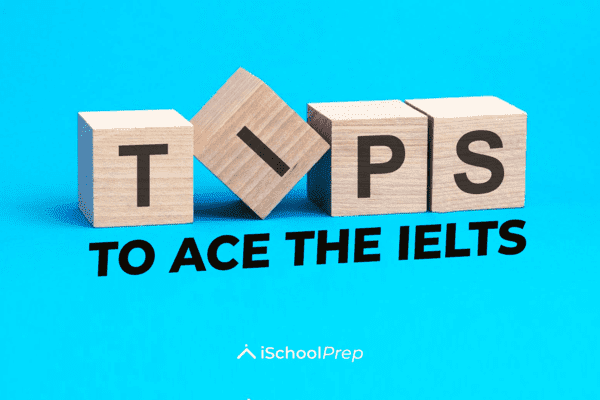
IELTS success| Tips to master each section
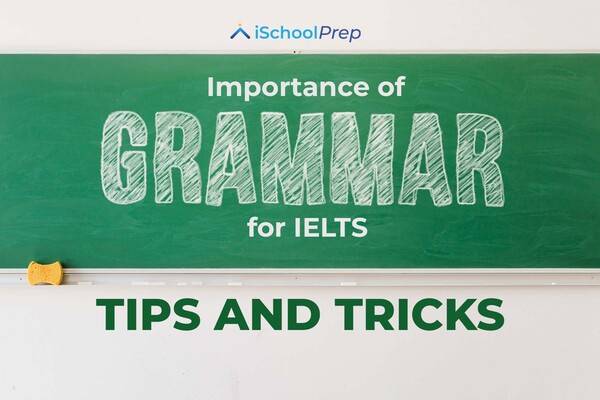
Importance of IELTS grammar | Tips and tricks

TOEFL and IELTS | Role of contextual & academic words
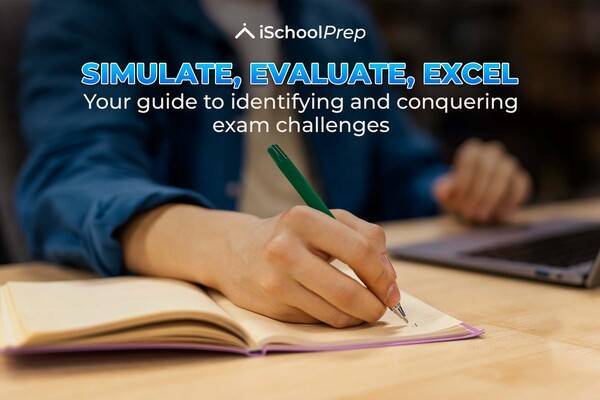
Simulated tests | Opportunity to overcome challenges
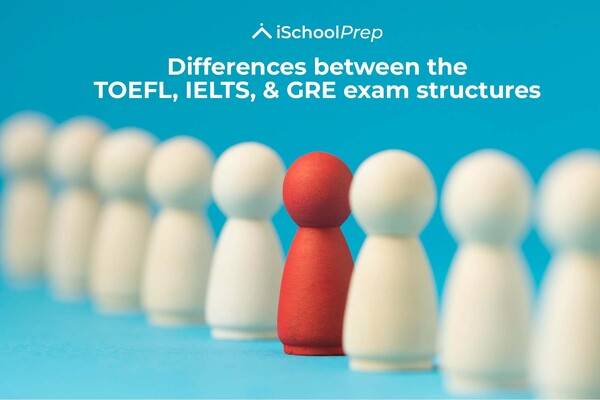
TOEFL, IELTS, & GRE exam structure | Key differences 2024!

Ace the GMAT exam | Navigate quant & verbal difficulties!
Leave a reply cancel reply.
Your email address will not be published. Required fields are marked *
Please enter an answer in digits: seventeen − 10 =
Start your journey with iSchoolPrep
Need help with your Test Preparations? Contact Us for more details
Inquire Now
Get e-books, expert guidance, live classes and more....
English Grammar Here
Essay Connectors in English, Connection Words for Essay

Table of Contents
Essay Connectors
Did you know that there are many linkers and connectors that will allow you to use the English language more powerfully? Today, we will examine linkers with different meanings and give example sentences established with each linker. In this way, we believe that you can use these linkers much more easily in your essay works.
8 Tips On Writing An Effective Essay , Writing Essay Tips
When you use these connectors, which will give the meaning of contrast to the sentence, one half of the sentence and the other half should contain contradictory and unexpected statements. Let’s examine it on the example.
- In spite of : In spite of studied all night, got a very low score on the exam, and did not pass the class.
- Despite : I waited for you all day and I definitely didn’t start eating before you arrived, despite that it was clear that you didn’t care about me.
- However : The tourism industry in this country is developing more each year; However, the current policies of the new government have raised concerns about these tourism revenues.
- Although : Although these days I feel weak when you called me I got up and got ready and came here.
Reason and Cause
When you use essay connectors indicating the reason and cause in a sentence, two different clauses must be related to each other.
- As : I didn’t come with you today, as I had been working hard for my exams for two days and I was tired.
- Because of : Because of the paper he saw, he felt unhappy, weak, and depressed all day. I wish I could help him on this topic.
- Due to Due to his fight with his wife was not performing enough at work and could not show all his skills.
- Since : Since at the end of this year, my overall average is high, I think I will highlight it in internship applications and get what I want.
You can see that purpose connectors are usually used in sentences with an aim theme that contains information about the reason for any action. These have extremely powerful meanings and make your essay richer.
- For : Who do you think I did all this for? Of course, I did it all for you!
- In order to : When I went to the market today, I stopped by the sandwich shop in order to take something to you.
- In order not to : In order not to late this much, I woke up early in the morning and took care of my work while everyone was sleeping.
- So that : I worked all day today so that I don’t have to work tomorrow at all.
- So as to : When I came to class yesterday, I gave my students the essay exam so as to that I could take two exams next week and complete the grading process in a short time.
- So as not to : So as not to fight with my husband, I finished what he said before I got home.
When we are lining up information in a sentence or paragraph or trying to pass an event stream to the reader, we often need to use succession specifiers among the essay connectors. For this, we have the chance to benefit from the following alternatives:
- First of all : First of all, all of these things meant something to me, but it wasn’t enough.
- The next stage : So, the next stage is ready: From now on, he can finish our project without anyone’s help.
- In short : Now you know all of this, in short, you got through your journeyman period and entered the master period.
- In conclusion : When you consider all the above information, in conclusion, the basis of scientific knowledge is always experiments.
Paragraphs that indicate result in any subject can usually indicate cause and effect.
- As a result of As a result of her beauty, everyone at the prom suddenly fell in love with her.
- Therefore : I worked all day today to get your chores done; Therefore, you have no right to be angry with me for coming to this party late.
Related Posts

Detailed Conjunctions List in English

Connectors of Comparison List and Example Sentences

Connectors of Cause and Effect, Connectors Showing Cause & Effect
About the author.
- Phone: +91 8466016171
- Whatsapp: +91 8208375580
- Email: contact@leapscholar.com
IELTS Connectors for Task 1 & Task 2: Linking Words for IELTS Writing 2024
- Updated On April 30, 2024
- Published In IELTS Preparation 💻
The IELTS Exam is a globally acknowledged English language proficiency test widely accepted in many countries, including the USA, UK, Canada, Australia, and others. Every year, over three million people take the IELTS exam, which is growing steadily. It comprises 4 sections-
Table of Contents
The IELTS Writing Test is different for IELTS Academic and I ELTS General . The Academic test will contain topics suitable for anyone entering a university or professional institution. The General Training test will have topics based on general interest.
The Writing test takes 60 minutes , and there are two tasks to complete:
- Task 1 : It is recommended to spend 20 minutes on Task 1 , which requires you to write at least 150 words.
- Task 2 : This task requires at least 250 words and should take about 40 minutes. Task 2 contributes twice as much as Task 1 to your score.
The IELTS writing section is primarily evaluated based on how well the ideas are organised and connected effectively. You must learn and equip yourself with grammatical resources to score well in this section. IELTS essay linking words or connectors are a grammatical resource that shows the IELTS examiner a firm grasp of the language.
In this blog, we will understand more about connectors for Task 1 and Task 2 and how using them appropriately will boost your overall score in your IELTS Writing Test.
Crack IELTS in 4 Weeks! IELTS 8 Band Guarantee

Ace IELTS with Band Guarantee. Get access to Live Classes & 100+ Mock Test. Join Free IELTS Masterclass Now!

Importance of Connectors in IELTS Writing Task
Linking words is a crucial grammatical tool that makes an essay more readable to the examiner. They help in sentence construction and connect two related parts of a text. Linkers can also put forth their opinions comprehensively and display excellent knowledge and a variety of vocabulary.
Here are a few more reasons to use linkers in IELTS:
- They make the paragraph clear.
- They provide a smooth flow to the written piece.
- Help in illustrating how the parts or clauses of a text are connected.
- They add more information to a point.
- They help in expressing opinion or purpose.
- They help in constructing a suitable conclusion.
Using Linking Words in IELTS
You need to know that connecting words cannot be used everywhere. Additionally, linkers for IELTS speaking are used differently from IELTS writing . For example, one can use ‘like’ while speaking. On the other hand, words like at this moment and therefore work well in writing tasks. Also, remember that linkers must come naturally while forming a sentence. Forcing a connector amid a sentence will result in an awkward sentence composition.
Crack IELTS Exam in first attempt

Attend Leap’s free masterclass to get tips, tricks and advance strategies to crack IELTS exam in first attempt

Linking Words For Academic Writing Task 1
In IELTS Academic Writing Task 1, you are generally given visual information. Depending upon the information provided, you must write a report of a minimum of 150 words. IELTS Connectors in Task 1 can be helpful in:
- Outlining transition between the description of one visual to the other.
- Comparing the key features of the graphs.
- Pointing out or highlighting important details of the visuals.
Linking Words For General Writing Task 1
In IELTS General Writing Task 1, you must write a letter responding to a given situation. Linking words for Task 1 is helpful in:
- Introducing the purpose of the letter.
- Organising your ideas coherently.
- Making clear connections between different paragraphs.
- Highlighting important information in the letter.
IELTS Essay Linking Words For Writing Task 2
The second writing task is the same for academic and general; you must write an essay based on a prompt or a statement. Linking words for task 2 are useful in:
- Transitioning between paragraphs.
- Presenting your opinion.
- Give examples and reasons.
- Explain the consequences and/or conditions of various scenarios.
Types of IELTS Connectors for Task 1 and Task 2
Examiners evaluate your tasks by assessing linkers and connectors’ accuracy, range, and flexibility. The following list highlights the category of connectors that can help you secure a good grade in the IELTS writing section:
Adding information
Providing examples, stressing and highlighting, consequences and results, causes and reasons, contrasts and concessions, providing opinion.
Below is a comprehensive list of examples of different categories of connectors that you can use in your sentence construction .
This linker is used to support your major points in the essay. These IELTS essay linking words inform the examiner that additional information is coming up.
Some of them are mentioned below with examples.
- Furthermore – The company has decided to expand its operations to Gujrat. Furthermore , they also plan to increase their marketing efforts in the region.
- Additionally – We have hired a new designer for the project. Additionally , we have also brought in a consultant to provide us with an outside perspective.
- In addition to the regular benefits, employees are also eligible for a performance-based bonus.
- Also – The company is launching a new product line next month. Also , they plan to host a launch event to promote the new products.
- Moreover – The company’s profits have increased significantly this year. Moreover , they have also managed to reduce their operating expenses.
- And – I need to pick up some groceries after work today, and I also need to stop by the post office to mail a package.
- As well as – The project requires a team of developers as well as a team of designers to complete the work on time.
Lists are often used to present pointers in a paragraph. Proper use of listing vocabulary in essays makes it more formal and precise.
Here are a few connectors that you can use to list your paragraph.
- Firstly , I need to wake up early tomorrow to catch my flight.
- Secondly , I have to finish my presentation before the deadline.
- Thirdly , I must buy some groceries on my way home from work.
- Fourthly , I need to call my doctor to schedule an appointment.
- Lastly , I plan to spend the weekend with my family and friends.
Examples are often helpful in providing support to ideas. You must make sure to use a range of linking words to illustrate your arguments through such words.
Here are some examples of connectors for providing examples to your task.
- For instance , many online courses, such as Duolingo and Rosetta Stone, are available for learning a new language.
- For example , there are many different types of music, such as rock, pop, jazz, and classical.
- To cite an example , many people believe that climate change is caused by human activity.
- To illustrate : To illustrate let’s say you are writing an essay about the importance of exercise. You could provide a graph that shows the correlation between exercise and improved health.
- Namely : There are four seasons in a year, namely spring, summer, fall, and winter.
- Such as : Many different types of animals live in the ocean, such as sharks, whales, and dolphins.
- In other words : The government plans to increase the taxes on luxury items. In other words , items considered non-essential and expensive will be taxed more.
It is essential to be clear about the intent of the passage. These IELTS essay linking words help you stress major points so they are not missed:
A few of them are mentioned below with model sentences.
- Specifically : Specifically , we need to increase our response time to customer inquiries to improve our overall customer service.
- Especially : I especially love all fruits, especially strawberries and blueberries.
- In particular : I am interested in learning about the history of art, in particular , the impressionist movement.
- Particularly : I am not fond of spicy food, particularly dishes that use a lot of chilli peppers.
- Obviously , we cannot proceed with the project without proper funding.
- Clearly : The instructions provided in the manual need to be written and can be confusing.
- Of course : Of course , I would be happy to help you with your project.
These connectors are helpful when you need to explain the consequence or result of something.
Below are examples of connectors that can be used to explain consequences and results, with sample sentences demonstrating their usage.
- As a result : He was late to the meeting as a result of heavy traffic.
- Therefore : She didn’t eat any cake, therefore she didn’t gain any weight.
- Thus : The company’s profits increased, and thus, they could expand their business.
- Consequently , The team lost the game, and consequently, they didn’t qualify for the playoffs.
- For this reason , she didn’t want to go on the rollercoaster, so she waited for her friends on the ground.
- So : He forgot his keys at home, so he had to call his wife to bring them to him.
- Hence : The weather was terrible, hence the flight was delayed.
While writing an essay, there may be instances where you would have to provide causes or reasons for a particular statement. These linkers can help do so.
Here are some examples of connectors for causes and reasons for your task.
- Due to : Due to the heavy rainfall, the streets were flooded.
- Because : I couldn’t attend the meeting because I was feeling sick.
- Owing to the staff shortage, the company had to postpone the project deadline.
- As it was raining heavily, we decided to stay indoors and watch a movie.
- Since : Since I am allergic to seafood, I cannot eat sushi.
There is often the need to add opposite ideas to an essay. This is important in discussion essays, where one needs to provide in-depth details.
The below-mentioned linking words will help you when you are going to introduce an opposing point.
- Nevertheless, the weather was terrible, so we decided to picnic.
- However, I studied hard for the exam and didn’t do well.
- Admittedly – Admittedly , I have not been following the news lately.
- Although – Although it was raining, we still went for a walk.
- Even though – Even though she was tired, she continued working on the project.
- Despite the fact that he was sick, he managed to complete his work on time.
- But – She wanted to go to the party but had to finish her work first.
- Still – He failed the test twice, but I would still like to mention that specifically, we need to focus on improving our customer service and not giving up.
These connectors are the most useful in concluding a sentence and lending a final summary of their response.
Some of them are mentioned below.
- To sum up , we have seen that the company’s sales have been steadily increasing over the past year.
- To conclude , based on the evidence presented, it can be said that the defendant is guilty of the crime.
- In conclusion , to improve your overall health, it is recommended that you eat a balanced diet, exercise regularly, and get enough sleep.
You can address their opinion more confidently and concisely using these linkers.
Below is a list of some linking words for providing information.
- I believe that love is the strongest force in the universe.
- I admit that I was not paying attention during the meeting.
- In my opinion , reading is one of the best ways to relax and unwind.
- I think that exercising regularly is important for maintaining good health.
IELTS Linking Words Practice Question
One of the key skills that the test measures is the ability to use a range of linking words or phrases in writing and speaking tasks. Linking words helps to connect ideas and create coherence between sentences, paragraphs, and overall discourse. Some common examples of linking words include, nevertheless, additionally and more. Practising with linking words can help test-takers improve their writing and speaking skills and achieve better scores on the IELTS exam. Here are some linking practice questions for Writing Tasks.
IELTS Linking Words Practice Question for Writing Task 1
Here is a practice task with IELTS writing connectors that will help you understand the usage and importance of connectors in IELTS writing task 1.
These graphs show several key trends. 1. ____, in general terms, more than 70% of the population owned computers in 2000. 2. ____, this figure jumped to around 78% over the coming eight years.
3. ____, these figures varied as per group. 4. ____, service members were always ahead of the general population. Roughly three-quarters of service members owned computers in 2000. That figure jumped massively to reach 80% by 2008. 5. ____ Non-high school finishers began with only a 12% computer ownership rate, which climbed to around 45% in eight years.
- To start with, firstly, first of all
- Nevertheless, however, but
- Nevertheless, on the other hand
- Any example connector can be used here, like, for example, for instance, and except ‘such as’ because this is the start of a sentence.
- Any comparison connector
IELTS Linking Words: Practice Question for Writing Task 2
You can practice IELTS essay linking words through this practice task.
The prompt: Parents must refrain from pressuring their children to pursue a particular career. Young people should be free to choose the professional path that they like. Do you agree or disagree with this sentence?
- _____ Young people must be free to choose, especially in their professional path. Some parents want their children to take up an exciting profession. These wishes are entirely normal and usually not harmful.
- 2. ____ It can be harmful if these desires become strong expectations. 3. _____ freedom to a child does not necessarily mean that the parent needs to be absent. Instead, parents should openly communicate with their children about their career decisions. 4. _____, if one’s dreams do not line up with their parents, they may, 5_____, fear approaching them in fear of judgment.
- Any opinion connector except ‘I agree’ or ‘I concur’ will work here. This is because it is the introductory line.
- Nevertheless, on the other hand, however, but
- Any example connector will fit here except ‘such as’ because this is the starting sentence.
- Accordingly, as a result, consequently, therefore, for that reason, etc.
In summary, using appropriate connectors in IELTS Writing can significantly enhance your essay’s readability and coherence, demonstrating your firm grasp of the language. With the help of the above mentioned categories and examples of linkers, you can effectively connect your ideas and illustrate your arguments comprehensively to score well in the IELTS Writing section.
Remember, practice makes perfect, so practice using these connectors in your essays to succeed in your IELTS exam. Good luck!
Frequently Asked Questions
Q. what factors do examiners consider to evaluate the ielts writing tasks.
A. When evaluating IELTS writing tasks, examiners consider several factors, including lexical resource, task achievement, grammar accuracy and range, coherence and cohesion. Lexical resource refers to your ability to appropriately use a wide range of vocabulary. Task achievement assesses how well you have fulfilled the task’s requirements, including the organisation of ideas and coherence. Grammar accuracy and range assess your use of correct grammar and sentence structures. Coherence and cohesion assess how well you can connect and link ideas within and between paragraphs. These factors are crucial in determining your overall writing score.
Q . What are the main topics for the IELTS essay writing task?
A. Some of the most popular topics for this task are related to academics, such as economics, education, business, family, environment, etc. The essay question in the general IELTS writing section responds to an argument on a general topic of common interest.
Q. What happens if I need to meet the word limit of each section?
A. Writing under the word limit is a penalty, leading to a lower score. You can also be penalised for not using complete, connected sentences. Therefore, you must always adhere to the given word limit and be mindful of each section’s time mandates.
Q. How do you score well in IELTS Writing?
A. To score well in IELTS Writing, you must improve your grammar, vocabulary, and writing skills. Practice writing essays, letters, and reports within the given time limit. Plan your writing and organise your thoughts effectively. Use a range of linking words and phrases to connect your ideas. Finally, proofread your work for any errors or mistakes before submitting it.
Q. What are the types of questions asked in IELTS Writing Task 2?
A. When it comes to writing essays, there are several different types of questions that you might encounter. Some common ones include Advantage/Disadvantage questions, which ask you to weigh the pros and cons of a particular topic or issue. Problem/Cause questions, on the other hand, ask you to analyse and explain the underlying causes of a problem or issue. Opinion essays require you to express your viewpoint on a specific topic and support it with evidence and reasoning. Other essay questions include Compare/Contrast, Discussion/Argumentative, and so on.
Q. Can I retake IELTS writing only?
A. IELTS One Skill Retake is a recently introduced feature that allows you to enhance your scores on a specific skill without retaking the entire IELTS exam. If you wish to improve your performance on any of the four skills – Listening, Reading, Writing, or Speaking – you can redo only that skill. This feature can save you time and money as you won’t need to retake the test.
Q. Is the IELTS Writing Test the same for Academics and General?
A. No, the IELTS Writing Test is different for Academics and General. The Academic Writing Test includes two tasks assessing your ability to describe visual information and write an essay responding to an argument or problem. The General Writing Test consists of two tasks to evaluate your ability to write a letter and an essay on a topic.
Q. What is the duration of the IELTS Writing Test ?
A. The IELTS Writing Test consists of two tasks that must be completed within 60 minutes. Task 1 requires you to summarise, describe or explain a visual representation such as a graph, chart or diagram in 150 words. Task 2 requires you to write an essay responding to a given prompt in 250 words. You should spend approximately 20 minutes on Task 1 and 40 minutes on Task 2.
Q. What are some valuable tips for preparing for the IELTS Writing Test?
A. To prepare for the IELTS Writing test, it is important to practice writing regularly. Familiarise yourself with the test format and timing, and develop your skills in organising and expressing your thoughts clearly and coherently. Pay attention to grammar, spelling, and punctuation, and aim to use a range of vocabulary and sentence structures. Seek feedback from a teacher or tutor to identify areas for improvement and practice writing under test conditions.
Q. What is the importance of using connectors in the IELTS Writing Task?
A. Connectors are crucial in IELTS Writing Tasks as they help connect ideas, create coherence and cohesion, and improve the essay’s overall structure. Using connectors also helps to demonstrate a range of vocabulary and grammatical structures, which is a key criterion for scoring in IELTS Writing.
Q. How can one use linking words in IELTS writing, and what are some examples?
A. Linking words can connect different parts of the essay, such as sentences, paragraphs, and ideas. Examples of linking words include “moreover”, “however”, “in addition”, “on the other hand”, “therefore”, and “consequently”. By using linking words, the writer can create a clear and logical flow of ideas, which helps to improve the coherence and cohesion of the essay.
Know more about IELTS
Get free speaking practice samples.
- Describe a Skill That you can teach other people
- Describe a Place you Visited Where the Air was Polluted
- Describe a Famous Person that you are Interested in
- Describe a Course That You Want to Learn
- Describe a Person who Solved a Problem in Smart Way
- Describe a Prize That You Received
- Describe a Volunteering Experience You Have Had
- Describe a Piece of Good News
- Describe Something you Taught to Your Friend
- Talk About an Interesting Old Person you Met Recently
- Describe a Dinner you Really Enjoyed
- Describe a Story or Novel That Was Interesting to You
- Describe a Time When you Shared Something with Others
- Describe a Toy you Liked in Childhood
- Describe an Interesting Neighbour
- Describe a Competition You Would Like to Take Part In
- Describe an interesting activity that you remember enjoying most in your Primary School
- Describe Your Childhood Friend
- Describe an Object You Find Particularly Beautiful
- Describe a Place Where you are Able to Relax
- Describe a person you know who likes to talk a lot
- Describe a place where you would like to go to relax
- Describe a period when you were busy
- Describe a long-term goal you would like to achieve
- Describe a situation when you helped someone
- Describe a job you would not like to do in the future
- Describe a time when you used a map
- Describe a skill that you learned in your childhood
- Describe an unusual holiday you had
- Describe an exciting activity that you experienced with someone else
- Describe a person who is good at making people feel welcome in his/her home
- Describe A Time You Successfully Did Something Difficult
- Describe Something in Your Country That You Are Interested In
- Describe a Beautiful City
- Describe something you do regularly that helps you work and study better
- Describe a photo that you took and are proud of
- Describe a party that you enjoyed
- Describe a useful object in your home that you can’t live without
- Describe a good advertisement that you think is useful
- Describe an occasion when someone or something made noise
- Describe a sportsperson that you admire
- Describe something that you picked up that was thrown by someone else
- Describe a time that something changed your life in good ways
- Describe a successful person who you once studied or worked with
Get Free Reading Practice Samples
- William henry perkin reading answers
- Why zoos are good reading answers
- Bioluminescence reading answers
- Classifying societies reading answers
- Artificial artists reading answers
- Jargon reading answers
- The Origins of Laughter Reading Answers
- The Innovation of Grocery Stores Reading Answers
- All About the Otter Reading Answers
- The Triune Brain Reading Answers
- Saving the Soil Reading Answers
- Trans Fatty Acids Reading Answers
- A Disaster of Titanic Proportions Reading Answers
- Why Companies Should Welcome Disorder Reading Answers
- Book Review Reading Answers
- Tea Times Reading Answers
- Why are Finland's Schools Successful Reading Answers
- Intelligence and Giftedness Reading Answers
- Animal Minds Parrot Alex Reading Answers
- Crop Growing Skyscrapers Reading Answers
- Secrets of the Swarm Reading Answers
- Walking with Dinosaurs Reading Answers
- The Development of Travel Under the Ocean Reading Answers
- What's so Funny Reading Answers
- The Culture of Chimpanzee Reading Answers
- Clutter Bugs Beware Reading Answer
- Stepwells Reading Answers
- Glaciers Reading Answers
Get Free Writing Practice Samples
- Advantages and Disadvantages Essay with Sample Answers
- Agree and Disagree Essay with Sample Answers
- Problem Solution Essay Topic with Sample Answers
- Every year several languages die out
- Positive or Negative Development Essay with Sample Answers
- Honesty is the best policy essay
- Online shopping essay
- Environment essay topics
- Prevention is better than cure essay
Get Free Listening Practice Samples
- Family excursions listening answers
- Public library listening answers
- Hiring a public room listening answers
- Notes on social programme listening answers
- Accommodation request form listening answers
- Transport survey listening answers
- Mic house agency repairs listening answers
- Holiday rentals listening answer
- Job enquiry listening answers
- Homestay application listening answers
- Library information listening answers
- Free activities in the burnham area listening answers
IELTS Important Information
- IELTS Exam Date
- IELTS Exam Fee
- IELTS Modules
- IELTS Speaking Practice Test
- IELTS Writing Practice Test
- IELTS Reading Practice Test
- IELTS Listening Practice Test
- IELTS Test Centres
- IELTS Results
- Types of IELTS
- IELTS Pattern
- IELTS Exam Eligibilty
- IELTS Slot Booking
- IELTS Band Score
- IELTS Registration
- IELTS Books
- IELTS Preparation
- IELTS Practice Test
- IELTS Speaking Cue Card
- IELTS Speaking Part 1
- IELTS Writing Task 1
- IELTS Writing Task 2
- Task 1 Pie Chart
- Task 1 Table Chart
- Task 1 Bar Graph
- Task 1 Line Graph
- Task 1 Diagram
- IELTS Computer Based Test
- IELTS Paper Based Test
- IELTS One Skill Retake
- IELTS for UKVI
- IELTS Vocabulary
IELTS Test Centre and Dates in India
- IELTS Test Centre and Dates in Hyderabad
- IELTS Test Centre and Dates in Bangalore
- IELTS Test Centre and Dates in Chennai
- IELTS Test Centre and Dates in Amritsar
- IELTS Centre and Dates in Ludhiana
- IELTS Test Centre and Dates in Mumbai
- IELTS Test Centres and Dates in Ahmedabad
- IELTS Centre and Dates in Delhi
- IELTS Test Centres and Dates in Chandigarh
- IELTS Center and Dates in Pune
Manisha Angre
Experienced IELTS prep trainer and education management industry veteran. Specializes in public speaking, international education, market research, mentoring, and management.
Related Posts

A Guide on Most Common English Words Used in Daily Life

Top IELTS Tips and Tricks For Best IELTS Scores 2024

60+ IELTS Essay Topics 2024: IELTS Writing Task 2 Samples & Tips
Trending now.


IMAGES
VIDEO
COMMENTS
Connectors in English link together phrases, sentences and even paragraphs. Read this blog post to learn the most common English connectors, how to use them in any situation and tips for practicing them. ... Write a Short Story or Essay. To see the huge difference English connectors can make, try writing a paragraph without any connectors and ...
Worried that your essay lacks structure and coherence? Perhaps you should use linking words, transition words, or connectors to give it a boost. Linking words join separate sentences to improve writing flow. You can also find them mid-sentence to connect clauses. Read on as I show you the definition and types of linking words in English.
Using a paraphrasing tool for clear writing. With the use of certain tools, you can make your writing clear. One of these tools is a paraphrasing tool. One thing the tool does is help your sentences make more sense. It has different modes where it checks how your text can be improved. For example, automatically adding transition words where needed.
Whether you're writing an essay, giving a presentation, or engaging in a conversation, using appropriate linking words can greatly improve the clarity and effectiveness of your message. In this ultimate list of linking words, we have compiled a comprehensive collection of linking words along with examples to help you understand their usage ...
Linker words, also known as sentence connectors, play a crucial role in connecting phrases, sentences, and paragraphs for enhanced coherence in writing. In terms of contrast, words like "however," "in contrast," and "nevertheless" emphasize opposing ideas.
Types of Connectors and Linkers 🚀 1. Additive Connectors: Used to add information or ideas. Examples: and, in addition, moreover, furthermore 2. Adversative Connectors: Introduce contrast or ...
Effective IELTS Essay Connectors for Writing Task 2 & Task 1 . Download Now . Linking words or connectors are the adverbs that turn out to be the easiest way to connect ideas or sentences with one unique word. Such linking words or connectors make the entire sentence look appealing. In IELTS, if you use the connesctors appropriately, it will ...
The difference between these three connectors lies in their strength. 'In addition' is a neutral connector that you can use to add information. You're not necessarily strengthening an argument. The same goes for 'additionally' and the less frequently used 'Also' and 'Plus'. For example:
For this, you need a good command of connectors, or linkers, those little words and phrases like but, however, in spite of, because of and in order to. In this article we look at using connectors in English to improve your writing skills. The most common connectors, and the ones used most frequently in speech, are and, but, or, because, so and ...
You can use the purpose connectors when you want to express the intention behind an action or decision. Connector. Example. In order to /. So as to. I will study math in order to improve my career. So that /. In order that. You must submit your CV so that you can eventually get a job.
By using connectors, you can make your writing clear and concise. Now that you know all about essay connectors, try using them in your own writing. Practice makes perfect, so keep practicing until using connectors becomes second nature to you. Soon, you'll be writing essays that are clear, concise, and well-organized. Comparison. Equally; As ...
ESSAY WRITING Connectors and useful expressions 1. CONNECTORS What are connectors? Connectors (also called conjunctions) are words or expressions which we use to establish different types of relationships between words or sentences. When we use connectors appropriately, we organise what we say in a more logical, understandable way.
Linking: Cohesion & Coherence Worksheet. This worksheet helps to consolidate what is 'cohesion' with a focus on pronouns, word forms and summary nouns. It also includes a coherence sheet on key connections and two practice activities. Example Level: ***** [B2/C1] / Webpage Link / TEACHER MEMBERSHIP / INSTITUTIONAL MEMBERSHIP.
Start using connectors to give your writing more flow and more style. Different types of connectors are used according to the logical relationship they establish between one sentence and another. Also known as conjunctions, these linkers can express contrast, cause, purpose, consequence, addition, and exemplification.
Coherence. In Style: Lessons in Clarity and Grace, Joseph Williams and Joseph Bizup also write about the importance of coherence.While "cohesion" and "coherence" sound similar, they are two different things. "Cohesion" is about ideas that connect to each other "the way two pieces of a jigsaw puzzle do," whereas "coherence" "is when all the sentences in a piece of writing ...
Essay writing is a vital part of your academic education or a writing career if you choose to go that way. Composing essays is like… 7 min read · Dec 2, 2016
ESSAY CONNECTORS. Nowadays modern technology has totally changed our approach to studying. Experts have put forward many suggestions to address this problem. "Experience is the best teacher" is an old cliché, but I agree with it. The twentieth century has brought with it many advances.
There are a number of connectors in the English Language that can be used to help you show contrast, similarity, outcome, result, sequence and order or relevance or importance, exemplification, emphasis, explanation, dismissal, summarising or concluding, particularising, focusing, timing, and correction. Connectors are especially useful when it ...
The linking words list below is essential for IELTS writing task 2 for high score. The examiner needs to see a range of linking words in your essay to award you a high score for the criterion of Coherence and Cohesion which is 25% of your marks. You will be checked on your range, accuracy and your flexibility of linking words in IELTS writing ...
Read IELTS writing samples and identify the connectors for IELTS used. Analyze how the connectors link ideas and make the writing coherent. Practice writing essays using different types of connectors. Use a variety of connectors to link different ideas and make the writing more interesting.
In this way, we believe that you can use these linkers much more easily in your essay works. 8 Tips On Writing An Effective Essay, Writing Essay Tips. Contrast. When you use these connectors, which will give the meaning of contrast to the sentence, one half of the sentence and the other half should contain contradictory and unexpected statements.
A. Connectors are crucial in IELTS Writing Tasks as they help connect ideas, create coherence and cohesion, and improve the essay's overall structure. Using connectors also helps to demonstrate a range of vocabulary and grammatical structures, which is a key criterion for scoring in IELTS Writing.
In this English lesson, I will help you improve your English writing skills. I will teach you how to use English connectors that are useful in Email writing,...